Star Trek: The Original Series - "Spock's Brain" Episode, Explained
The first episode of the third season of this beloved sci-fi show is widely considered to be one of its worst.
How does one select the worst episode of Star Trek ? There are over 900 entries across almost 50 series to choose from. With numbers like those, there have to be a few missteps. Some might pick the episode of Voyager in which Tom Paris and Captain Janeway become salamanders and spawn children. Others might name the extraordinarily racist TNG entry in which African-themed aliens kidnap Tasha Yar. Those fans that prefer the early terrible episodes can't go wrong with "Spock's Brain."
It's hard to imagine what the creators of early Star Trek would think about the franchise's modern state. The shows spread across mediums, capturing wildly different fan bases and exploring engaging new ideas. Though some corners of the story feel stuck in the past, it would likely shock some old writers to see how far it's all come. It's fair to denigrate the franchise's current state, but it's worth remembering the rough times in the early days.

Star Trek: What is the Highest Starfleet Rank?
What happens in "spock's brain".
"Spock's Brain" kicks off the third season of Star Trek: The Original Series with a bang as the Enterprise stumbles onto an alien ship. Suddenly, a woman from the opposite vessel teleports onto the Enterprise and activates a bracelet that stuns the crew. She selects First Officer Spock and touches his head. When Kirk wakes up, McCoy informs him that Spock is in the sick bay. He explains that the alien lady surgically removed Spock's brain, leaving him on life support. Vulcans can survive without their brain for 24 hours, giving Kirk and the crew a ticking clock to save their science officer. They follow the ship's trail to Sigma Draconis VI, a seemingly pre-industrial planet covered in ice. Their voyage drains sixteen hours, leaving them with only 8 to find Spock's brain.
On Sigma Draconis VI, the Enterprise crew meets the locals. They encounter a group of male humanoids who look like cavemen. They're called Morg. One of them warns them of "the others." Kirk asks him where the women of his species reside, and the Morg becomes confused. Chekov discovers a hidden city beneath the surface of Sigma Draconis VI. McCoy beams down with Spock's brainless body, having fitted him with a remote control to let him walk. They travel underground to meet the Eymorg, the females of the local species. They seem to have child-like intelligence. Kirk establishes contact with Spock's brain through his communicator, but the woman who invaded the Enterprise arrives and knocks out the landing party again. The Eymorg leader, Kara, doesn't understand what a brain is when Kirk demands Spock's back. They learn that Kara and the Eymorg are using Spock's brain as the "controller," a complicated computer rig operating the underground civilization. After the landing party escapes the Eymorg's clutches, they place Kara in a machine called the teacher. Kara threatens Kirk with a phaser as they debate the proper fate of Spock's brain.
How Does "Spock's Brain" End?
"Spock's Brain" raises a new problem. If they don't know how Kara took out Spock's brain, they won't know how to reinstall the organ. The teacher grants the knowledge necessary to operate. Scott pretends to faint, allowing Kirk to take Kara's phaser and turn the tables. McCoy realizes he can use the teacher to learn the steps involved, but it will only provide him knowledge for three hours. He dons the teacher helmet and begins brain surgery. While he's operating, the information slowly slips away from him. He panics, but his internalized medical knowledge allows him to reconnect Spock's speech centers. Spock, still blessed with the nigh-omniscient perspective his position as the controller granted him, talks McCoy through the operation. Spock regains his brain and launches into a long-winded speech about Sigma Draconis VI's history. Kara fears for the Eymors' continued survival without the controller. Kirk reasons that they can leave their underground city and learn to coexist with the men of their species.
"Spock's Brain" is broadly considered one of the worst episodes of Star Trek ever produced. William Shatner and Leonard Nimoy publicly insulted it, expressing embarrassment and frustration with NBC's treatment of the show. It was the first episode released after the network moved Star Trek to a 10 P.M. timeslot, disadvantaging it in ratings. Several outlets rank it among their worst list, either among The Original Series or the franchise as a whole. It's a fair rating. The episode's premise makes no sense, and its execution borders on unhinged nonsense. Some small contingent of fans see "Spock's Brain" as a treasure among "so bad it's good" episodes of the long-running series. At least it's terrible in a fun way. Despite its bizarre take on gender relationships, it isn't particularly offensive. It's like a 50s B-movie played out in the middle of a Star Trek episode. Fans looking for the goofier side of Star Trek need look no further than "Spock's Brain."
Star Trek: Captain Kirk's Redemption of Spock In The Mirror Universe
- Buy the Book…
- Reviews Hub

the m0vie blog

Following Us
- Adding Our RSS Feed to Your Gmail
- Following our Feed in Internet Explorer
- Millennium (Reviews)
- Star Trek: Deep Space Nine (Reviews)
- Star Trek: Enterprise (Reviews)
- Star Trek: The Next Generation (Reviews)
- Star Trek: The Original Series (Reviews)
- Star Trek: Voyager (Reviews)
- The X-Files (Reviews)
- X-Files Fandom Poll Form
Check out the Archives

Awards & Nominations

Star Trek – Spock’s Brain (Review)
This July and August, we’re celebrating the release of Star Trek Beyond by taking a look back at the third season of the original Star Trek . Check back every Monday, Wednesday and Friday for the latest update.
Spock’s Brain is not the worst episode of Star Trek ever produced.
Indeed, Spock’s Brain is not even the worst episode of the third season as a whole. More than that, Spock’s Brain is not even the worst episode of the third season to this point. Spock’s Brain is a pretty bad piece of television, but it seems difficult to argue that the episode is quantifiably worse than Elaan of Troyius , The Paradise Syndrome or And the Children Shall Lead . However, the episode’s reputation looms large in the broader context of the Star Trek canon. Many would point to this as the worst episode that the show ever produced.

“Check out the big brain on Spock!”
To be fair, Star Trek fandom has never been entirely consistent or even-handed when it comes to identifying the worst that the franchise has to offer. This is a fandom that decided that Star Trek Into Darkness was somehow a worse film than Star Trek V: The Final Frontier or Star Trek: Nemesis , and that Threshold was somehow the worst episode of Star Trek: Voyager despite sharing a season with episodes like Tattoo and Alliances . When dealing with consensus fan opinion, it is always interesting to wonder why such things matter over others.
Spock’s Brain is pretty dire. It is sexist, it is ill-judged, it looks cheap, and its underlying premise is beyond absurd. It was also the first episode of the third season to be broadcast. In a way, it seemed like the ultimate affront to fandom. After all, these fans had worked really hard to convince NBC to bring the show back for a third season. Having those same hardcore fans tune into the new time slot to catch Spock’s Brain must have seemed like the ultimate insult, a hokey sci-fi b-movie premise executed on a tiny budget from a show that normally did much better.

The brains of the operation.
There is an element of nostalgia to this reading of Star Trek . The franchise has always had a goofy side, even beyond the necessity for science-bending budget-saving plot devices like warp drive or the transporter. The franchise has a long history of misunderstanding the concept of evolution (see Genesis , Threshold or Dear Doctor ) or embracing Erich von Däniken (see Return to Tomorrow , The Paradise Syndrome or The Chase ). Star Trek has always run on ridiculous ideas, opening with a story about how voyaging outside the universe turns a person into a god.
Indeed, goofiness is part of the joy of Star Trek , from the giant green space hand in Who Mourns for Adonais? through to the pleasures of space! Lincoln in The Savage Curtain . More than that, the goofiness can even lead to truly spectacular episodes and stories in its own right, as with the weird space! amoeba in The Immunity Syndrome or the “planet of the gangsters” in A Piece of the Action . (Similarly, the “planet of the Romans” in Bread and Circuses and “planet of the Nazis” in Patterns of Force are also underrated episodes.)

Okay, Kirk. It’s not THAT painful.
It is perhaps a combination of factors that accounts for the hatred directed at Spock’s Brain . It is not just the goofy premise, because there have been goofier premises before. It is not just the sexism, because there has been more overt sexism before and there is more overt sexism to follow. It is not just the bad script, because there have been terrible scripts before. It is not just the cheapness of the episode, because the show’s ambition always outstripped its production budget.
It is a combination of these factors, culminating in the decision that Spock’s Brain should be the show to open the third season of Star Trek on television. This is the stalking horse for the disjointed and uneven third season, and it seems like it is the first show caught in the cross-hairs.

Matters come to a head.
It is hard to overstate just how disillusioned everybody was with the third season of Star Trek . After all, the fans and production team had fought spectacularly hard to revive the season. NBC would have been happy to cancel it at the end of the second season, but a series of public protests and a massive letter-writing campaign helped to keep the show on the air. Spock’s Brain was supposed to be a moment of triumph for the fandom. It was an episode that would not exist but for the efforts of fans like Bjo Trimble.
However, the third season did not mark a triumphant return for the series. The third season did not find Star Trek ascendant. “I remember my sister and I being disappointed with the third season,” confessed future Star Trek: The Next Generation writer and Star Trek: Deep Space Nine showrunner Ira Steven Behr. He elaborated, “Like most fans, I was disappointed with season three.” It was not just fans or future production team members. Leonard Nimoy reflected, “The third season was very weak in general, but it was especially not good for Spock.”

Leonard Nimoy had a fairly extreme reaction.
Interviewed for These Are the Voyages , veteran production designer and long-term fan Doug Drexler perfectly encapsulated the sense of betrayal embodied by Spock’s Brain as the third season premiere:
I was crushed by Spock’s Brain when I saw it. I couldn’t believe this was my show. What the hell had happened? It was painful, because it felt like certain death. I could feel a difference in the show instantly. There was a quality about it that almost seemed by rote. It seemed by-the-numbers , and it didn’t have the same kind of complexity. Besides that, there was a different feel to the show as far as look. It seemed kind of cold. The episode just seemed almost silly immediately. With lines like “His brain is missing, Jim”, it just didn’t have the same sophisticated quality of the first two years. Many years later I took Spock’s Brain and put a laugh track on it. And it actually made it work. It really was remarkable because the laugh track just made it seem intentionally funny.
Drexler hits at a number of the core issues with Spock’s Brain , and some of the issues that differentiate it from the other spectacular glaring failures of the early third season.

“Was he dead?” “He was worse than dead.” “What do you mean?” “Jim.” “Come on, Bones. What’s the mystery?” “His brain is gone.” “His what?” “It’s been removed surgically.”
The most damning criticism that fans throw at Spock’s Brain is the suggestion that the episode is effectively making a mockery of Star Trek with its stilted dialogue, its ridiculous premise, its repeated use of the words “Spock’s brain.” There is a sense that Star Trek is meant to be “serious business” , and that the fans accept this at face value. By unapologetically running with such a goofy concept and by embraced the pulpy absurdity of the story, it almost feels like fandom treats Spock’s Brain as a tacit betrayal of the series.
This sense of betrayal is reflected in a number of popular rumours that circulated about the episode in the years following its original broadcast. Drexler alludes to one such rumour when he talks about putting a laugh track on the episode. For a long time, there were rumours that Spock’s Brain had been written as a comedy episode, but that either the comedy didn’t land or the production team simply did not “get” that this was too ridiculous to play straight. After all, a live reading of the script was very successfully staged as a comedy show in 2004 .

“Spock’s body is more dependent on that tremendous brain for life support.” “Then we’ll take him with us.” “Take him? Take him where?” “In search of his brain, Doctor.”
However, there is no indication that the episode was ever explicitly intended as a comedy. The always insightful Michael Kmet argued that the production team never treated it as such :
Except for a comedic scene between Kirk, Spock, and McCoy at the very end, the rest of this outline for Spock’s Brain remains as serious as the above teaser. When Stanley Robertson, NBC’s program manager for Star Trek, was sent this outline, he made several suggestions. In an April 25, 1968 letter sent to Fred Freiberger, Robertson asked the producer to “give further consideration to the addition of more personal jeopardy to our regular cast of heroes than is intimated here.” Notably absent from this two page letter is any hint that the episode was intended as a comedy. Given the consistently serious tone of each of these behind-the-scenes documents, and the completed episode itself, there’s little doubt in my mind that Spock’s Brain was conceived from start to finish as a dramatic episode, not a comedy.
Kmet makes a very valid argument. After all, “aliens steal a vital organ from Spock, forcing Kirk to engage in a deadly race against time to save him” hardly promises the amusement of I, Mudd or The Trouble with Tribbles .

“Jim, where are you going to look? In this whole galaxy, where are you going to look for Spock’s brain? How are you going to find it?”
At the same time, there is something knowingly retrograde about Spock’s Brain . While a lot of the aesthetic of Star Trek can be found in fifties atomic era science-fiction and horror, most notably Forbidden Planet , there was generally a sense that the series was pushing past these trappings. Star Trek might have its roots in fifties pulpy science-fiction, but it gave those elements a twist for Kennedy’s “new frontier.” The show was very much anchored in a contemporary style of science-fiction.
In many ways, Spock’s Brain harks back to a pulpier old-fashioned style of science-fiction. The image of Spock as a lumbering automaton recalls the cinematic language of the classic Universal Frankenstein films; Spock might not have neck bolts or walk with his arms stretched out, but the recurring image of a braindead body on the slab while McCoy discusses (and later attempts to reattach) his missing brain feels very much in step with the “body-snatching mad scientist” as embodied by Victor Frankenstein.

“Doctor McCoy has lost the surgical knowledge he obtained from the teacher. He has been drawing on his own skills and surgical techniques in an attempt to continue the operation, but he is faltering and uncertain. In a desperate hope that he can draw on Spock’s brain for assistance, I instructed Doctor McCoy to give priority to connecting Spock’s vocal chords.”
The fixation up the eponymous cranial organ harks back to pulpy fifties sci-fi delights like Donovon’s Brain , The Creature with the Atom Brain , The Brain from Planet Arous or The Brain Eaters . In contrast, the only notable sixties science-fiction film with “brain” in the title was 1962’s The Brain that Wouldn’t Die . Indeed, the theme of brain-stealing and body-swapping arguably resonated more strongly with the cultural context of the sixties, McCarthy era paranoia about enemy agents exerting unnatural influence on American bodies.
Of course, Spock’s Brain engages with an even older science-fiction stories and tropes. For the first (but not the last) time this season, the influence of H.G. Wells is keenly felt upon Star Trek . Visiting Sigma Draconis VI , Kirk discovers a world divided between the primitive Morgs who dwell on the surface and the Eymorgs who live lives of relative luxury beneath the surface of the planet. This division owes an obvious debt to The Time Machine , with even the names seeming familiar. The Morgs evoke the Morlocks; the Eymorgs evoke the Elai.

“Who are the Others?” “Givers of pain and delight.” “Do they live here with you?” “No. They come. They give pain and delight.”
This touchstone is important. Although science-fiction can trace its roots back to antiquity, H.G. Wells is one of the defining architects of its modern iteration. In Billion Year Spree , Brian Aldriss argued that “Wells is the Prospero of all the brave new worlds of the mind, and the Shakespeare of science fiction.” If that is an exaggeration, it is only a minor one. With that in mind, The Time Machine is an especially formative text; originally serialised in The New Review , the story was later published as Wells’ first novel.
All of this serves to make Spock’s Brain feel like something a throwback, a feeling reinforced by various production decisions. The platen surface of Sigma Draconis VI looks very much like a sound stage, the limitations in the show’s production budget beginning to show. Spock’s Brain has none of the imagination of Spectre of the Gun . Similarly, the costuming of the Morgs look like something from a fifties b-movie. More than that, the sequence in which Kirk and his crew are attacked by the Morgs feels clumsy and stagey.

Hail to a classic.
With all of this in mind, it is easy to understand why certain people might choose to interpret Spock’s Brain as a grotesque parody of Star Trek . As quoted in The Fifty Year Mission , David Gerrold offered his own take:
I suspect that Spock’s Brain was Gene L. Coon’s way of thumbing his nose at Roddenberry or something. If not Roddenberry, he was thumbing his nose at how seriously the show was taking itself. … Gene L. Coon had that kind of sense of humour to do that kind of impish stuff. He had an irreverent sense of humour, and I think he wanted to poke Star Trek because someone was taking it too seriously. Maybe it was his way of not buying into it.
Gerrold would certainly have insight; he had worked with Coon on comedy episodes like I, Mudd or The Trouble with Tribbles . While Coon could write comedy that went for broad laughs, he was also fond of cheeky deconstruction.

Green screen effects.
In particular, Coon would frequently deflate some of the show’s more self-serious touches. Most obviously, Coon refused to buy into the idea of the Federation as a utopia. Coon tended to suggest that Kirk was uncertain and even ambiguous. In Errand of Mercy , Kirk and the Federation are just as complicit in the escalation of tensions as the Klingons. In The Trouble with Tribbles , the best laid plans of the Federation and the Klingons are thrown asunder by a few hungry furballs.
Coon was fond of writing stuffy Federation bureaucrats. Ambassador Fox seemed to set a template for generations of these characters in A Taste of Armageddon . Under-Secretary Nilz Baris is treated as a joke in The Trouble with Tibbles ; just look at that combination of title and name. Kirk finds himself tasked with caring for another such character in Metamorphosis , and the episode ends with Kirk insisting that personal happiness is far more important than the demands of a large bureaucratic organisation.

“Thank you, Mister Chekov. That is a very impressive power point presentation.”
There are even shades of that to be found in Spock’s Brain . As Spock lies dying in Sick Bay, Kirk frets about what to do. There are apparently three planets that might possibly house the character’s brain, but there is not enough time to investigate all of them. Rather than making a command decision off-screen, Spock’s Brain treats the viewer to an extended briefing in which Chekov and Sulu each outline a case (with nifty graphics) for one of the planets. It is very much a scene from a particularly dull Friday afternoon at the office, not a high-stakes rescue mission.
Watching Spock’s Brain play out, it is entirely possible that Coon was being a little cheeky. However, if that is the case, it seems like Coon was in on the joke. More than that, it feels like an especially mean-spirited joke. Coon was a professional television writer who cared enough about Star Trek to commit to writing three scripts for the third season under the alias Lee Cronin while also serving as producer on It Takes a Thief . It seems slightly counter-productive to spend one of those scripts turning Star Trek into a mean parody of itself without telling anybody.

Sensor detect a stinker, sir.
More than that, there is a clear sense that the production team were actually proud of Spock’s Brain , regardless of the backlash that followed. After all, production teams generally have a reasonable appreciation of the quality of their output. Most television producers will accept that there will be a few stinkers in a given season of twenty-odd episodes . In most cases, the production team will tend to schedule around the stinkers, burying the worst episodes later in the run so that they can make a good impression from the outset.
Spock’s Brain is not buried in the run. The episode is not tucked away, out of sight, in the middle of the third season where it might be forgotten. Instead, the production team decided that Spock’s Brain would make for the perfect season premiere. It would be the episode that open the season, brought forward from its position as sixth in the production order to first in broadcast order. It was not simply that the production team failed to appreciate the monstrosity they had created; the creative staff were actually proud of Spock’s Brain .

Stars in their eyes.
As goofy as the premise might seem, there is a sense that Spock’s Brain was supposed to be an important episode. Sure, the idea of a sexy alien space babe stealing Spock’s brain to power a super computer in a gender-driven riff on The Time Machine seems ridiculous on the face of it, but the episode was dealing with what was essentially a very hot topic in the context of late 1968. Organ transplants might be taken for granted in this day-and-age, but they were still a novelty in the late sixties.
The first heart transplant took place in December 1967 . Lewis Washkansky was a grocery dying from chronic heart disease. He underwent the procedure at Groote Schuur Hospital in Cape Town, under the knife of Christiaan Barnard. Washkansky would die eighteen days later, contracting pneumonia as a result of the drugs that were suppressing his immune system. Advances in medical science would see heart transplantation become a more accepted surgical procedure in the decades that followed .

Surgical precision.
The first human heart transplant was a big deal. It held the world’s attention for weeks on end. When Lewis Washkansky passed away, the Daily Mail would publish an editorial that provided a sense of scale:
The past 18 days have seen an unusual succession of big news stories. Among them the big freeze, the go-slows, foot and mouth, a toppled throne, a drowned Prime Minister and an acute government crisis. But one story above all has appealed to the deepest emotions of men and women everywhere. It is that of Louis Washkansky, the man with the transplanted heart.
While organ transplantation is something that modern audiences take for granted, it was something truly alien for those following the news at the time. It was like science-fiction come to life.

Organ failure.
Against that backdrop, the weird retro brain-harvesting of Spock’s Brain makes a great deal more sense. As surreal as the premise might seem to modern audiences, Spock’s Brain is essentially a science-fiction horror story about organ transplantation. In fact, the episode could be seen as an early example of the classic “kidney story” , the urban legend in which young tourists are targeted by organ harvesters. It is a wonder that Spock is found in Sick Bay rather than in a bath tub full of ice.
It should be noted that the fanciful science-fiction premise of the episode becomes slightly more feasible with each passing year. Neuroscientists remain optimistic that it may be possible to one day transplant human brains . Scientists estimate that a head (or full body) transplant may be only two years away . China has taken the lead on this, announcing its own plans to pioneer head transplant surgery . All of this serves to make Spock’s Brain only slightly less crazy, and to suggest just what the production team saw in it.

Bush whacked.
In many ways, this is perfect fodder for a Star Trek episode. After all, Spock’s Brain taps into other sixties social anxieties particularly those concerning automation. The move away from manual labour towards automation was a recurring concern on the show, as exemplified by the stories dealing with crazed computers like The Ultimate Computer . In Spock’s Brain , the title character is literally transformed into a computer, into something monstrous and grotesque, but perhaps more efficient and logical.
As in episodes like The Return of the Archons or The Apple , Spock’s Brain suggests that a society dependent upon a computer is portrayed as stagnant and inhuman. The Eymorgs are pampered and spoiled, rendered completely dependent upon machines. Their luxurious existence comes only at the price of their souls. The complex and highly-adaptive computer system has provided for their material needs, but at a steep cost; the loss of independence, the death of their resourcefulness. Even love is a foreign concept.

Duck and cover.
Spock’s Brain reflects contemporary uncertainties about a society that was moving towards a more automated computer-driven future. As Brenda Gardenour contends in The Compassionate Country Doctor and Cold-Blooded Biomedicine , the episode’s wedding of the organic and the inorganic offers expression to one of the show’s recurring motifs:
Expressing the concerns of many mid-twentieth-century Americans, Bones questions the dynamic relationship between the traditional practice of medicine, which is focused on caring for the whole person, and biomedical research, which disregards the individual human being in order to examine his or her molecular, chemical, and genetic mechanisms. For Bones, the greatest struggle lies between those who believe that science exists for the benefit of humankind, a powerful tool to improve the quality of human life, and those who believer that humankind serves the master scientific progress, a higher good that must be perpetuated at all costs.
The surgical removal of Spock’s brain and the decision to graft it into the Eymorg infrastructure is a very literal embodiment of that conflict. Spock might be described as a living computer, but Spock’s Brain renders the metaphor liberal. Spock’s live is of secondary good to the concerns of the Eymorg’s automated infrastructure. In some ways, Spock’s Brain is a very typical Star Trek episode.

Medical marvels.
After all, not just any episode gets to be the season premiere. The production team carefully weigh the episodes available to them, and pick the one that best reflects the show going forward. It is likely to be an episode intended to reassure existing fans and court new viewers. Amok Time fulfilled that purpose quite gracefully at the start of the second season. Spock’s Brain was clearly intended to do something similar at the start of the third season. This was supposed to be a marque episode.
Why Spock’s Brain ? Why not The Enterprise Incident or Spectre of the Gun ? In this case, Amok Time provides a fairly handy clue. On paper, it would seem that Spock’s Brain was the safest choice for a season premiere because it was the episode most keenly focused on the character of Spock. Spock was, after all, the breakout character on the show. He was earning more fan mail than Kirk and had evolved into the show’s unlikely sex symbol. Spock’s Brain is the only episode to this point exclusively focused on Spock. Tellingly, The Enterprise Incident would follow next.

And the actors shall lead.
Indeed, Spock’s high profile caused considerable tension on the set of the show. Freiberger quickly found himself caught up in the middle of the contest between William Shatner and Leonard Nimoy, as Robert Justman and Herb Solow relate in Inside Star Trek :
Nimoy’s constant demand for scripts with a more involved Spock – and a Spock who maintained his original character values – and Shatner’s insistence that he was still the star of the series put unusual pressures on Freiberger. In his desire to solve the problem, Star Trek’s new producer, frustrated and fed up with the bickering, arranged a meeting with the players: Shatner, Nimoy, and Roddenberry. Freiberger held the meeting in Roddenberry’s old office, where he explained the complex nature of the situation, something that Roddenberry had been well aware of for at least two years. Freiberger then proceeded to confess that those pressures were preventing him from properly performing his role as the series’s producer. Shatner and Nimoy hung on his every word. “Gee, I’m sorry to hear that, Fred, “ said Roddenberry. “I hope you get it straightened out real soon.” Roddenberry stood. “Well, I have to go now.” As Roddenberry started to leave his old office, Freiberger stopped him and asked the million-dollar question: “Gene, please tell me. Who’s the star of the series? Is it Bill – or is it Leonard?” Both actors leaned forward eagerly. Roddenberry became quiet. He grabbed a cigarette, lit it quickly, inhaled deeply, and stared wide-eyed into the space above him. “Ahh… I see,” he mused. He looked out the window, shock his head in Buddha-like fashion, but said nothing else. He looked at neither Bill nor Leonard. Perhaps he was hoping they would jump into the conversation and solve the matter, actor to actor. They did not… Roddenberry walked toward the door to leave, but turned and stared, angrily, at Freiberger. Roddenberry was sweating. “It’s Bill. Bill is the star of the series.” Roddenberry left immediately, and a smiling Shatner and a sullen Nimoy returned to the set.
These were the kind of pressures taking place behind the scenes during the show’s third season. Although Shatner and Nimoy would later reconcile, the two would drift apart again in their later years . Shatner and Nimoy were not talking when Nimoy passed away .

“Bones, you couldn’t make him voice-activated, no?”
In some respects, Spock’s Brain could be seen as an attempt to effectively “split the difference” between the show’s two de facto leads. Spock is very much the central character, the one who drives the plot. However, Kirk is cast in the role of hero, with William Shatner afforded central stage to play Kirk’s emotional response to the tragedy. Indeed, it seems like Spock’s Brain tries a little too hard to balance both leads. The episode is padded out with a lot of unnecessary Kirk-centric scenes in which the words “Spock’s brain” are repeated all too often.
As the first episode of the third season, Spock’s Brain carries a lot of symbolic weight. It was the show that sets the tone for the year ahead, it is the show that tells the audience what they can can expect from the series going forth. As such, it makes sense that Spock’s Brain would leave such a lasting negative impression upon fandom. Spock’s Brain came to be the standard bearer of many of the faults with the third season as a whole, even if it was not necessarily the most egregious example of any of them.

“Bring him along.” “Keep him close to the right.” It’s like backing up the family car.
There is even a joke to be made about how thematically appropriate the episode was, given how NBC had treated Star Trek . In Up Till Now , William Shatner makes such an observation:
No one in our universe was going to stay home Friday night to watch television. Our audience was out on Friday nights. Not home, no esta en la casa, gone, away. Those people who would be home weren’t going to be watching science fiction. Even then NBC reduced our budget, paying $15,000 less per episode than it had during our first season. That meant that we could no longer film on location, we couldn’t pay guest stars, and one of every four shows had to be done entirely on the Enterprise. Our first show that third season might have been a tribute to the NBC executives who so mishandled this show: it was about a society in desperate need of a brain.
Again, there’s the notion of Spock’s Brain as a joke; a wry, mean-spirited, passive-aggressive joke. That seems to be the default narrative that has developed around the episode.

There had to be better ways to convince viewers to tune in.
At the same time, Spock’s Brain hits upon a number of recurring third season anxieties. The dead and sterile society of Sigma Draconis VI plays into the funereal tone of the third season of a whole. It is not quite as effective as the ghost town and death sentence from Spectre of the Gun or the dead bodies at the start of And the Children Shall Lead , but there is a sense that the Enterprise is drifting through a universe that is slowly burning out. It is similar to the tone of certain early first and late second season episodes, albeit a little more morbid.
Of course, thematically appropriate content aside, Spock’s Brain is still a terrible episode. Quite frankly, the dialogue is awful. There are any number of possible reasons for this, of course. Coon was undoubtedly under tremendous time pressure owing to his commitments to It Takes a Thief . The departure of D.C. Fontana meant that Star Trek lacked a script editor who might tighten the draft. The result is a a script that feels very much like a first draft, full of repetition and padding, inelegant and clumsy.

“Do they come for your women as well?” That is a really specifically creepy follow-up question.
The characters frequently recycle dialogue in a way that makes them seem stupid. The Morg interrogated by Kirk identifies “givers of pain and delight.” Elaborating further on the point, he states, “They give pain and delight.” Other dialogue is shaped awkwardly to further plot exposition. “They are here,” the Morg warns Kirk. “You will see. The others will come for you. They come for all like us.” Kirk follows up by asking, “Do they come for your women as well?” In context, it sets up the reveal that the Eymorg are female. But it is also a really creepy follow-up question.
There are moments when the episode’s heightened style almost works. There is something at once ridiculous and horrifying about the way that William Shatner and DeForrest Kelley play the sequence in which Kirk discovers the particulars of Spock’s condition. “You’ve got him on complete life support,” Kirk observes. “Was he dead?” McCoy solemnly responds, “He was worse than dead.” Kirk has little patience. “Come on, Bones. What’s the mystery?” McCoy just says it. “His brain is gone.” It is ridiculous, but Shatner and Kelley do their best.

Belting out the classics.
Unfortunately, Spock’s Brain is undercut by a heavy layer of casual sexism. The Eymorgs are a race of women seeking a man to show them how to live; whether the brain stolen from Spock, the masculinity of James Tiberius Kirk, or reconciliation with the males on the surface. At the same time, the script contrasts their lack of intelligence with their beauty. “I’m sure you noticed the delight aspect of this place,” McCoy observes. “Yes, I certainly did notice those delightful aspects,” Kirk confesses. “But that too was strictly under command of the women.”
The Eymorg are casually described as children; the stunted development of the Morg seems of little note. “Jim, it’s no use,” McCoy urges Kirk at one point. “You’ll get nothing out of that one. Hers is the mind of a child.” Scott insists, “Those women could never have set up anything as complex as this has to be. Why, that takes engineering genius. But there’s no sign of engineering genius in any of those women.” To be fair, this is not the first time that Kirk has come face to face with a society of primitives unable to cope with the advanced technology around them.

Kirk knows best.
However, this is the first time that the society has been comprised exclusively as women. There was also something deeply uncomfortable about Kirk’s paternalistic attitude towards the inhabitants of Gamma Trianguli VI in The Apple or Omega IV in The Omega Glory . However, it becomes even more uncomfortable when Kirk is lecturing a hyper-advanced community of women about how best to run their world. “You won’t be destroyed. You’ll be without your Controller for the first time, but you’ll be much better off, I think.”
Following on from And the Children Shall Lead , there is a sense that Spock’s Brain is just a little reactionary in its politics. And the Children Shall Lead felt like a repudiation of the youth movements of the late sixties, reflecting the anxieties of a social establishment wary of hippies and yippies. With that in mind, there are shades of a similar anxieties bubbling beneath the surface of Spock’s Brain , particularly with Kirk and his crew stumbling upon a society run by women that desperately needs a male brain to run it.

“Did you know that fire was invented by a little old lady from Leningrad?”
The premise feels a like a throwback to the kind of trashy and lurid adolescent fantasies which drove fifties b-movies like Queen of Outer Space and Fire Maidens from Outer Space , and which Futurama so ruthlessly parodied with Amazon Women in the Mood . In a way, this fits with the generally regressive tone of Spock’s Brain . The episode feels very much like the kind of cheesy sci-fi b-movie that an audience member might find skipping idly through the airwaves in the wee hours of the morning.
However, there is more to it than that. There is a definite sense that the Eymorg culture in Spock’s Brain is more than simply a retro affectation. Although it would be easy to read too much into what is a clumsy and messy episode, Spock’s Brain fits with the reactionary tone of the season around it. Against the backdrop of the end of the sixties, this pulp science-fiction throwback might be read as a pointed swipe at second-wave feminism. Although second-wave feminism continued long into the seventies , many would trace the origins of the movement to 1963 .

“The patriarchy’s not so bad.”
As such, second wave feminism is part of the same cultural context as the youth movement, existing as part of the sixties counterculture that rebelled so strongly against the status quo in the hopes of building a better and more idealised world. The third season of Star Trek aired between 1968 and 1969, just as the sixties were coming to an end. The season occasionally gets caught up in the resurgent conservative tone of the ear. Spock’s Brain reads as a rejection of sixties feminism, much like And the Children Shall Lead and The Way to Eden reject the youth movement.
This leaves aside all manner of logical questions underpinning the plot. What drew the Eymorgs to Spock? Is Spock renowned across the galaxy for his big brain? Was Spock’s big brain picked up using advanced scanning equipment? Did the Eymorgs just target the first ship they found? More than that, how long have the Morgs and Eymorgs been like that? How to the species reproduce? The Morgs and Eymorgs seem almost unaware that they are the same species, and there are no Eymorg children visible.

Waist not want not.
There is also the simple fact that Spock’s Brain looks very cheap. The budget for the third season of Star Trek was cut dramatically, which is obvious in a number of respects. Most obviously, there are more bottle shows like Elaan of Troyius and Is There in Truth No Beauty? There is much less location work, with only The Paradise Syndrome and All Our Yesterdays filmed outside a studio. Episodes like Spectre of the Gun managed to make their budget constraints work for the story, cleverly integrating them into the plot. Spock’s Brain is not so lucky.
Spock’s Brain looks very much like an episode of early sixties Doctor Who , albeit shot in colour rather than black-and-white. The studio set is unconvincing. The camera work is static. There is little attempt to disguise the budget limitations. There is nothing exciting about the sequence in which the away team is menaced by the Morgs. The point at which Kirk discovers that a cave is actually an elevator captures no sense of scale or adventure. It feels like a bunch of actors playing make-believe.
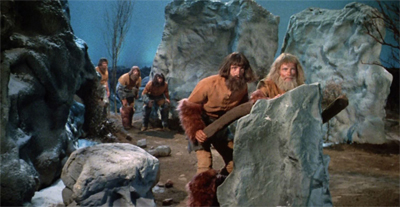
“Be vewy quiet… we’re hunting stawship captains.”
To be fair to veteran Star Trek director Marc Daniels, this was not entirely within his power. As Daniel told Starlog , he did not enjoy the strongest relationship with producer Fred Freiberger:
“Fred Freiberger, the new producer, and I didn’t agree on what the director’s role was,” Daniels reveals. “There are many writer/producers who don’t consider the director a partner. They consider him, shall we say, an employee. This is particularly true in episodic TV. They just want you to do the work, get the shots and forget the rest of it. I didn’t particularly care for that kind of thinking.”
Spock’s Brain would be the last episode of Star Trek directed by Daniel, who had helmed fourteen episodes across the show’s first two seasons. Spock’s Brain looks and feels very much like a rush job.
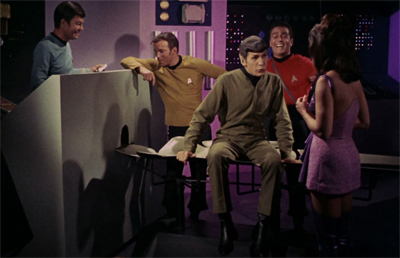
“We should do the megahappy ending.”
Spock’s Brain is not the worst episode of Star Trek ever produced. It is not even the worst episode of the third season. However, it is a damning season premiere, one that serves as a reminder that the show is not what it once had been. Then again, maybe it is actually a reasonable season premiere. It is certainly representative. Spock’s Brain embodies many of the flaws that haunt the third season. It may not be the worst example of any of those flaws, but place a lot of them out front.
In that respect, at least, it is a more honest season premiere than Spectre of the Gun .
Share this:
Filed under: The Original Series | Tagged: camp , feminism , Gene L. Coon , organ transplant , sixties , spock's brain , star trek |
10 Responses
I’m surprised you didn’t mention the most ridiculous part in which Spock helps McCoy make the brain surgery successful. For me, that was the most ludicrous part.
Yep. There was just too much.
Although at points I just quote dialogue from the episode in captions for the pictures. I think I referenced it there.
What annoys me most about this episode is not the sexism or the cheapness or anything like that, it is that brain surgery scene at the end.
I’m a huge Dr. McCoy fan (the banter between Bones and Spock was a real highlight of the new film for me,) so it really irritates me that the good doctor apparently can’t perform surgery without instructions from his patient. I know Spock was the breakout character but after an entire plot about how amazing Spock’s brain is poor McCoy couldn’t be the hero for a scene?
Ha! You and William agree on that point, it seems. By that point, I think I was just rolling with it.
Thanks for your thoughtful review of this episode. I’ve long thought that this episode is FAR from the worst TOS episode. Oh, heaven knows it’s not GOOD, but it does have a certain goofy charm, which episodes like “And the Children Shall Lead” don’t have.
I thought Leonard Nimoy was genuinely chilling every time the camera gave us a close-up of his face. Spock’s face with nobody home behind his eyes … it’s actually a pretty scary sight (and actually helps to show just how much Nimoy was doing as Spock during all the other episodes).
I love the context you gave us for the episode, with the information about organ transplants. I hadn’t connected that up before, that the first heart transplant had just occurred the year before, and knowing that makes the choice to tell this story so much more understandable.
I also don’t think the premise is as absurd as most people do. I mean SPOCK’S brain … that’s gotta be kinda like Einstein’s brain, right? His brain is an unusually good one; it’s kind of surprising that there weren’t people trying to steal the damned thing every week. 🙂
I always figured that it was NBC who decided to broadcast this first, not the production team. NBC understood very little about Star Trek, but they did understand that Spock was popular, and this episode had his name in the title, so broadcasting it first must have seemed like an obvious choice.
According to These Are the Voyages , they did consider making this episode a comedy and re-wrote it as such, but then they decided that it didn’t work that well and went back to taking it seriously. The James Blish short story for this episode is taken from that intentionally comedic version, which explains why it has lines that Spock would never actually say in a non-comedic episode, like the one about Vulcans getting their babies via mail order.
Anyway, thanks again for your thoughtful reviews; I love how much insight you give me, even into episodes that I’ve seen many times.
Thanks for the kind words, Cory!
I don’t know about the reordering. Isn’t there some sense that the production team were quite happy with the episode… right until it aired?
Spock’s brain is not sexist. It shows what would happen if feminism is not terminated after all difficult jobs are replaced by machines and all external threats are removed. But again anything that shows the truth about women is sexist these days.
Imagine hating women so much that you though Spock’s Brain was a good episode of Star Trek.
I can understand why someone might feel Spock’s Brain is the worst episode of Star Trek. I have no idea how anybody can not enjoy watching it (okay, except the sexism). The whole episode is just hilarious nonsense from the beginning to the end, especially DeForrest Kelly still giving his heart into it. The way he says the you know what line is reminiscent of the same dramatic weight the teen actor gave to his admiration for the Power Glove in The Wizard.
Yep, it’s not even the worst episode of the season. Or this half of the season. It’s not good, by any stretch, but it’s far from the worst sin ever committed.
Leave a comment Cancel reply
This site uses Akismet to reduce spam. Learn how your comment data is processed .
Recent Posts
- 375. Monsters, Inc. – Ani-May 2024 (#200)
- 373. Pirates of the Caribbean: The Curse of the Black Pearl (#225)
- 371. Poor Things (#246)
- 370. Dune: Part Two (#12)
- 369. Memento (#57)
Recently tweeted…
- "I Simply Am Not There": The Existential Horror of Eighties Excess in "American Psycho"...
- Star Trek: Deep Space Nine - Necessary Evil (Review)
- Star Trek: The Original Series (Reviews)
- X-Men: Fatal Attractions (Review/Retrospective)
Available at…

Blogs Well Worth Your Time
- 1001 Must See Films
- Andrew at the Movies
- Anomalous Material
- Cut the Crap Movie Reviews
- Encore Entertainment
- Fandango Groovers
- FlixChatter
- Four of Them
- It Rains… You get Wet…
- Jameson Cult Film Blog
- Jar Watches Films
- Let's Go To The Movies
- M. Carter at the Movies
- Marshall and the Movies
- Movie News First
- Musings from a Man Lost in La Mancha
- Never Mind Pop Film
- Paragraph Film Reviews
- Roger Ebert's Journal
- Ross v. Ross
- Scannain.com
- Screenwriter (Donald Clarke, Irish Times)
- Strange Culture
- The Film Cynics
- The Pompous Film Snob
- The Projection Booth
- Things That Don't Suck
- Too Busy Thinking About My Comics
- Undy a Hundy
Film Nerd Resources
- CinemaBlend (News)
- Internet Movie Database
- Rope of Silicon
- The Guardian Film Blog
- James Berardinelli
- Roger Ebert
Email Subscription
Enter your email address to follow this blog and receive notifications of new posts by email.
Email Address:
Sign me up!
Blog at WordPress.com. WP Designer.
- Already have a WordPress.com account? Log in now.
- Subscribe Subscribed
- Copy shortlink
- Report this content
- View post in Reader
- Manage subscriptions
- Collapse this bar
Holosuite Media

5. Brain and Brain, What is Brain?
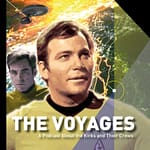
Hosts: Aly Black, Mike Burse, & Kris Hill
Editor: Mike Burse
Episode Music: “The Voyages” written, performed, and produced by Christopher D. Littlefield (c) 2020 [email protected] All Rights Reserved
STAR TREK, and all related marks, logos and characters are owned by CBS Studios Inc. The Voyages, Holosuite Media, the website, the promotion thereof and/or any exhibition of material created by The Voyages, Holosuite Media, or The Voyages team are not endorsed or sponsored by or affiliated with CBS/Paramount Pictures or the STAR TREK franchise.
This podcast is a fan production. All views made are that of the individual(s), and may not represent that of The Voyages or the Holosuite Media network.
Podcast: Play in new window | Download
Star Trek Head
to upload to Tenor
Upload your own GIFs
- More to Explore
- Series & Movies
Published May 3, 2024
RECAP | Star Trek: Discovery 506 - 'Whistlespeak'
A body in motion remains in motion.
SPOILER WARNING: This article contains story details and plot points for Star Trek: Discovery.

StarTrek.com
Previously, Dr. Hugh Culber confides in Sylvia Tilly that his experiences on Trill, inhabited by Jinaal Bix , along with their quest to find the thing that created them has been weighing heavily on him. Plus, Paul Stamets hates the unknown; they've always sought out answers together, but he doesn't know how to talk to his partner about any of this. Meanwhile, Adira feels immense guilt for bringing the time bug aboard the ship and trapping the ship in a time loop.
Following her run in with Moll and L'ak on the I.S.S. Enterprise ; Captain Michael Burnham secures the next clue, while L'ak made a bad call and ends up severely wounded. With the clue in Discovery 's possession, Stamets begins running a full chemical analysis of the vial found within the clue.
In Episode 6 of Star Trek: Discovery , " Whistlespeak ," while undercover in a pre-warp society, Captain Burnham is forced to consider breaking the Prime Directive when a local tradition threatens Tilly’s life. Meanwhile, Culber tries to connect with Stamets, and Adira steps up when Rayner assigns them a position on the bridge.

- Paul Stamets
- Sylvia Tilly
- Michael Burnham
- Dr. Hugh Culber
- Dr. Mikaela Suãrez (Culber's abuela)
- Cleveland "Book" Booker
- William Christopher

- U.S.S. Discovery -A
- Halem'no

A polychromatic glow envelops the U.S.S. Discovery -A's Engineering section as Commander Paul Stamets places the vial retrieved from the I.S.S. Enterprise into the scanner for analysis. He is joined by Captain Michael Burnham and Lieutenant Sylvia Tilly, and they all remain frustrated that the clue has stalled them for two days. A hundred other tests have already yielded the same result — the vial's composition is generic and the water inside is pure, inert, distilled… and wet. Burnham notes a scratch on the container and wonders if the damage might indicate that a piece is missing. The modified spectral analysis is completed, but Tilly dejectedly announces that the fluid still reads as distilled water.
The room's illumination is raised to normal levels as the captain begins to pace around the sample. The other clues had words and symbols, yet Stamets assures her that his review of scans from the Enterprise did not reveal signs that anything else was ever affixed to the vial. An attempt to fabricate the map's final two pieces also failed, so solving this clue is the key to finding the next two and reaching the Progenitors' power. Burnham suggests they pivot from chemistry and try history and anthropology — planets where distilled water had cultural or symbolic significance 800 years ago, as well as worlds with severe droughts that would have required rainwater alternatives.
Captain Burnham beams out of Engineering for a scheduled meetup with Dr. Kovich in the sterile confines of the Infinity Room. She assumes he brought her here because there is a new lead on Moll and L'ak, but Kovich sits at a desk and informs her that the U.S.S. Locherer is handling the search. Finding the Progenitors' tech is the Discovery 's mission, and Kovich appears dissatisfied with their lack of progress in tackling the most recent clue. The scientists who hid the technology's location each made their own piece of the clue trail in secret, so Kovich proposes that each individual likely employed their own expertise in the process. He slaps a 20th Century legal pad on the table, having demonstrated his resourcefulness by recovering the scientists' names. The eccentric man tears off a sheet of paper — genuine, not replicated — and hands it over to the captain.
In his office aboard Discovery , Dr. Hugh Culber converses in Spanish with a holographic representation of his abuela . He requests the recipe for their mofongo so he can make it for Paul, but his abuela laughs off the notion. The dish they made was inedible. When Culber would fall asleep, she would throw out their concoction and replicate the food instead. He asks Zora to pause the program and send a message to Dr. Pollard; they might be onto something with this grief alleviation therapeutic, as the brainwave patterning is incredible and the holo of his grandmother is exactly as he remembers her.
Culber's joyful expression fades to uncertainty, and he has Zora restart the program. He mentions his experience with the Trill zhian’tara to her and underscores an indescribable feeling that has emerged in its aftermath. She cradles his face with her hands but cannot help him understand it. They had often spoken about her spiritual practices, so her inability to answer confuses Culber. His abuela speaks up, clarifying that she trained him to be a doctor — a man of science. She questions how he can consider the soul when he has not examined the body, and Culber's features light up with inspiration and comprehension.
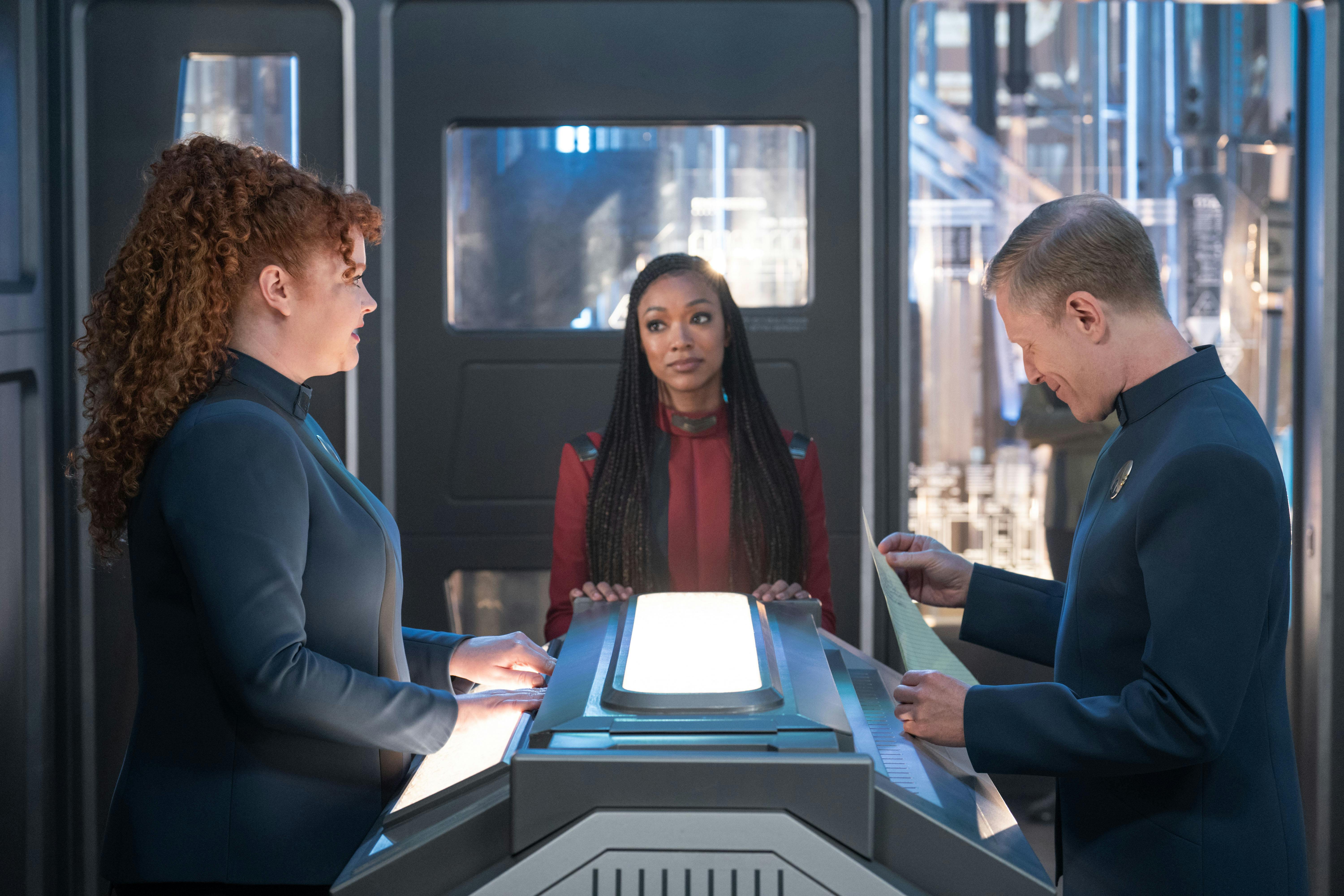
"Whistlespeak"
Captain Burnham presents Kovich's list of the scientists' identities and homeworlds to Tilly and Stamets in Engineering. Three names are crossed off — Vellek of Romulus , Jinaal Bix of Trill , and the Terran defector Carmen Cho — leaving Marina Derex of Betazed and Hitoroshi Kreel of Denobula. Burnham bets that the vial is related to Dr. Kreel, whose specialty was designing weather modification towers to generate rain. Denobulan weather towers seed clouds with silver iodide, but the vial's water is free of contaminants. Kreel also did work for other worlds, and especially arid planets would need to extract water from the air at a molecular level. Zora relays that there were 15 M-class worlds on Denobulan trade routes in Kreel's lifetime, but only one — Halem'no — had needed to harvest water in that way. The breakthrough earns a smile from the captain.
Discovery jumps into orbit around Halem'no, where a lush green region stands out from the rest of the planet's bare surface. Long-range scans show a Denobulan weather tower that manufactures rain and emits a low-grade force field to shield the lone habitable region from dust storms. On the Bridge, Commander Rayner is curious as to why Kreel would make such a tower look like a mountain, so the captain turns to Ensign Adira Tal at their science station. Nervous to be assigned to such a prestigious duty, Adira reports that pre-warp and pre-industrial humanoids inhabit the protected area. Given the lack of an electrical grid and surveys which show the storms have increased in severity over the years, they posit that Kreel hid the tower so as not to violate the Prime Directive.
Burnham and Rayner are pleased by Adira's response, and the first officer tells the captain that he honored the ensign's request for more time on the Bridge because he felt they were ready. Adira isn't so sure, but Rayner declares that there's no time like the present. Burnham emphasizes the need to abide by the Prime Directive and conceal their technological capabilities from the locals. An unusual energy field around the tower prevents beaming in or scanning for the next clue, so Burnham states that she'll head to the surface with Tilly while Rayner commands the ship.
A soothing whistle fills Discovery ’s Science Lab, where the captain researches the "whistlespeak" component of the Halem’nite language. Tilly enters, and both officers are now dressed in attire that will allow them to fit in on the planet. Zora can convert the whistlespeak into Federation Standard, but the Halem'nites don't always whistle. They have a phonetic language for day-to-day interactions, but the whistlespeak lets them communicate across great distances. The ability to learn about a society by how its individuals speak sparks enthusiasm from the captain’s inner xenoanthropologist. The Halem'nites don't have any terms to denote societal status or class, but they do recognize three distinct gender identities and prize connection with one another. Amazement washes over her and evokes memories of her time in Dr. T’Prasi's xenolinguistics seminar on Vulcan.
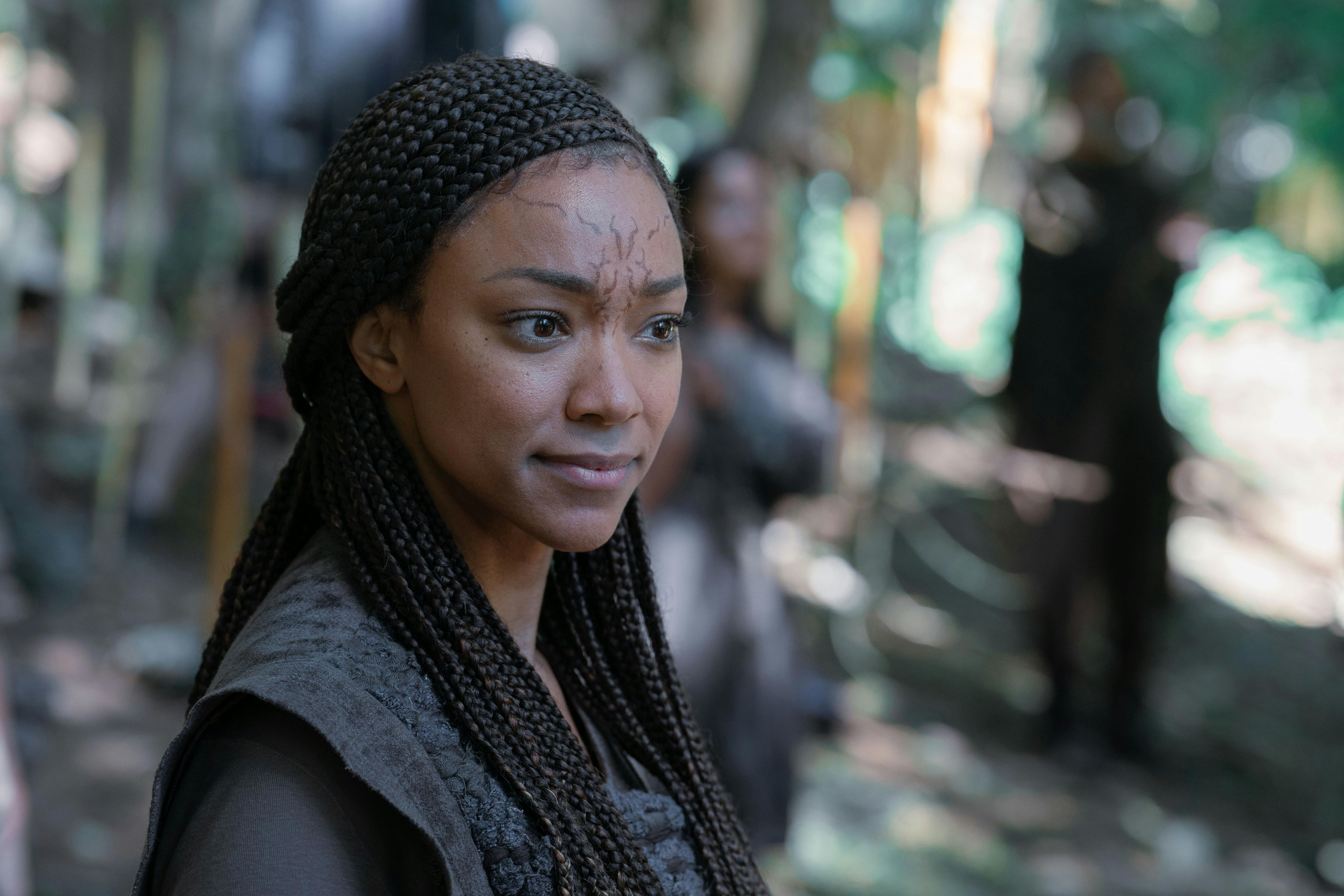
Tilly is thrilled by Burnham;s happiness and comments that they could really use her at Starfleet Academy. The captain asks her friend how things are going there, but their chat is postponed by an update from Rayner. Subcutaneous comms have been loaded into the transport system, and Ensign Tal has included Starfleet's latest retinal tricorder mod. Burnham thanks the commander and beams down alongside Tilly. They materialize in a quiet forest under the cover of night and marvel at the size of the tower constructed by Kreel, which the locals refer to as the High Summit and visit in an effort to commune with their gods.
The two officers begin walking to their destination, and Michael revisits the chat about Starfleet Academy. Tilly just received a message from Cadet Ross, one of her students who had served drinks at the Millennium Celebration. Ross is considering leaving the Academy to accept a position on a cargo vessel, so she wanted Tilly's advice on the matter. Aware that Ross isn't the first cadet to be confronted with this dilemma, the lieutenant is unsure how to respond. Tilly voices her concern that the Academy isn't providing what the cadets need, but she turns her attention to the sound of whistlespeak resonating through the woods. The universal translator deciphers the exchange — travelers from the dust storms are being greeted with hospitality in the direction of Burnham and Tilly's destination.
Back on Discovery , Cleveland "Book" Booker catches up with Dr. Culber in a corridor and expresses his desire to contact the ship's counselor on the Locherer . While Book wants to brief them on Moll and L'ak's full background, Culber insists he must accept there's nothing for him to do right now. The doctor urges Book to focus on something that will allow him to recharge himself, and the former courier playfully ponders whether Culber ever gets tired of having all the answers.
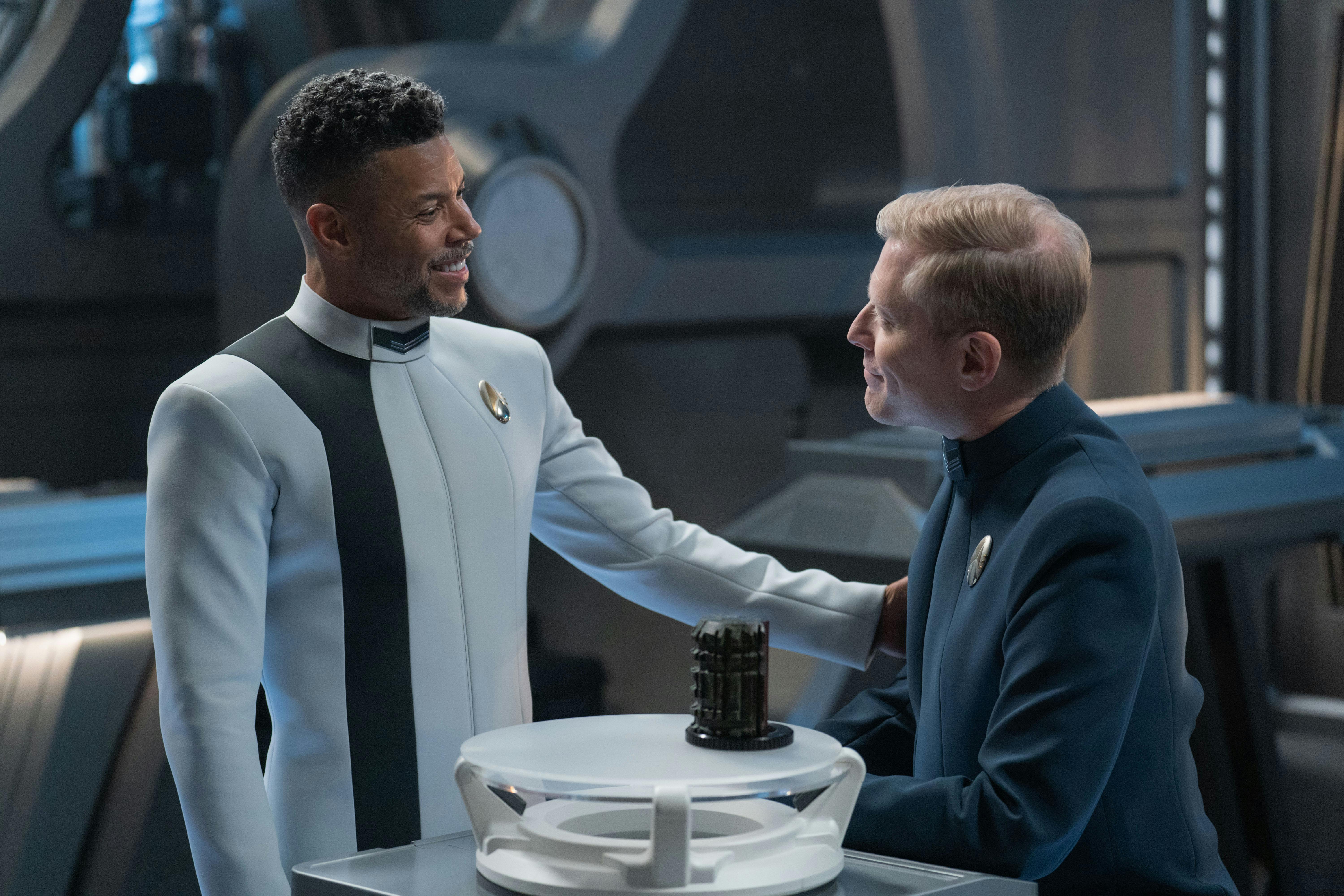
Culber continues to Engineering, where he discovers Stamets toying with the three interlocking clues that have already been recovered. He consults his partner about his desire to do a full neural scan on himself, a revelation which instantly generates a worried look on Paul's face. Culber guarantees that everything is fine and he merely wishes to collect data on the neurological aftereffects of zhian’tara . Stamets realizes Hugh's interest likely stems from real-world symptoms, and the doctor reluctantly confesses that aftereffects might be present. Optimistic about the opportunity to work together — "nothing as romantic as a neural scan" — they express their love through a kiss and resolve to get to work in the morning.
On the surface below, Burnham and Tilly introduce themselves to the group of compeers they had heard from afar. They're greeted warmly, though an elder compeer, Anorah, suffers from a severe cough caused by a dust storm in the drylands. Those gathered proceed toward the High Summit and listen as the elder shares her selfless story of risking time in the storms so that another would not have to take her place. A lengthy drought has been upon them, but the elder points out that only the chosen devout may enter the High Summit's temple to pray for rain. The captain claims that she has come from the east and lived too far away to have witnessed the Summit before.
A friendly voice calls out to the travelers, and a young compeer named Ravah approaches them bearing a smile and holding a lantern. As they welcome the group, their cordiality transforms into concern for the elder, who has begun coughing once again. They head to the healing grove and rest the elder on a wooden bed, but her medicine is nowhere to be found. Alone for the moment, Burnham and Tilly quietly analyze the situation — a sonic percussion wave would easily dislodge the dust in the elder's lungs, but breaking the Prime Directive is not an option. They roll their patient onto her side and administer compressions to her back.
Ravah's father rushes over, and Ravah distributes metal bowls to everyone present. They form a tight circle around the elder and use pestle-like tools on the dishes to generate a high-pitched sound wave. The vibrations rattle nearby surfaces and permit Anorah to cough up dust, but their power overwhelms the captain and renders her unconscious. Burnham awakes a short time later on a bed of her own, pleased to see that the elder has survived. Ravah's father is seated by her side and apologizes for not warning her about the intensity of the sound cure.
Tilly and Ravah join them, and the young compeer shares that their father Ohvahz — the Priest of the Summit — brought them to this settlement after their mother died. They are eager to take their turn and clear dust on the frontlines, though their father is less enthusiastic about the prospect. He is perplexed by Burnham's desire to enter the temple and proclaims that she does not need to do so in order to give thanks to the gods. Ravah eagerly chimes in, stating that one can get in by completing the Journey of the Mother Compeer — a grueling race and test of devotion which makes the gods happy. Only the victor is worthy of going inside the temple and asking for the gods' blessing. To the priest's chagrin, Burnham makes a formal request to partake in the Journey.
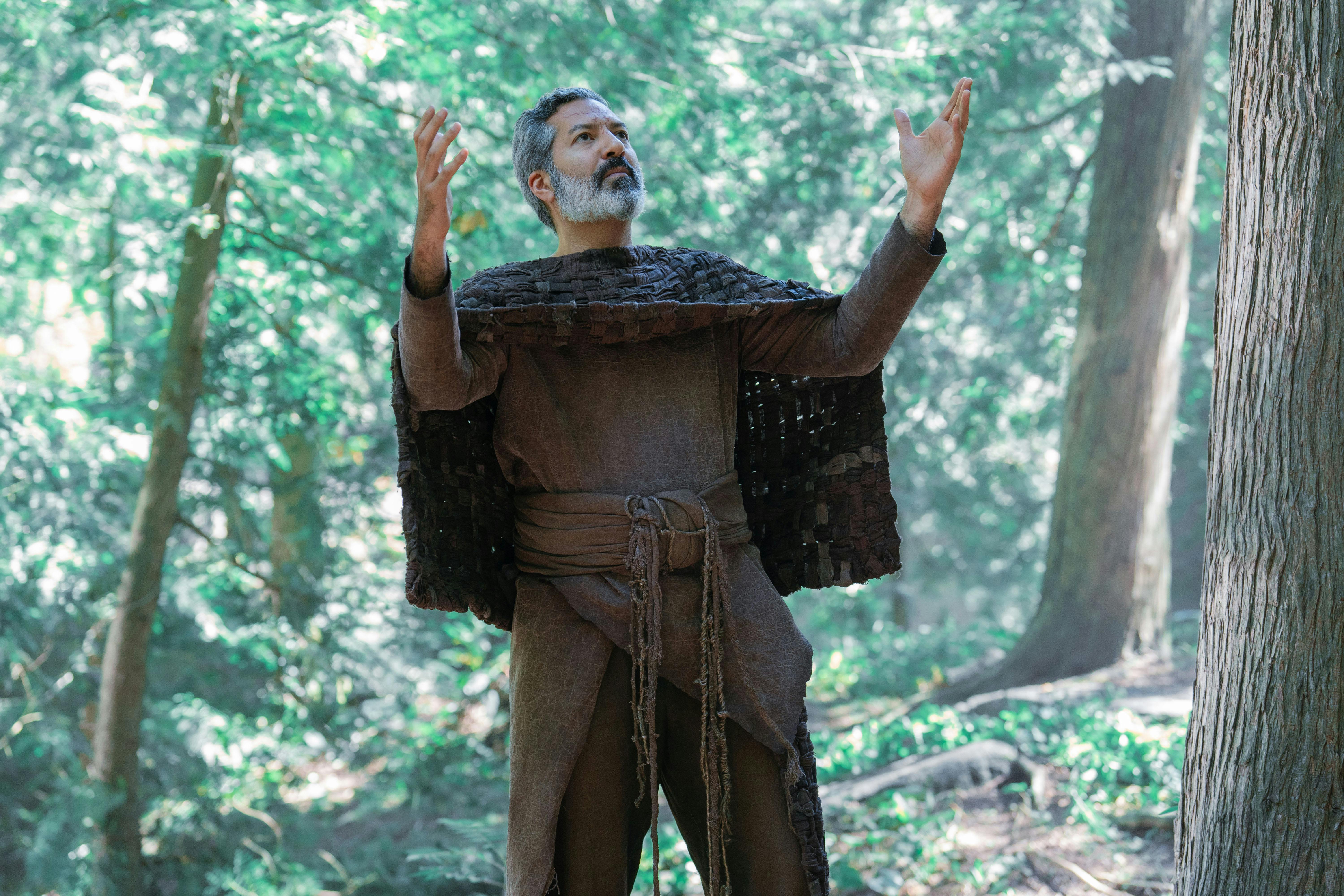
The next morning, numerous participants assemble at the base of the Summit. The atmosphere is festive, and Ravah lightheartedly teases that they are destined to win the race. Their father is clearly concerned about their decision to partake in the event, arguing that they are too young to take the journey. Ravah wears their mother's bracelet in the hopes that she will watch over them, but the priest remains distressed. Tilly steps forward, noting that Ravah's voracity is reminiscent of one of her students "back east." As a teacher, it can be difficult to step back, and she can't imagine how arduous it would be as a parent. Ravah heeds the advice and admires their father, but wants to show him that they can be great too.
Burnham approaches and asks to speak to Tilly for a moment, and the two officers move away to discreetly communicate with Discovery 's Bridge. Rayner gives the stage to Adira, whose scans led them to believe that Halem'no might have had other weather towers in the past. A team of DOTs scoured the surface and located four more towers — over time, their energy distribution matrices fell out of alignment. The High Summit is experiencing the same effect, and that failure is producing the energy field surrounding the tower. Finding the auxiliary control panel would allow them to correct the problem by resetting the components. If they don't fix the technology, those living near the High Summit will perish — just as the settlements surrounding the other towers had. Burnham resigns herself to the truth that one mission has become two.
In Discovery 's Sickbay, Culber sits up on a biobed as Stamets divulges that no biological, chemical, or genetic anomalies appear in the doctor's brain scan. The astromycologist quips that his partner has a perfectly typical, healthy, and — glimpsing the holo of Culber's results — rather handsome human brain. No lasting neurological effects of the zhian'tara are detected, yet Hugh is disappointed that the scans have not provided a physiological cause for what he's feeling. Ever since Trill, he has felt more connected and attuned to something greater than himself. Paul reasons that it's a spiritual quandary, and the doctor nods. Stamets looks on the bright side by highlighting Culber's health and suggests he just enjoy the sensation. He pronounces that the human brain is one of the most complex things in the known universe and places a reassuring hand on the doctor's arm.
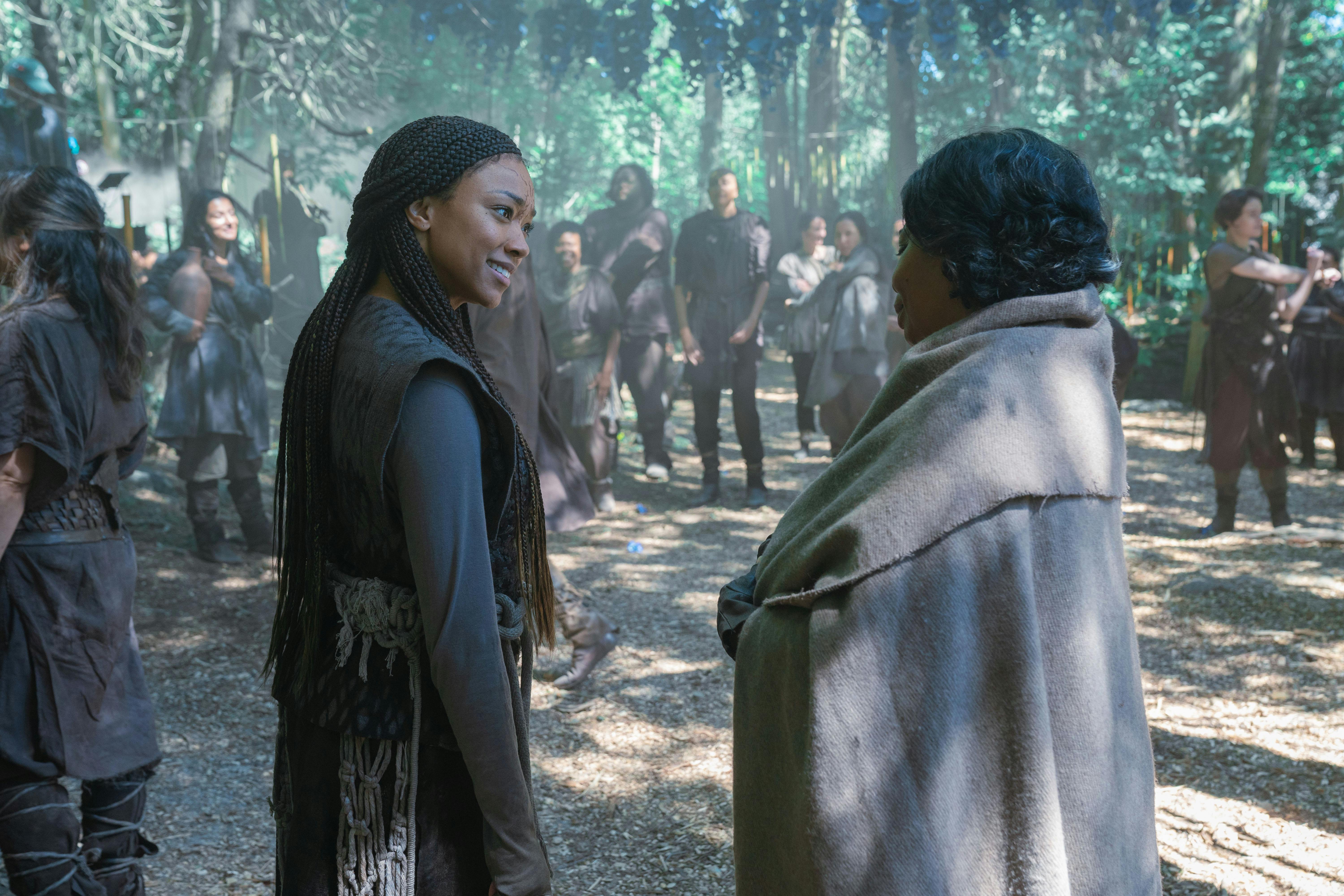
On Halem'no, Captain Burnham approaches Anorah who she helped save the previous night. Unlike those excited by the prospect of the race, this compeer reflects on the journey she and her friend Vohrahli had participated in during their youth. Vohrahli won, but the compeer wonders what it’d be like if she and her friend could be wrinkled old elders together. She shares a laugh with Burnham then observes that one doesn't need to go to the High Summit to be with the gods — they are with them when they do good for each other, just as Burnham saved her — though she accepts Burnham's determination to run.
The captain makes her way over to Tilly at the starting line, and the priest regales the runners with the legend of the Mother Compeer as they are each given a cube to consume. In ancient times, warring Halem'nites lost the favor of the gods and were punished with the dust storms. The Great Mother Compeer rescued her people from thirst by showing the gods the Halem'nites' true selves and venturing out into the storms to find water — as he speaks, several competitors begin coughing and grasping at their throats. The Mother Compeer's lungs filled with dust on her journey home, but she resisted the urge to drink, saved the precious liquid for her children, and died in the process. The gods were so moved that they brought back the rains.
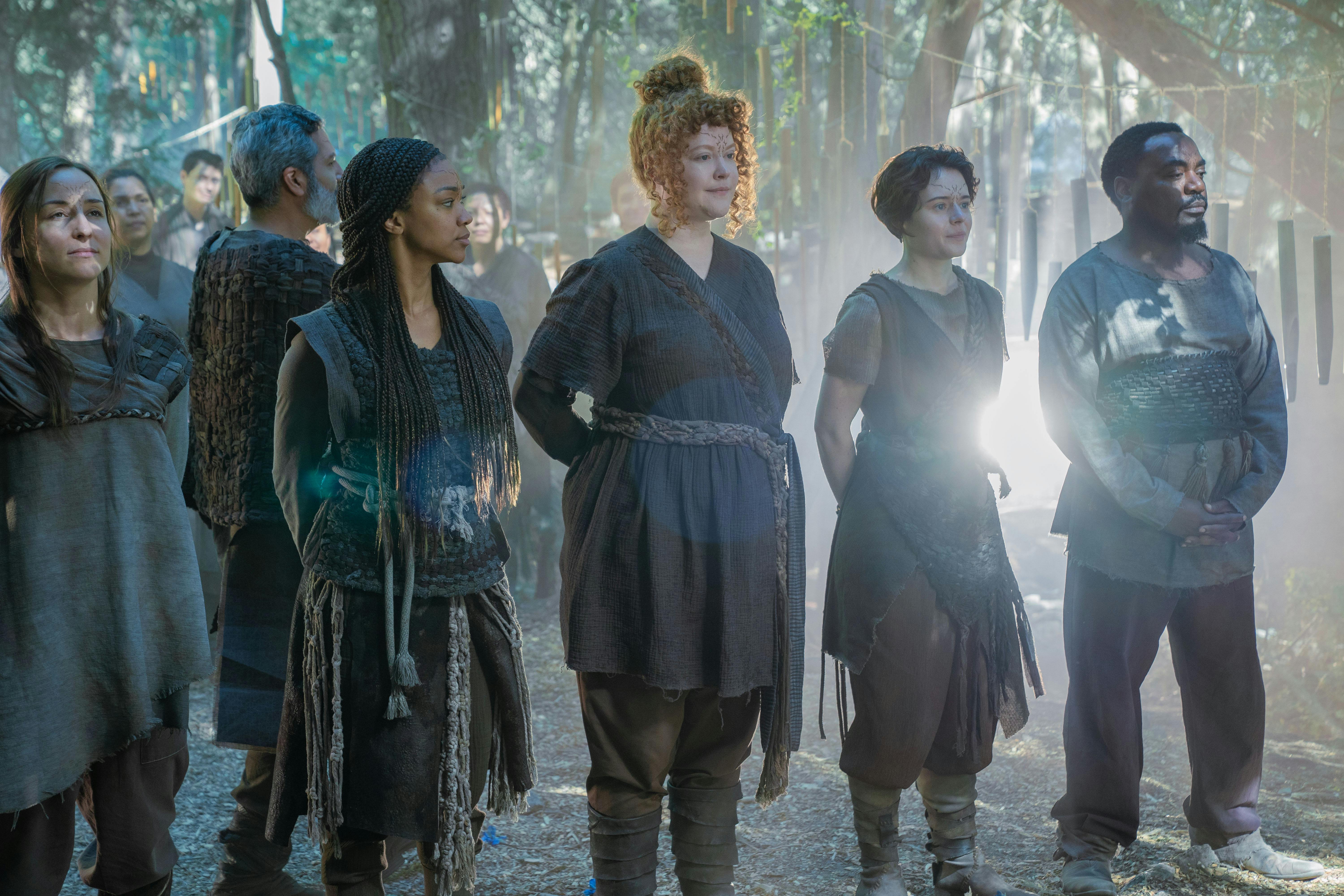
The cube's deleterious effects take hold of Burnham and Tilly, a dry cough and terrible thirst manifesting as compeers fill bowls of temptingly refreshing water on pedestals. The Journey replicates the trial the Mother Compeer endured in a bid to earn the gods' merciful rain. Two compeers can't bear their discomfort any longer and drink from the nearby bowls. Ravah taunts their friends, and the two Starfleet officers take off as the competition begins. The runners jog through the Summit's trails, and several are disqualified when they imbibe from the water dishes they pass along their route.
Slightly winded, Captain Burnham pauses to rest as Tilly circles around her. They press forward, but Michael notices some of the blue moss on the side of the trail has turned yellow. Aware that such a genetic mutation could be caused by radiation leaking out of the tower's malfunctioning control panel, Burnham expects the path of yellow moss to guide her to the controls. In case she's wrong, Tilly — the Queen of Endurance — will stay in the race. The lieutenant is emboldened by the mantra "a body in motion remains in motion," while the captain refreshes herself on the nearest bowl of water.
Further up the Summit, Tilly's exhaustion almost leads to her collapse, but Ravah hurries back to motivate their friend. As the only two runners left, they volley competitive banter back and forth before resuming their jog. Meanwhile, Burnham pursues the yellow moss to a boulder, her retinal tricorder glowing blue as it scans the object's surface. There is a mechanism inside, and pressing the large rock's exterior opens an access panel. The captain alerts Discovery and transmits a holo schematic of the controls to Adira, who informs her that she'll need to rebuild the motherboard without shutting it down. The ensign directs Burnham to a red isolinear chip among a sea of others, and she commences swapping them out.
Creeping ever closer to the finish line, Ravah and Tilly are forced to carry bowls of water to symbolize the relief that tempted the Mother Compeer. They resist the tantalizing liquid, but Ravah is disqualified when they stumble and spill their dish. The priest pleads with them to drink, but Tilly retreats and fills Ravah's bowl with some of her own water. They stand and lock arms, completing the race together as the other compeers clap and cheer them on.
Adira and Discovery 's Bridge crew listen to their captain's updates from orbit, and Rayner addresses the ensign's lingering doubts. He affirms that the time bug was not their fault, encouraging them to tell Burnham the last step in the repair process and "bring it home." The panel's lights shut off when Burnham yanks out the auxiliary power circuit, but the controls hum to life moments later. Adira is elated, and the captain is able to contact Tilly, who has entered the temple with Ravah. There are no signs of the clue, but with the energy field now gone, Discovery can beam a team over.

Tilly's attention is drawn to the voice of Ravah's father, Ohvahz, who comments that their sacrifice will bless Halem'no for many seasons to come. The phrasing startles Tilly, and the young compeer returns their mother's ornate bracelet to their father. As he strains to hold back his tears, Burnham orders Tilly to get out of there. However, when the priest departs the room, the door is sealed and prevents the lieutenant from being transported out. Thick stone walls descend around the Summit's windows, trapping them both inside the temple.
Burnham, Tilly, and Discovery 's Bridge crew attempt to find a workaround, but the walls are solid tritanium and too dense for a transport lock. Rayner pulls up a temple schematic — Tilly is in the vacuum chamber where chemicals rise to mix with air and be shot into the atmosphere. The reaction produces rain, but all the oxygen will be sucked out of the room. Ravah overhears Tilly coordinating with the ship, but the lieutenant remarks that she is praying to the gods. More stone slabs cover the light shining in from above, draping the chamber in darkness. Although Ravah expresses gratitude for Tilly's help in getting here, the Starfleet officer is distressed by her role in the young compeer's impending sacrifice.
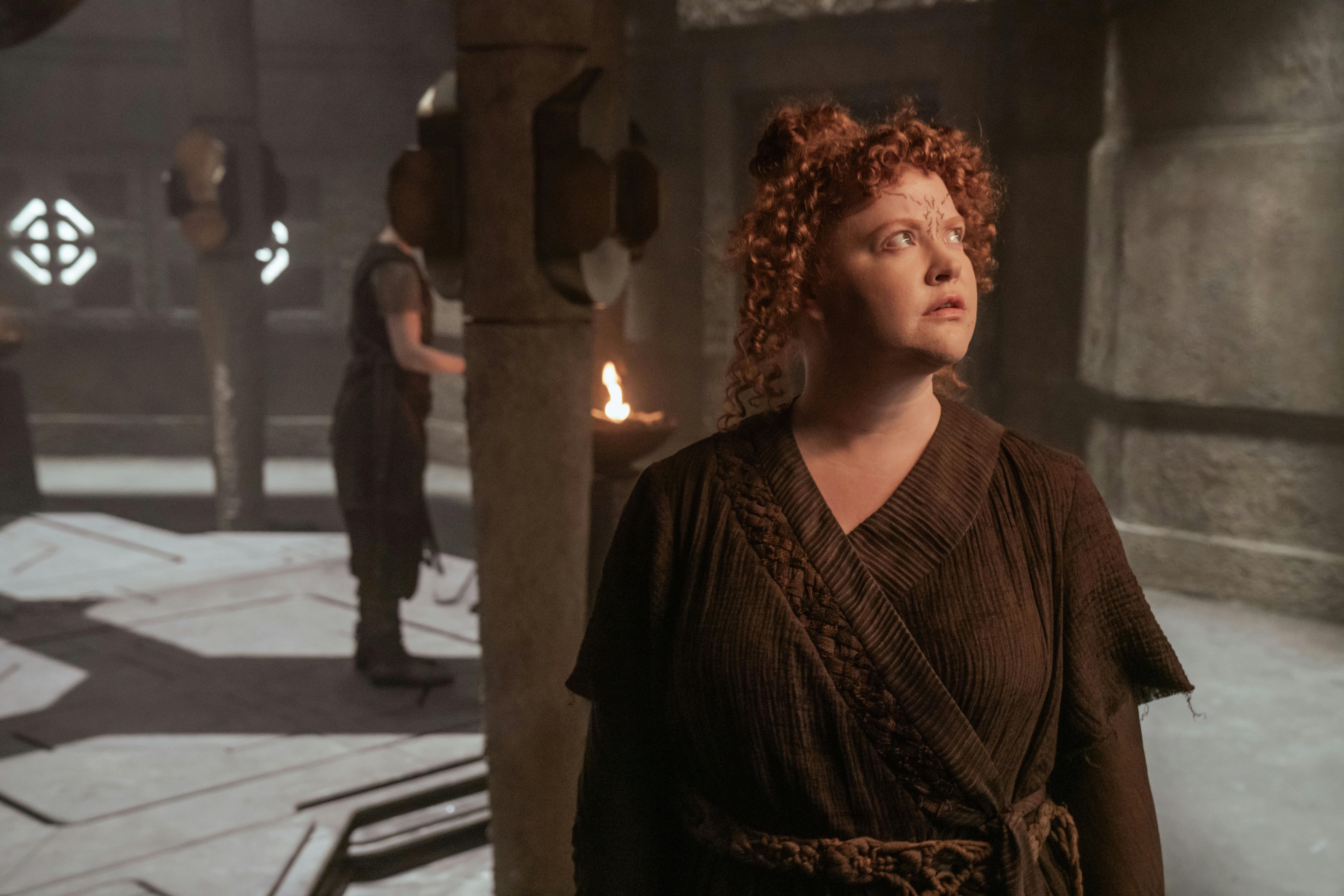
As Ravah takes Tilly to pray by the serenity wall, Captain Burnam has Discovery beam her as close to the temple as possible. A lifesign — Ohvahz — is detected in the control room next to the vacuum chamber, and Rayner raises concern about the Prime Directive. Burnham repeats her order to transport her over. Weakened by the lack of air, Tilly asks Ravah about the symbols carved into the temple's wall. They are numbers which represent the five serenity prayers. Ravah translates the ancient Halem'nese, stroking their hand across the symbols for "one," "two," and "three" — they are in the third Summit. Tilly turns to the markings for "four" and "five," suddenly realizing that the fifth symbol looks very familiar.
Ravah continues to speak about sacrifice, but they withdraw from the wall to kneel on the floor. They cry to themselves, overcome by the reality of death. They admit they do not wish to die, and Tilly moves to comfort them by cradling them in her lap. Tears also pour from the eyes of the priest, who prays to Ravah's mother in the control room and apologizes for failing to protect their child. Burnham materializes behind him, her unorthodox entrance inspiring confusion and fear in the Halem'nite. Urgently needing him to open the door to the chamber, the captain tries to reach him by explaining that they are standing inside of a machine. This gains his attention, and Burnham clarifies that the sacrifices don't bring the rain, the technology does.
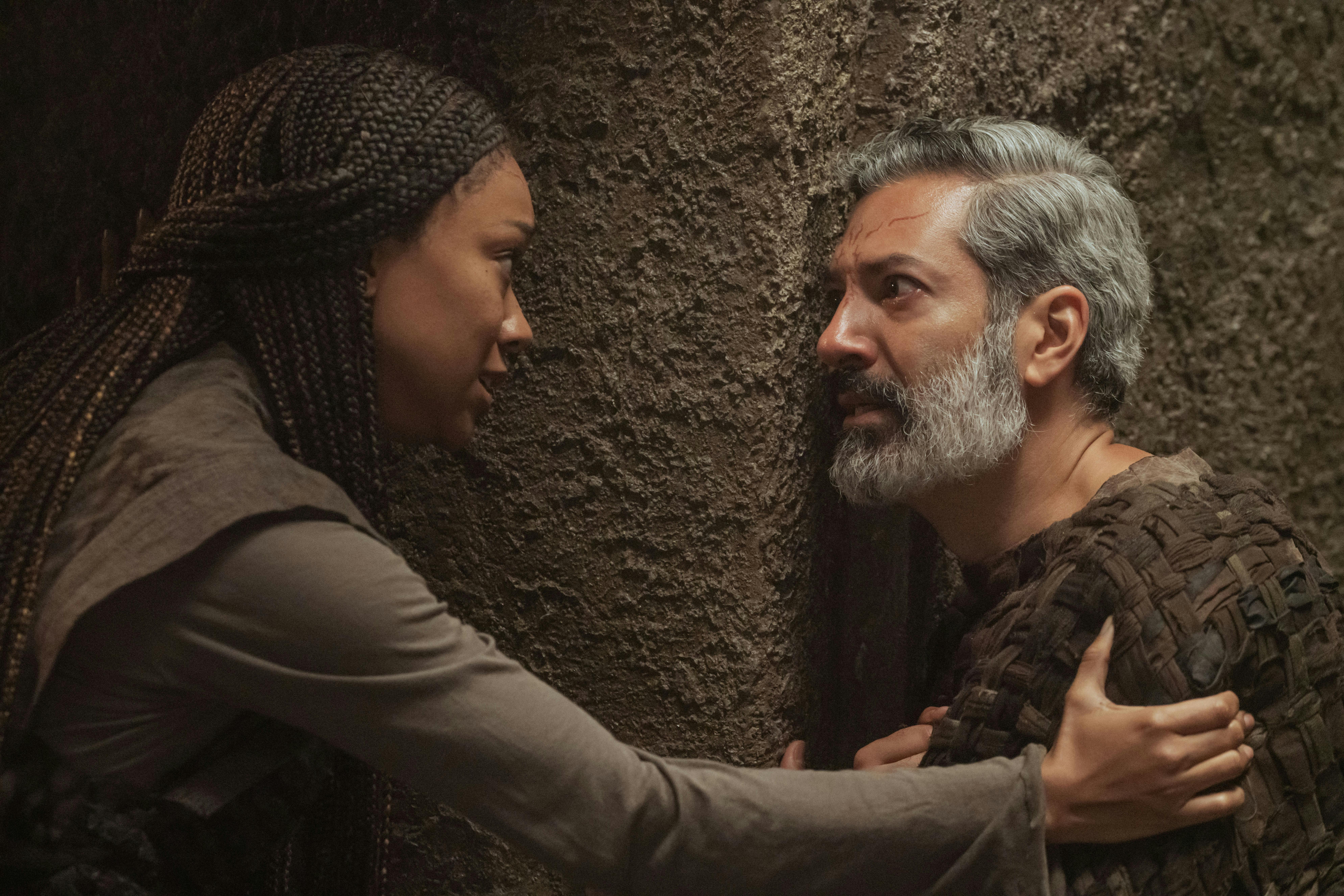
The momentary connection between them evaporates into disbelief, prompting Burnham to hurry to the door and frantically search for the mechanism to activate it. Tilly overhears their discussion through the comm channel and asks Ravah what they remember about their mother. The young compeer hums a song their mother sang to help them sleep. The captain seizes the chance and hums the tune to Ohvahz, who instantly recognizes it. Shocked, he listens to Burnham's words once again — technology allows her to hear his daughter in the other room, and they don’t want to die.
Burnham makes it clear that she is a person, not a god, and she has come from far away to help. The rains will come whether or not Ravah perishes, and she requires his assistance to ensure they live. Ohvahz springs into action, extracting a control handle from the floor and rotating it. The temple is filled with the rumble of stone in motion, and air streams into the vacuum chamber. Burnham and the priest scramble over to their unconscious companions, and Dr. Culber beams in to resuscitate Ravah.
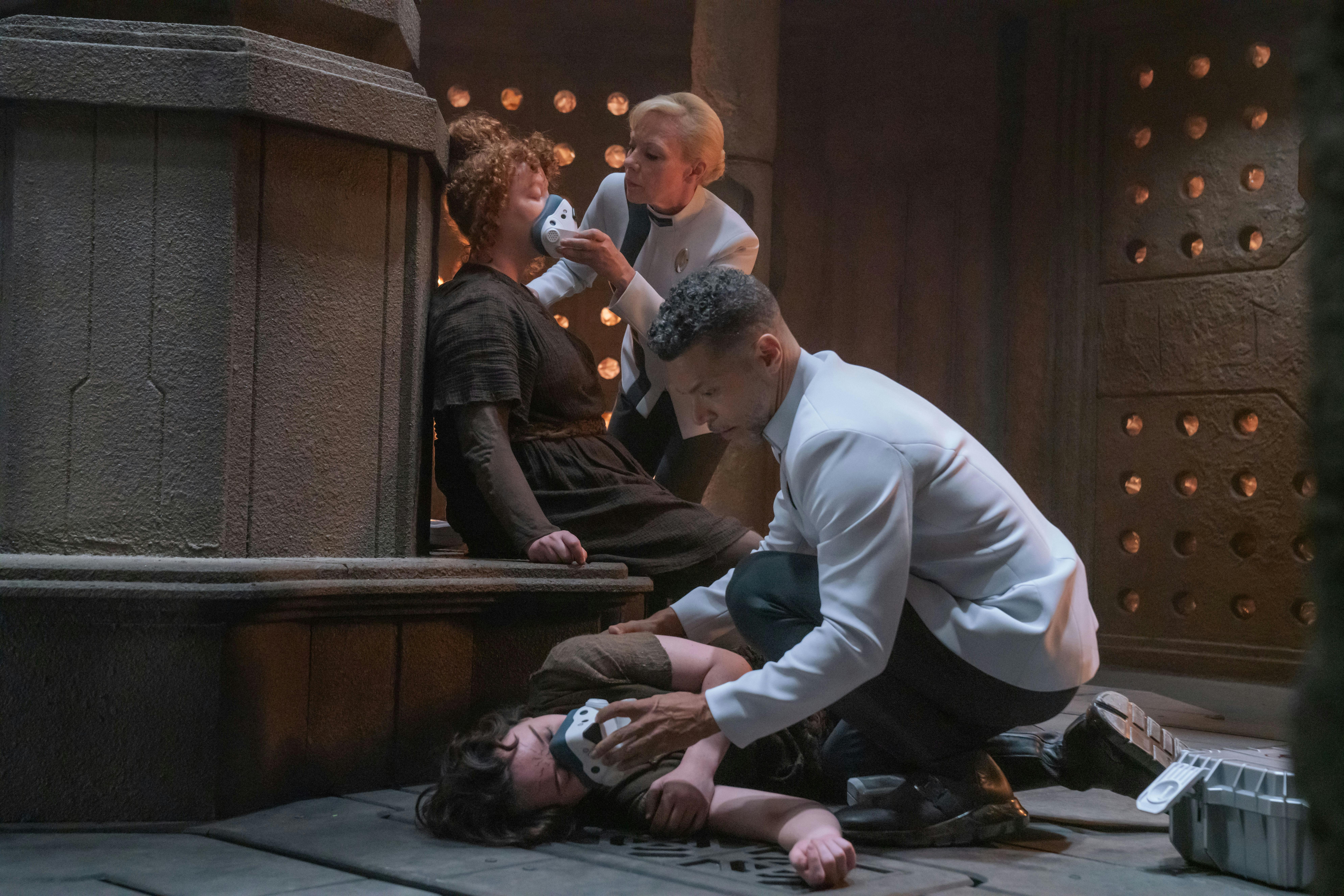
Soon after, Ohvahz marvels at a holographic depiction of Halem'no and is struck by its beauty. Crouching by Ravah, Culber signals that the young compeer will recover. Though relieved, the priest must now confront the Summit's true origins. Burnham details the value the Denobulans place on one another, and much like Halem'no, the massive storms of Denobula required them to build weather towers in order to survive. She supposes the Denobulans felt a connection to the Halem'nites during their travels. The tower will stop functioning eventually, but Burnham will teach them how to maintain it.
The priest is appreciative, but questions whether or not his gods are actually real. The captain counters, stating that nothing she has shown him proves that gods do not exist or that the Journey of the Mother Compeer did not occur. It simply means there are also people from other worlds. Concerned about what to tell his people, Ohvahz is uncertain how they can find a common purpose without the sacrifices. Burnham references Anorah, the woman he healed, who appeared ready to move beyond the sacrifices. Beliefs can evolve, and maybe more Halem'nites are prepared to understand that. Dr. Culber informs them that Ravah will wake soon, and their father moves to put their mother's bracelet back on his child before they stir.
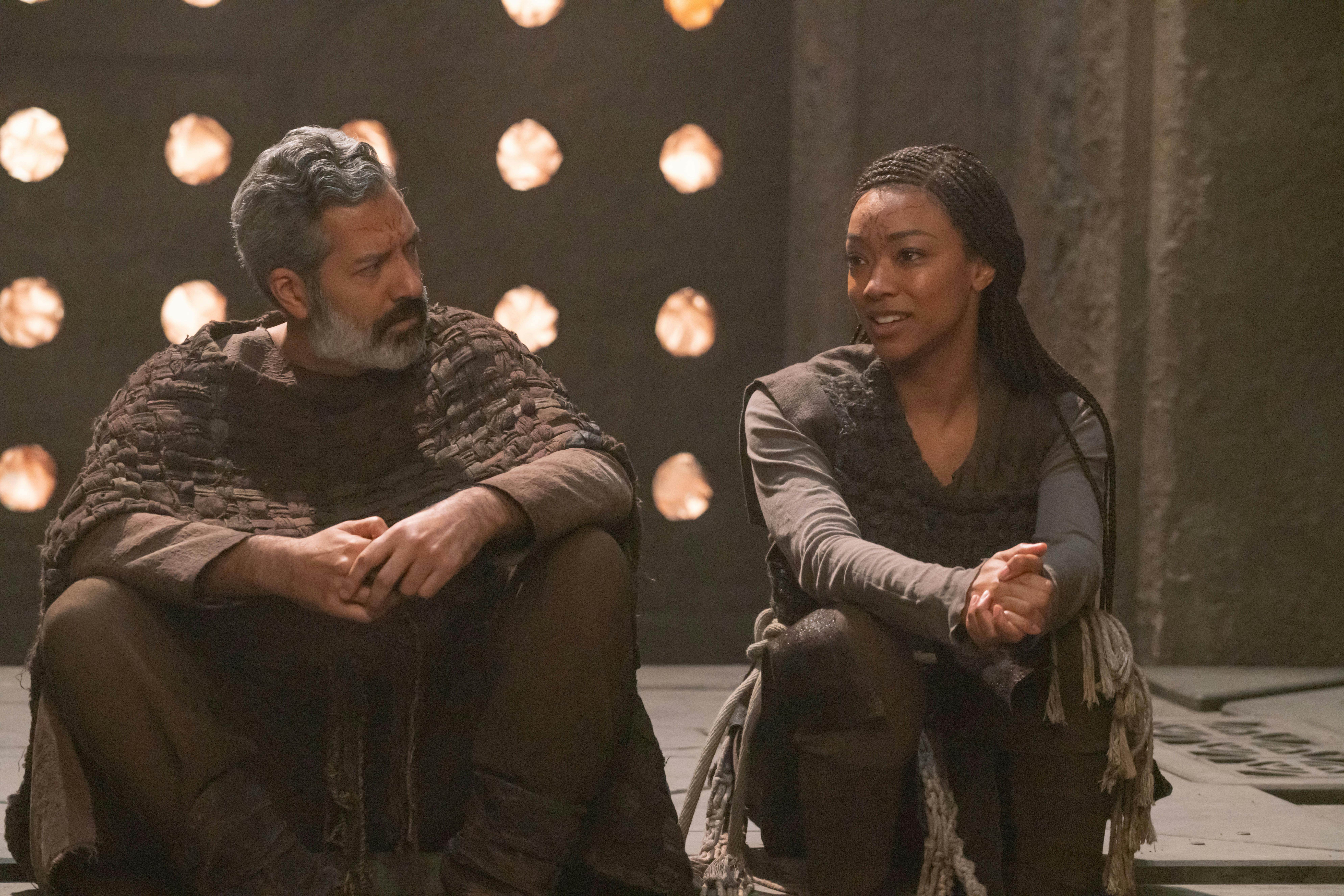
Burnham converses with Tilly about her Prime Directive violation, but the lieutenant has insight that will improve the captain's mood — the symbol for "five" on the temple's Serenity Wall matches the scratch mark on the vial of distilled water. The next clue must be in Tower Five! They turn as Ravah calls for their father, who settles their concern about defying their faith by saying, "Perhaps devotion means being able to hear when the gods tell us something new." He boasts about the pride he feels for them, and they embrace. A roar of thunder clatters above them, and a wealth of rain falls on the entire region.
Parked in a shuttle aboard Discovery , Book tests his piloting skills in a flight simulation. The program ends when Culber enters carrying two covered dishes, the doctor having brought his grandmother's mofongo con pollo al ajillo — replicator fresh. They take a seat to dine, and Book savors the delicious smell. Culber brings up Book's joke that the doctor has all the answers and vows that he does not. As they both enjoy the food, Culber notes that he's either having a "spiritual awakening" or seeing a truth he's always known. Book believes it sounds kind of wonderful and asks why Hugh is upset that Paul may never understand this feeling. Humans have an odd quirk — a tendency to consider something to be less meaningful if it's just for yourself. Book recalls Michael dealing with a similar struggle, and Culber can see that the former courier misses what he had with the captain. It's unknown whether the two can get their relationship back.
Having recovered the next clue from Tower Five, Burnham and Tilly lock it into the map alongside the three previous pieces. The latest device had a metal card attached featuring a Betazoid text inscription. Stamets is currently analyzing the writing, so the two officers take a breather in Engineering and theorize about what Dr. Kreel had intended to teach them with his clue. The scientists couldn't have known the weather tower would lead the Halem'nites to sacrifices, but the lesson may reside within the notion that technology is a massive responsibility. When Discovery finds the Progenitors ' creation, its crew will need to be incredibly careful. Lieutenant Christopher contacts them over the comm system, relaying that the U.S.S. Locherer just found Moll and L'ak. Admiral Vance wants Discovery to jump there immediately. As the starship leaves orbit and activates its spore drive, the serene sound of whistlespeak echoes out from the planet.

- Written by Kenneth Lin & Brandon Schultz
- Directed by Chris Byrne
Get Updates By Email
Jay Stobie (he/him) is a freelance writer, author, and consultant who has contributed articles to StarTrek.com, Star Trek Explorer, and Star Trek Magazine, as well as to Star Wars Insider and StarWars.com. Learn more about Jay by visiting JayStobie.com or finding him on Twitter, Instagram, and other social media platforms at @StobiesGalaxy.
Star Trek: Discovery Seasons 1-4 are streaming exclusively on Paramount+ in the U.S., the UK, Canada, Switzerland, South Korea, Latin America, Germany, France, Italy, Australia and Austria. Seasons 2 and 3 also are available on the Pluto TV “Star Trek” channel in Switzerland, Germany and Austria. The series streams on Super Drama in Japan, TVNZ in New Zealand, and SkyShowtime in Spain, Portugal, Poland, The Nordics, The Netherlands, and Central and Eastern Europe and also airs on Cosmote TV in Greece. The series is distributed by Paramount Global Content Distribution.
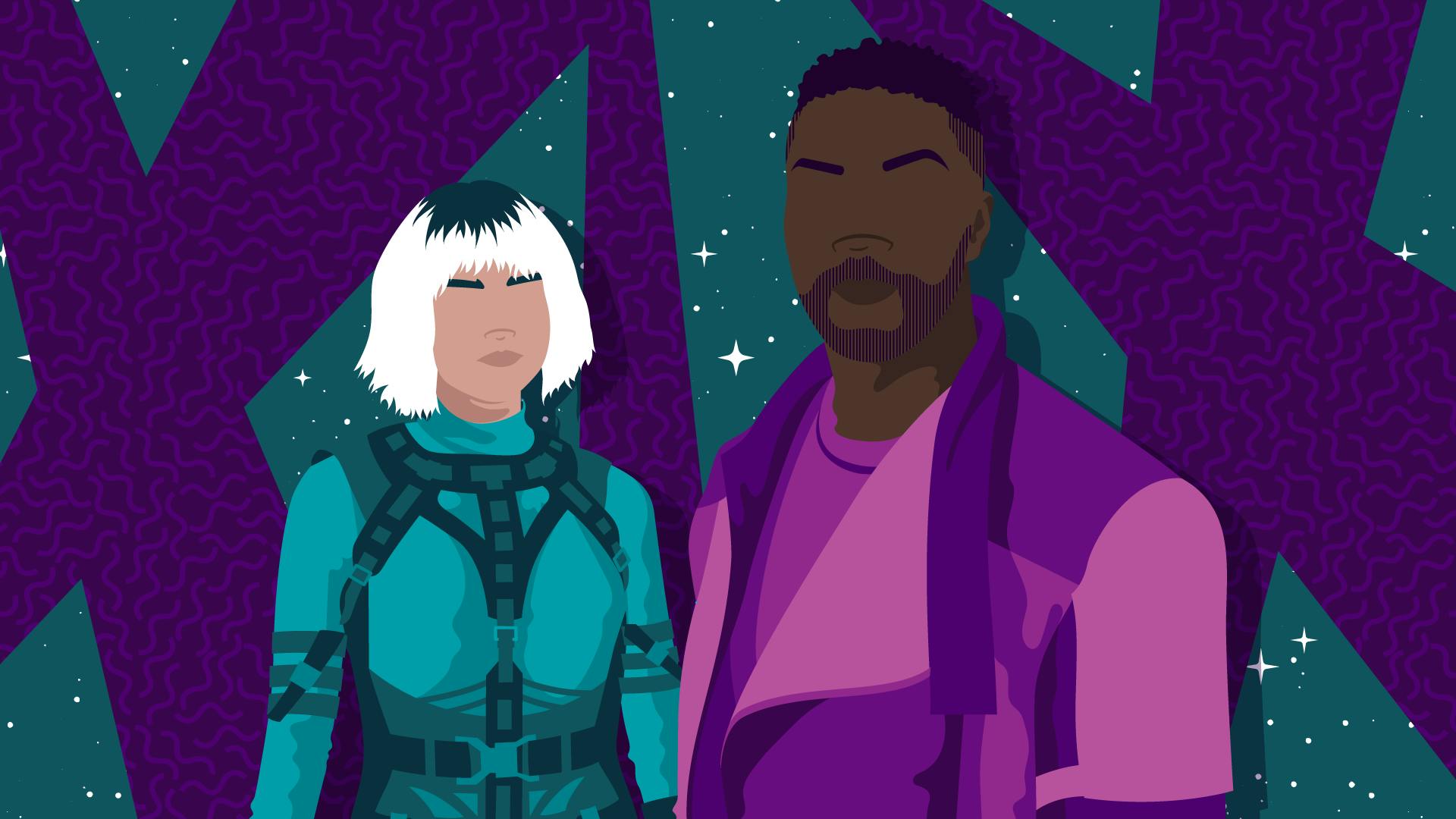

Phantasms (episode)
- View history
- 1.2 Act One
- 1.3 Act Two
- 1.4 Act Three
- 1.5 Act Four
- 1.6 Act Five
- 2 Memorable quotes
- 3.1 Production history
- 3.2 Continuity
- 3.3 Reception
- 3.4 Video and DVD releases
- 4.1 Starring
- 4.2 Also starring
- 4.3 Guest stars
- 4.4 Uncredited co-stars
- 4.5 Stunt double
- 4.6 Stand-ins
- 4.7 References
- 4.8 Other references
- 4.9 External links
Summary [ ]
Data is walking through the corridors of the USS Enterprise -D , when he encounters Geordi La Forge standing against a bulkhead . La Forge tells him they have a plasma conduit to install as they are bringing the Enterprise 's new warp core online in less than three hours. Data tells him he will proceed to deck 20 and begin modifications. As he leaves, La Forge shouts after him, " This oughta be a lot of fun! " Walking further up the corridor, Data sees three workmen destroying a warp plasma conduit . He first asks if they have authorization to work here, then tells them he must ask them to stop, and after he speaks, he emits a high-pitched sound through his mouth. The workers tell him to be quiet, then attack and dismantle him, first his left arm, then his right leg, and then ultimately his head. A startled Data suddenly wakes up in his bed.
Act One [ ]
The Enterprise is leaving Starbase 84 after installing a new warp core. Captain Picard has been invited to the annual Starfleet Admirals' Banquet on Starbase 219 by Admiral Nakamura . Picard lists all of the negatives about attending the banquet to Commander Riker – making dull conversation, uninteresting food , and boring speeches . Riker asks Picard if there is some way he could get out of attending and Picard says that, after six years, he's run out of excuses to avoid it.
Meanwhile, in engineering , Data can't stop talking about his nightmare . In the nine months since he has activated the dreaming program, he has had 111 dreams, but this appears to be his first nightmare. La Forge assures him that nightmares are a normal part of dreaming, and that being preoccupied with them is also part of the Human experience. They are interrupted by Ensign Tyler who triumphantly has just finished calibrating a electro-plasma system module and expresses her joy in learning engineering techniques from La Forge, and it is obvious she has a crush on him. La Forge is uncomfortable, but politely suggests she work with Lieutenant Farrell to check the deuterium cartridges next to get her out of his hair.
Soon, Picard calls in to La Forge and Data to attempt to activate the new warp drive . Picard orders Ensign Gates to set a course for Starbase 219 and engage at warp six. The Enterprise prepares to enter warp, but the ship's warp field collapses and the ship just sits in space. La Forge reports that they have run into problems with the warp plasma conduit. He informs Picard that he is going to have to reconfigure it. The Enterprise will now be delayed for several hours.
In his quarters , Data observes his cat sleeping and wonders what Spot dreams about. Counselor Troi visits Data to talk about his nightmares, and encourages him to continue with the dream program. She wishes him a good night and he wishes her the same.
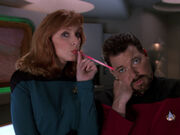
Dr. Crusher "drinking" from Riker's head
Data begins to dream. Opening his eyes , he is in Ten Forward , and Worf is nearby at a table, enjoying a piece of cake . Data asks what kind of cake it is. " A cellular peptide cake, with mint frosting. Would you like a bite? ", Worf says. Data declines, and his attention turns to Dr. Crusher and Riker at the bar . Riker has a drinking straw coming out of his head, and Crusher is drinking something out of it. There's a telephone ringing in the background. " Aren't you going to answer that?, " Riker demands. The workmen are also there, and again Data emits the high-pitched scream. They tell him to be quiet, and he shuts his mouth. One hands him a knife, and he cuts at a cake which forms the body of Counselor Troi. Troi pleads with him to stop hurting her, but he doesn't.
Troi, Worf, and La Forge are standing in Data's quarters and wake him up. They tell him he's overslept . " That is not possible, " he says, but it has happened nonetheless.
Act Two [ ]
In engineering, La Forge finds nothing wrong with Data's internal time base and his primary systems check out fine. He theorizes that perhaps it is part of the program, that Data is supposed to oversleep at times, and that his creator, Dr. Noonien Soong , may have intended it, as it is part of the Human experience. He asks about Data's dreams and comments that imagery must have been strange. " Strange, " Data says, " is not a sufficient adjective to describe the experience. "
Data consults Sigmund Freud in the holodeck , but after the psychologist comes up with a bizarre theory – telling Data that the nightmares are related to Data's desire for his mother and his impotence – Data leaves.
Admiral Nakamura calls the Enterprise , demanding to know when Picard will arrive for the banquet. The captain assures him he will be there on time. Shortly afterwards La Forge and Data again try to activate the warp drive, but there's another problem and the Enterprise is adrift. Nakamura is again contacted with the "bad" news.
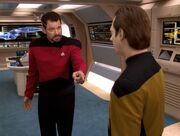
" Are you going to answer that, commander? What are you waiting for?! Answer it! "
In engineering , Data and La Forge work on the problem. Tyler comes by again briefly for a plasma inverter , still with a crush but La Forge doesn't have time to talk to her. Data then starts seeing dream imagery while he's awake. He sees a "mouth" on La Forge's neck , and the brace coil he holds looks like the knife with which he cut the "cellular peptide cake". He hears the telephone ringing again and Riker appears with a straw sticking out of his head, insisting he answer it and points at Data's chest area. Data opens his own chest, finding a dial telephone. He picks up the receiver. " Hello? " he asks. " Kill them. You must kill them all, before it's too late. " It is Freud's voice. La Forge wakes him out of it, and Data turns to see him and Tyler.
Act Three [ ]
Data goes to Troi for counseling. With Data's insistence that the technical reasons are ruled out, she suggests they start regular sessions. Data is excited at the prospect at developing a new neurosis, which amuses Troi, and looks forward to the next meeting. Until then, Data is to discontinue the dream program and Troi recommends that he take time to reflect on the experience.
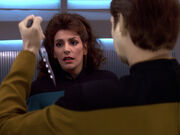
Data confronting Troi
In his ready room , Picard insists to Nakamura privately that he will be on-time, and will not need a tow ship to bring the Enterprise to the starbase. He goes to engineering and nervously suggests actions over the shoulder that La Forge and Data have already tried. When he suggests going over to reconfigure the isolinear chips , La Forge tells him that he and Data have the situation under control and asks him to just let them take care of it. Then, Tyler suggests that Picard could assist in moving the antimatter storage pods and they leave to get to it. However, meanwhile Data stares at the brace coil and is compelled to leave, unnoticed. He finds Troi in a turbolift and stabs her with the tool, first asking her to hold very still.
Act Four [ ]
Riker and Worf find them, and in the observation lounge after getting Troi to sickbay , Data claims that he saw another mouth on her shoulder, and he had an uncontrollable urge to eliminate it. Data is relieved of duty and confined to quarters while La Forge prepares a sub-polymer scan, the last remaining scan he can think of, since everything else reports nothing wrong with him.
Meanwhile, Dr. Crusher treats Troi's stab wound, but it mysteriously fails to heal. When Crusher removes the vascular pad , she discovers a rash , but also cellular degradation and an interphasic signature. She asks Martinez to get an interphasic scanner , which reveals an interphasic organism on the wound.
Worf brings Data to his quarters and confiscates his phaser. Data then takes the precaution of asking Worf to take care of Spot, since he isn't sure what he might do. Worf reluctantly agrees, and, on his way out, finds out he is allergic.
In sickbay, Crusher tells Picard and Riker about Troi's cellular degradation. She uses the interphasic scanner to show them the creature she has discovered on Troi, and another on herself, which are visible only with the scanner. She tells them that she has scanned all of her medical staff and these creatures have been found on almost all of them. Her analysis has determined that the creatures have attached themselves to their epidermal layers with osmotic tendrils. Using the scanner on Picard and Riker, Crusher finds one on Riker's head and another on Picard's neck. She notes the creatures are tapping directly into their bloodstream and they are spreading.
Act Five [ ]
Crusher reports in the observation lounge that the creatures are feeding on the cellular peptides of the crew's cells. They don't yet know how to destroy them, but if they don't, the cells of their bodies will disintegrate and they will all collapse into nothing more than a few pounds of chemicals. Picard and La Forge both think the creatures may be connected to Data's odd behavior, because their locations correspond to objects in Data's dreams. They tell Data about their discovery, and say that they want to connect him to the holodeck, so they can observe his dreaming.
Once there, La Forge and Picard observe Data, who again finds himself in Ten Forward, and then in Sigmund Freud's office. The telephone in Data's chest is the one from Freud's desk. The three workmen are also there, again dismantling a plasma conduit, leading La Forge and Picard to believe that the creatures are also linked to the malfunctioning warp core. Data makes the shrieking sound, which immobilizes the workmen. Data wakes up, ending the dream simulation, and says that he understands everything now. He explains that the workmen represent the parasites, Freud's phone calls were warnings about the danger they represent, and that they are weak against an interphasic pulse. By reconfiguring Data's positronic brain to emit an interphasic pulse, the creatures are killed.
La Forge explains that the new warp core must have been infested with the interphasic organisms from Thanatos VII , and that's why the engineering staff had so many problems initializing it. In order get warp power back up, he will have to construct a new conduit , which will take at least six hours, meaning that Picard gets out of attending the admiral's banquet once again. La Forge suggests to the captain that he can speed up the construction, but Picard tells him he wouldn't want to put the safety of the Enterprise at risk.
Troi visits Data in his quarters, and after listening to the details on the dreams from Geordi, she states that " turnabout is fair play ", and brings him a snack: a cake in the android's shape. " I wonder what Dr. Freud would say about the symbolism of devouring oneself, " Data says. " Data, " Troi responds, " sometimes a cake is just a cake. "
Memorable quotes [ ]
" This oughta be a lot of fun! "
" Be quiet! "
" I've just received a message from Starfleet Command. " " Bad news? " " You could say that. I've been invited to the annual Starfleet admirals' banquet. " " My condolences. "
" Can't you think of some excuse to get out of it? " " After six years, Number One, I don't think I have any excuses left. "
" Now let's see how fast she can run. "
" I have often wondered what Spot dreams about. His twitching and rapid breathing would seem to suggest anxiety. But Spot has never seen a mouse, or any other form of rodentia. He has never encountered an insect or been chased by a canine. "
" Goodnight Spot. " " Meow. "
" Good work, Tyler. I thought he'd never leave. "
" Mr. La Forge, why isn't my ship moving? "
" Commander La Forge? " " Speaking of nightmares… "
" Dreams are the royal road to the knowledge of the mind. "
" Sounds like it must have been pretty strange. " " "Strange" is not a sufficient adjective to describe the experience. "
" Tell me more about this, uh… cake. " " It is difficult to explain. Counselor Troi's body… was a cake. "
" I believe I can fit you in, uh… next Tuesday, hmm? " " That will not be necessary. Computer, end program. "
" Hold… very still, counselor. "
" Do not interrupt! "
" Kill zem. You must kill zem all, before it's too late. "
" What is it? " " The question is, what are they . "
" Normally I would wish you pleasant dreams. But in this case, bad dreams would be more helpful. "
" He will need to be fed once a day. He prefers feline supplement number 25. " " I understand. " " And he will require water. And you must provide him with a sandbox. And you must talk to him. Tell him he is a pretty cat. And a good cat. " " I will feed him. " " Perhaps that will be enough. "
" Mr. Data, what kind of cake is this? " It is a cellular peptide cake. " (With mouth full) " With mint frosting. "
" I wouldn't want to sacrifice the safety of the ship. "
" Sometimes a cake is just a cake. "
Background information [ ]

Hair stylist Patricia Miller on the set
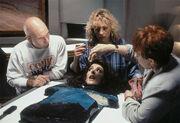
Stewart, Sirtis, Joy Zapata , and June Abston Haymore on set
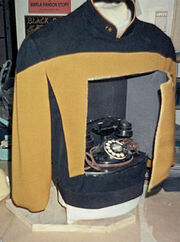
Data's torso, opened
Production history [ ]
- Final draft script: 17 August 1993 [1]
- Filmed: 18 August 1993 – 26 August 1993
- Premiere airdate: 25 October 1993
- First UK airdate: 14 February 1996
Continuity [ ]
- During his discussion with Sigmund Freud in the holodeck, Data states he has no mother. He meets his "mother", Juliana Tainer , the wife of his creator, Noonien Soong , four episodes later in " Inheritance ".
- Data mentions he had discovered his ability to dream nine months before. This refers to the events of " Birthright, Part I ".
- Jenna D'Sora 's gift to Data from " In Theory " can be seen on a shelf in Data's quarters.
- The modified warp core was again used for the warp core of an alternate Enterprise -D in " Parallels ".
- Data's head prop from the episodes " Time's Arrow " and " Time's Arrow, Part II " was reused in this episode when one of the workmen decapitated him.
- In this episode, Data refers to Spot as a male, whereas later "he" appears to be female and in fact even has a litter of kittens in " Genesis ".
- When Data goes through his Human ritual of getting into bed, his Sherlock Holmes outfit from " Elementary, Dear Data " can be seen hanging from his coat rack.
Reception [ ]
- This is one of the few Star Trek episodes to be slightly edited for screening by the BBC in the UK: the scene in the turbolift when Data confronts Troi with a knife (which caused some upset among audiences in the US) was trimmed to remove the actual moment of stabbing. Syfy channel's UK airing of this episode to date still has this edit.
Video and DVD releases [ ]
- UK VHS release (two-episode tapes, CIC Video ): Volume 79, 9 May 1994
- As part of the TNG Season 7 DVD collection
Links and references [ ]
Starring [ ].
- Patrick Stewart as Capt. Jean-Luc Picard
- Jonathan Frakes as Cmdr. William T. Riker
Also starring [ ]
- LeVar Burton as Lt. Cmdr. Geordi La Forge
- Michael Dorn as Lieutenant Worf
- Gates McFadden as Dr. Beverly Crusher
- Marina Sirtis as Counselor Deanna Troi
- Brent Spiner as Lt. Commander Data
Guest stars [ ]
- Gina Ravarra as Tyler
- Bernard Kates as Sigmund Freud
- Clyde Kusatsu as Nakamura
- David L. Crowley as Workman
Uncredited co-stars [ ]
- Joe Baumann as Garvey
- Brandy as Spot
- Michael Braveheart as Martinez
- Bud as Spot
- Debbie David as Russell
- Cameron as Kellogg
- Tracee Lee Cocco as Jae
- Gerard David, Jr. as operations ensign
- Matt Goodrich as command officer
- Grace Harrell as operations officer
- Clay Hodges as illusory workman
- Rad Milo as operations ensign
- Monster as Spot
- Michael Moorehead as sciences ensign
- Kevin Pentalow as illusory workman
- Keith Rayve as command ensign
- Joycelyn Robinson as Gates
- Oliver Theess as command division officer
- Mary Thompson as operations officer
- Female civilian
- Medical officer (voice)
Stunt double [ ]
- Brian J. Williams as stunt double for Brent Spiner
Stand-ins [ ]
- David Keith Anderson – stand-in for LeVar Burton
- Debbie David – stand-in for Brent Spiner
- Michael Echols – stand-in for Michael Dorn
- Nora Leonhardt – stand-in for Marina Sirtis
- Lorine Mendell – stand-in for Gates McFadden
- Richard Sarstedt – stand-in for Jonathan Frakes
- Dennis Tracy – stand-in for Patrick Stewart
References [ ]
2364 ; 2369 ; adjective ; Admirals' Banquet ; analogy ; antisocial ; bloodstream ; cake ; camel ; canine ; cellular decay ; cellular level ; cellular peptide ; centimeter ; chronometer ; cigar ; counselor's office ; confiscation ; deuterium cartridge ; directed dreaming ; dismemberment dream (dismantlement dream); ego ; engineering ; engineering staff ; epidermal layer ; EPS module ; Farrell ; feline supplement 25 ; frosting ; Galaxy class decks ; German ; hemoglobin ; id ; impotence ; impulse system ; insect ; interphasic organism ; interphasic scanner ; jazz ; leech ; level 3 diagnostic ; medical staff ; microfracture ; mouse ; muscle spasm ; neurosis ; nightmare ; number one ; osmotic tendril ; oversleeping ; painting ; pickaxe ; plasma conduit ; plasma inverter ; psychoanalysis ; rash ; rodent ; Rozhenko, Alexander ; sand box ; sexual desire ; sexual inadequacy ; sidearm ; Soong, Noonien ; speech ; stab wound ; Starbase 84 ; Starbase 84 planet ; Starbase 219 ; Starfleet Command ; statue ; straw ; Ten Forward ; tendril ; Thanatos VII ; tow ship ; transference ; tricorder ; Tuesday ; warp plasma conduit ; Woman Holding a Balance, A ; yawn

Other references [ ]
- Interphasic Scan Display 277: anaphase ; cellular data analysis ; interphase ; metaphase ; preprophase ; prophase ; telophase
External links [ ]
- " Phantasms " at Memory Beta , the wiki for licensed Star Trek works
- " Phantasms " at Wikipedia
- "Phantasms" at StarTrek.com
- " Phantasms " at MissionLogPodcast.com , a Roddenberry Star Trek podcast
- "Phantasms" script at Star Trek Minutiae
- " Phantasms " at the Internet Movie Database
- 2 ISS Enterprise (NCC-1701)
- Cast & crew
- User reviews
The Menagerie: Part II
- Episode aired Nov 24, 1966

At Spock's court martial, he explains himself with mysterious footage about when Capt. Pike was kidnapped by powerful illusion casting aliens. At Spock's court martial, he explains himself with mysterious footage about when Capt. Pike was kidnapped by powerful illusion casting aliens. At Spock's court martial, he explains himself with mysterious footage about when Capt. Pike was kidnapped by powerful illusion casting aliens.
- Robert Butler
- Marc Daniels
- Gene Roddenberry
- John D.F. Black
- William Shatner
- Leonard Nimoy
- Jeffrey Hunter
- 22 User reviews
- 11 Critic reviews

- Captain James Tiberius 'Jim' Kirk

- Mister Spock

- Captain Christopher Pike
- (archive footage)

- Commodore José Mendez

- (as M. Leigh Hudec)

- Lt. José Tyler

- Dr. Phil Boyce

- Yeoman J.M. Colt

- C.P.O. Garrison

- (credit only)

- Christopher Pike

- Lt. Clifford Brent
- (uncredited)
- Robert Butler (footage from "The Cage")
- Marc Daniels (uncredited)
- John D.F. Black (uncredited)
- All cast & crew
- Production, box office & more at IMDbPro
Did you know
- Trivia In the script, McCoy and Scott have a scene in which they explain to Kirk how they figured out which computer bank Spock tampered with to lock the ship on course. They took perspiration readings on all banks, and since Spock's sweat has copper in it, traces of copper were found. This scene isn't shown.
- Goofs When fighting the Kaylar in the illusion of Rigel 7, Pike holds the Kaylar off with a staff as he backs up the stairs. The staff appears to have a metal blade. When the blade is pushed against the Kaylar's body, the blade flexes like rubber.
Vina : Now THERE'S a FINE choice for intelligent offspring!
Yeoman J.M. Colt : Offspring? As in children?
Number One : Offspring as in... he's Adam, is that it?
- Alternate versions Special Enhanced version Digitally Remastered with new exterior shots and remade opening theme song
- Connections Edited from Star Trek: The Cage (1966)
- Soundtracks Theme From Star Trek Written by and credited to Alexander Courage
User reviews 22
- Jun 28, 2006
- November 24, 1966 (United States)
- United States
- Official Facebook
- Desilu Studios - 9336 W. Washington Blvd., Culver City, California, USA
- Desilu Productions
- Norway Corporation
- See more company credits at IMDbPro
Technical specs
- Runtime 50 minutes
Related news
Contribute to this page.

- See more gaps
- Learn more about contributing
More to explore

Recently viewed

- May 3, 2024 | Michelle Yeoh Receives Presidential Medal Of Freedom
- May 3, 2024 | Chances Of Skydance Takeover Of Paramount Fades; Competing Sony Deal Reportedly Unlikely Too
- May 3, 2024 | Podcast: All Access Listens For “Whistlespeak” With Commentary From Mary Wiseman Of ‘Star Trek: Discovery’
- May 2, 2024 | Recap/Review: ‘Star Trek: Discovery’ Goes On A Spiritual Journey In “Whistlespeak”
- May 1, 2024 | Toronto Stage Used For ‘Discovery’ Renamed “The Star Trek Stage” By Pinewood Studios
Recap/Review: ‘Star Trek: Discovery’ Goes On A Spiritual Journey In “Whistlespeak”
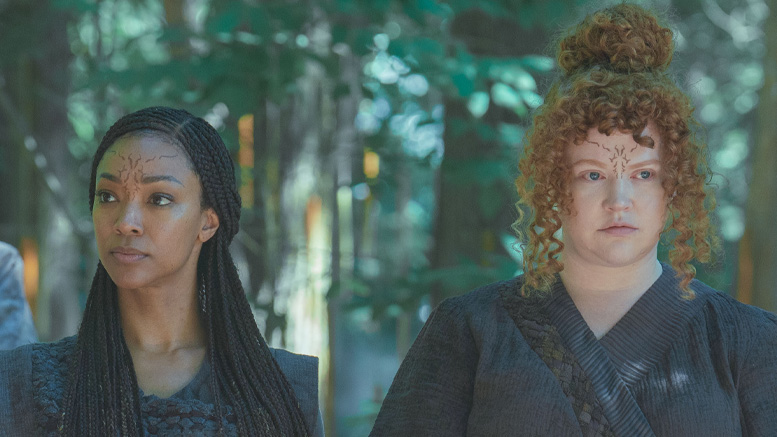
| May 2, 2024 | By: Anthony Pascale 100 comments so far
“Whistlespeak”
Star Trek: Discovery Season 5, Episode 6 – Debuted Thursday, May 2, 2024 Written by Kenneth Lin & Brandon Schultz Directed by Chris Byrne
A classic Trek setup delivers a solid episode exploring character arcs and big ideas.
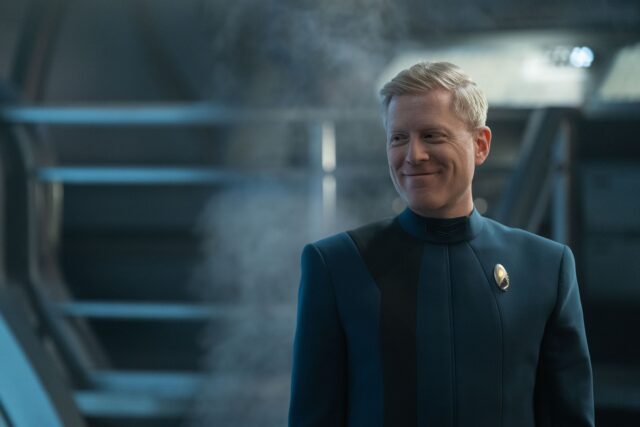
Hey, I’m in this episode too!
WARNING: Spoilers below!
“The most important thing is to work in harmony”
Picking up on the clue they nabbed in the previous episode, Paul and the geek squad run into a science wall deciphering the simple vial of water so the captain suggests they try cultural analysis instead before she pops off to the mysterious Infinity Room. Kovich tells her that another ship is tracking Moll and L’ak, and the Disco has to stay on task for the Progenitor Tech. He does offer a bit of help, providing a list (on actual paper!) of all the scientists from Vellek’s team. Returning to the science lab the team quickly sorts out which scientist left the water clue, it was a Denobulan named Dr. Kreel who designed rain-making weather towers. A bit more detective work narrows things down to an arid world on an old Denobulan trade route and presto shroomo, they arrive at Planet Helem’no. The good news is they found one of Kreel’s weather towers. The bad news: the tower is surrounded by some “weird energy” preventing scans… and a pre-warp society. The captain flexes her xenoanthropology, revealing Helem’nites have three gender identities and no concept of class status; sounds like just the kind of place a Denobulan would party. Tilly is tagged to join on the field trip and so it’s good ol’ alien disguise time!
On the planet, they have a bit of a hike to get to the tower so they walk and talk about Tilly’s new life as a teacher at Starfleet Academy, where she is concerned one of her students is thinking of leaving. Soon enough they follow some “whistlepseak” (title alert!) leading to a group of pilgrims, only to witness one collapse due to spending too much time in the dust storms. Michael and Tilly struggle over that old Prime Directive, but the local woman ends up being saved by High Priest Ohvahz and his cool “sound cure,” which has the surprise side effect of knocking Michael out. She wakes up to find Tilly making friends with the priest’s kid Ravah who is super excited to get to the temple at the high summit, which is actually an 8-century-old Denobulan weather machine. Shhh. There is a traditional “Journey” race with the winner getting the honor to enter the temple and so Michael and Tilly sign up as a way in to search for the clue. Ravah signs up too, but priest dad is suspiciously not into the idea. Tilly encourages them, seeing the same kind of ambition she admires in her cadets. Michael takes a surreptitious sidebar to talk to Rayner and the gang on the Disco. Adira discovered more old (and broken down) weather towers and this last one is about to fritz out too. This fun day trip just turned into one of those “everyone is going to die if we don’t fix it” kind of things.
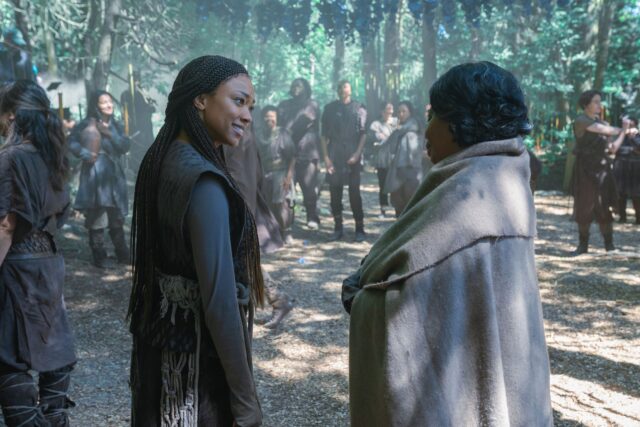
Why am I getting a sense this is no “fun run.”
“Let’s go meet the gods together”
Meanwhile on Discovery, Culber is still feeling a bit off. He decides to get counseling from a holo grief program based on his own abuela, who was known to dabble in the spiritual. He is looking for answers to what’s been happening to him since he merged with a Trill , but grandmother reminds him she was also a doctor, suggesting he stop trying to examine his soul before examining his body. So he grabs his hubby and they head to sickbay because “nothing is as romantic as a neural scan.” Aww. All Paul can detect is Hugh’s brain is normal, and of course “handsome.” Adorable. Culber was hoping for more, revealing ever since Trill he feels “more connected” to something big, but he just doesn’t know what to do it about. Is someone about to meet a Koala ?
Michael has a curious chat with the cured woman from earlier talking about how she really misses her old friend who won the last big race. Like priest dad, she suggests there are other ways to show devotion besides participating in the Journey ritual. Hmm. The race begins with the sucking of a cube that parches the competitors as they head up a course lined with water bowls, which they can’t drink without being disqualified. After spotting some mutated moss, Michael leaves the race to find the radiation-leaking control panel. Eventually, Tilly and Ravah are the only two left, both tripping big-time with dehydration. The ritual now calls for carrying water bowls, which seems particularly cruel. Ravah drops theirs and Dad is elated, but Tilly steps up and shares her water with her new little protégé, and they continue to the high summit together. Teamwork! They tie up and both get to enter the temple. As Ravah takes in the spiritual moment, Tilly uses her cool new retinal tricorder but isn’t finding any clue. Priest dad shows up looking miserable, telling the winners their sacrifice will bless Helem’No for many seasons. Sacri-whatnow?
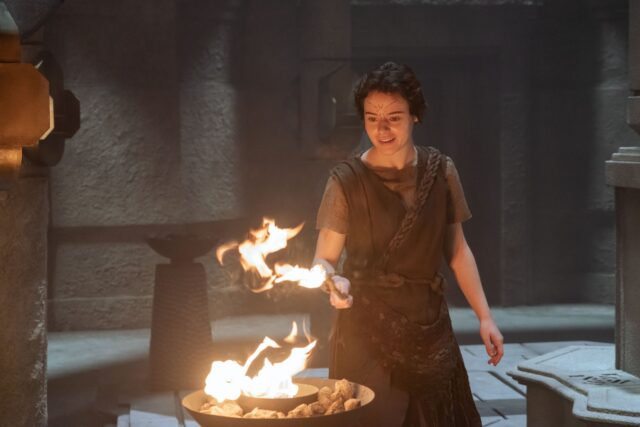
Upon reflection, fire was not a good call for the vacuum chamber.
“Beliefs can evolve”
As the walls are about to literally close in on Tilly, Michael gets some tech support from Adira to fix the weather system’s control panel, which is in the middle of the forest for some reason. The ensign is still feeling out of sorts since letting the time spider on board (not their fault) but Rayner rallies them so after some technobabble, the system is fixed. Tilly is now trapped in a vacuum chamber and can’t be beamed out so Michael breaks the Prime Directive and beams into the room right next door where Priest Dad is hanging out. With the air escaping, Ravah is now having second thoughts as Michael goes all in with their father, revealing his whole world is a lie so he should just open the door. Yeah, that didn’t work so Michael makes contact through the impenetrable wall using her subcutaneous communicator and starts humming a song she hears from Ravah that their mother used to sing. That gets Ohvahz’s attention and with “I am not a god but maybe I was sent here by one,” he opens his mind to a new reality… and the door. By this time Ravah has collapsed but Culber’s medical team can now beam in for the save. Heisenberg be praised!
As Culber and his team work everyday miracles, Ohvahz takes in the wonder of a hologram of his planet as he learns aliens called Denobulans saved them centuries ago. Now it’s his job to keep their technology working… no prayer required. Michael plays agnostic on whether this big reveal disproves the divine, leaving him with the thorny issue of getting his society to stop the pointless (yet popular) sacrifices. As Dad and Ravah reunite, Tilly has big news, showing Michael wall markings matching those on that persnickety water vial clue. They are in the wrong tower, but the next map piece and clue is in tower #5. Back on the ship, Book is sulking for not getting picked for the fun away mission, doing what dudes do… playing video games – technically shuttle combat simulation, but it looked just like Asteroids . Culber joins to cheer him up with a snack and to find a new outlet to talk about his burgeoning “spiritual awakening.” The former courier offers solace saying it’s okay for Hugh to have a part of his life he doesn’t share with Paul, while Book inadvertently shares how much he misses what he had with Michael. As the boys share a nice moment, Tilly and Michael have one too as they put the fourth piece of the map in place and ponder the big picture, and how each of the scientists seems to be sending them a message through time, warning of the “massive responsibility” of the Progenitor tech. Before they work all that out, the word comes that Moll and L’ak have been found. Black Alert!
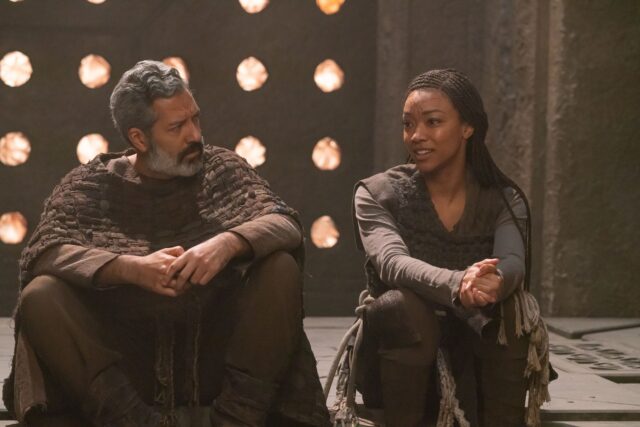
Wait ’till I tell you about Denobulan marriages, it’s going to blow your mind.
Faith of the heart
“Whistlespeak” is a decent mid-season episode that takes a moment to pause and reflect on the season’s themes and impact on the characters. The pacing was slower by design, giving time to take in the location, performances, and character development. And they threw in the world-ending stakes to keep it interesting. Like other season 5 entries, the premise is classic Trek with an actual visit to a strange new world. Exploring a pre-warp society and coming into conflict with the Prime Directive, evokes episodes like “Who Watches the Watchers,” “The Paradise Syndrome,” and many others. You may not even notice it but the facial markings and even Tilly’s hairstyle were added as they beamed down, a subtle 32nd transporter tech upgrade to having the doctor handle alien disguises. It’s always hard to come up with a new culture on Star Trek but keeping it simple worked for “Whistlespeak.” The events on Helem’No were also a bit of a microcosm of the season itself, a race to receive the grace of the gods is not so different than the USS Discovery’s race to find the Progenitor’s tech. Like the Progenitors, the Denobulans played God with this planet but there is a warning about even good intentions can have unintended consequences. Confronting the Prime Directive — one of the core tenets of Federation philosophy — isn’t so different than how the High Priest had to evolve his worldview. The season’s focus on connection was nicely woven throughout the various plots and stories with a strong emphasis on the recurring theme of exploring spirituality without getting too heavy-handed, showing respect, and learning lessons from different points of view, which is all very Star Trek.
This was a great episode for Mary Wiseman as she showed off all the familiar aspects of Tilly from her dry wit to her whip smarts, with the season’s added layer of her growing into a mentor figure, such as how she immediately bonded with Ravah, ably played by guest star June LaPorte. And once again this final season reminds us where it all started, bringing back some of the Michael/Tilly bonding seen in the first couple of seasons, including a bit of running together as they used to do around the USS Discovery. Extended scenes with Wiseman and Sonequa Martin-Green have been missed. But as this was a Tilly-focused episode, the show could have held back some of its tendencies, giving her more of the “aha” moments to move the plot along. Burnham will also be the hero, but share the character wealth. Wilson Cruz also stood out as we explored his character’s spiritual awakening. This storyline has been playing along nicely and seems to be setting something up. Simple things like paying off namedrops of his abuela show how much Discovery has improved on layering in these season-long character arcs.
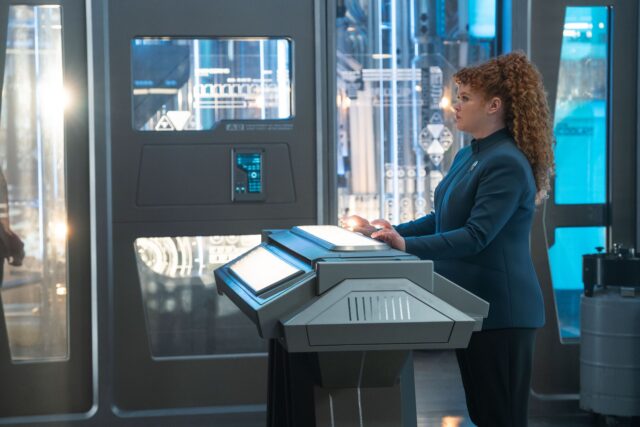
Tilly is concerned about her listing on ratemyprofessor.com.
Reach for any star
While the intriguing big Breen reveal from the previous episode was set aside for this week, the search for clues structure continues to allow for these nice little episodic adventures. It’s always great to meet a new culture and expand on the canon. Once again the season doesn’t shy away from utilizing franchise lore, in this case bringing in a few bits of Denobulan society through Dr. Kreel. However, after we got to (sort of) meet the first two Progenitor research scientists in episodes 1 and 3, the show is missing an opportunity to continue that by introducing the others. Instead of just talking about Denobulans, it would have been a treat to actually get to see Dr. Kreel (and Dr. Cho in the last episode, too), and that could have also helped sell some of the episode’s themes. On the other hand, it’s always great to get to learn more about the enigmatic Dr. Kovich, with David Cronenberg continuing to intrigue us with more tidbits about his character who has a penchant for old legal pads. This and his “Infinity Room,” all feel like it is leading somewhere and hopefully this series doesn’t wrap up without finally explaining what is his deal.
Of course, the episode also has some of the usual frustrations. Discovery needs to find some more creative ways to explain away when and how and where the 32nd technology doesn’t work. It seems every episode has some weird energy field preventing the transporters from working so that the episode can progress at the desired pace, specifically a walking pace. That being said, the retinal tricorders were a nice new bit of tech, although perhaps not discreet enough if someone checks out what’s happening with one of your eyes. And while it may only be the “Prime Suggestion” to many Trek captains, it still isn’t clear if the season plot “Red Directive” supersedes the Prime Directive, but for obvious reasons, it’s not likely Burnham will face the same kind of tribunal as (formerly) Captain Rayner. The disruption to this society was pretty profound and they probably should have noted that Starfleet would be back to check in to make sure they didn’t just kick off a religious war. By the way, why didn’t the Denobulans ever check in after leaving all their tech running? These quibbles are not episode breakers but are the usual kinds of things that Discovery doesn’t seem interested in tying up, and perhaps they are a bit nitpicky, but that too is a Trek tradition. Finally, this may not be a nitpick, but the crew seems a bit blasé in how they treat the slowly-assembling map, which seems to be left around various parts of the Discovery. Like every hero ship before, the USS Discovery has been boarded by the bad guys on several occasions, so maybe this is setting up for a coming heist.
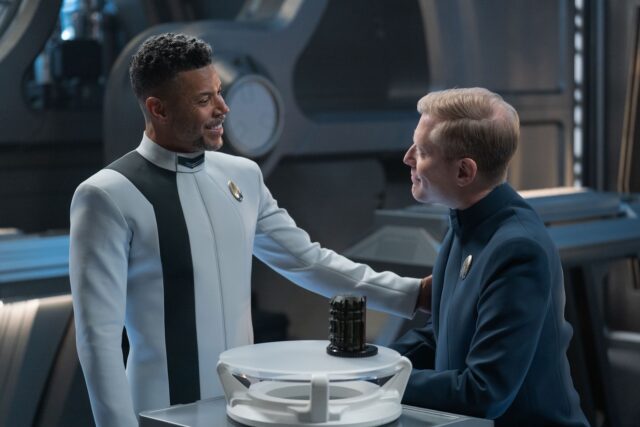
The most important thing in the Federation makes for a nice conversation piece.
Final thoughts
This (dare I say) “filler” episode was a solid outing that delivered some classic Star Trek to Discovery . With four out of five pieces of the map assembled in six episodes, it feels like we are making progress without getting sidetracked. The pivot in Season 5 continues to be finally finding the sweet spot in episodic adventures, serialized plot, and character development.
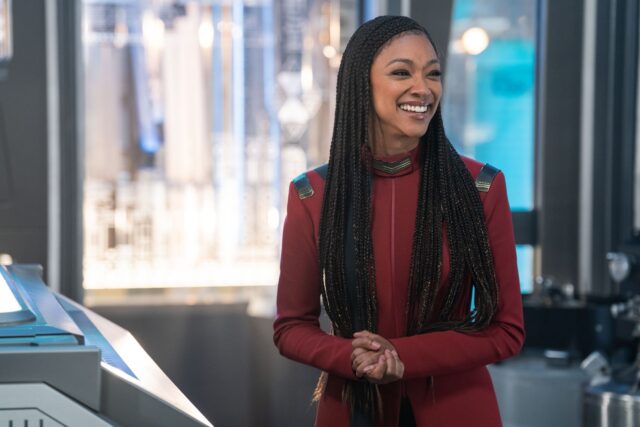
Only four more, y’all.
- For the third episode in a row, Doug Jones is not credited. Saru is confirmed to appear in at least the finale episode, so he will be back.
- The actual whistlespeak heard in the episode was performed by professional whistler Molly Lewis .
- Michael studied xenolinguistics on Vulcun under a Dr. T’Prasi.
- Denobulans use silver iodine to make it rain on Denobula, which is used today in cloud seeding .
- The walls of the Denobulan vacuum chamber were made of solid Tritanium , which was commonly used by Starfleet in the 24th century, but perhaps the thickness prevented beaming.
- The (replicated) Culber family Mofongo con pollo al ajillo is a traditional Puerto Rican dish with rice, chicken, and garlic.
- The “sound cure” bowls used by the Hilem’No are like so-called Tibetan “ singing bowls ” which have been used in the modern era for “ music therapy .”
- The sound wave pattern shown during the “sound cure” is a real phenomenon called cymatics .
- The weather control interface was in the Denobulan language , first seen on Star Trek: Enterprise .
- If Kovich’s 21st century legal pad is made of acid-free paper, then it could indeed survive for centuries .
- Vellek (Romulan)
- Jinaal Bix (Trill)
- Carmen Cho (Terran)
- Hitoroshi Kreel (Denobulan)
- Marina Derex (Betazoid)… obviously named in honor of Marina Sirtis .
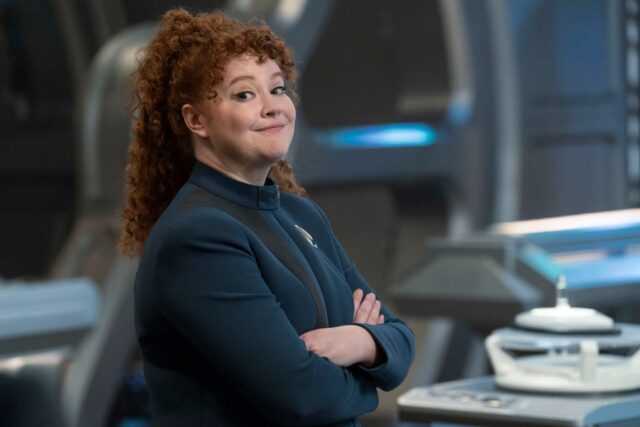
Four more?… for you maybe.
More to come
Every Friday, the TrekMovie.com All Access Star Trek Podcast covers the latest news in the Star Trek Universe and discusses the latest episode. The podcast is available on Apple Podcasts , Spotify , Pocket Casts , Stitcher and is part of the TrekMovie Podcast Network.
The fifth and final season of Discovery debuted with two episodes on Thursday, April 4 exclusively on Paramount+ in the U.S., the UK, Switzerland, South Korea, Latin America, Germany, France, Italy, Australia, and Austria. Discovery will also premiere on April 4 on Paramount+ in Canada and will be broadcast on Bell Media’s CTV Sci-Fi Channel in Canada. The rest of the 10-episode final season will be available to stream weekly on Thursdays. Season 5 debuts on SkyShowtime in select European countries on April 5.
Keep up with news about the Star Trek Universe at TrekMovie.com .
Related Articles

Celebrity , Discovery , Section 31
Michelle Yeoh Receives Presidential Medal Of Freedom
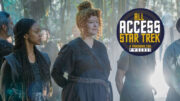
Podcast: All Access Listens For “Whistlespeak” With Commentary From Mary Wiseman Of ‘Star Trek: Discovery’
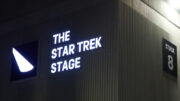
Toronto Stage Used For ‘Discovery’ Renamed “The Star Trek Stage” By Pinewood Studios
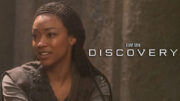
Preview ‘Star Trek: Discovery’ Episode 506 With New Images. Trailer And Clip From “Whistlespeak”
It’s a good stand-alone ep. It proves you don’t need bad guys chasing for the same relics. I realized how unnecessary they are.
I echo that sentiment, big-time!
The best Trek is without “bad guys”. Always has been. Too bad modern writers don’t get it. This was a gem of an episode.
Great episode i really enjoyed the slow pacing of it and i always like a episode involving a trip to a pre warp society.
It’s great that they have gotten 4 of the 5 pieces of the puzzle already and not leaving it to the penultimate episode.
I do agree with the review that it would be nice to see the rest of the scientists and i hope when they do find the Progenitor Tech we find get some form of flashback with the scientists finding the tech.
I really like it when NuTrek references Enterprise.
What do you mean, exactly? I didn’t get get it
Possibly he’s referring to the Denobulans.
This is like the trill episode. A lot of other stuff happens with a minimal plot advancement. I’m ok with that, if it’s interesting. If you’re going to recycle and re-use tropes, it needs to be interesting. This was largely, not. I found it more interesting than the Trill episode, and I loved the delivery of the message Burnham gives at the end. That why I found this episode better than that one. But still wasn’t all that great.
I was bored rigid. This is what happens when you take 45 minutes of plot and stretch it out over 10 episodes.
I finally started watching Slow Horses on the weekend – and ended up binging all three seasons this week.
Six 40ish-minute episodes a season, no filler, complex plots and solid characters, writing and acting.
I wish Trek could pull that off.
Great show.
This is my main problem with it, yes. I loved episodes 1 and 2, but from after that it started going downhill for precisely that reason: because there’s not much of a story here. So we get a whole lot of filler scenes, scenes about people being unsure of themselves (this must be the most emotionally fragile crew in the history of Starfleet–it’s getting kind of ridiculous at this point), and minimal plot advancement. Meanwhile, all the focus is on Action Hero Michael every single episode, with Saru, Stamets, the entire bridge crew, and Reno doing almost nothing all season. Tilly has had more to do this season, which is great. But other than Michael, Book, Culber, and Saru, everyone else has done almost nothing since season two. I really wanted to like this season, and when it started I very much did. But it’s going nowhere fast.
You nailed it.
Wow you said everything I been thinking too. The season is feeling more and more flat and the characters outside a few of them just has nothing to do.
Started off great but halfway through now and I’m getting bored again because it doesn’t feel compelling enough.
Yeah, they took what might have been a solid four-hour story and turned it into ten hours, and they gave us two entirely lackluster villains. One thing that has been a big problem on Trek for a while now–on Discovery, as well as on Picard–has been utterly forgettable and boring villains. Not one of them has really stood out to me on either show, other than Lorca.
This has been the problem with almost all of these. I go back to, if you’re going to deviate a bit, it’s ok.. but it better be engaging.. better be interesting. With Star Trek, you really have to make the theme feel original. None of that happens here. I don’t have a problem with what they’re trying to do.. I have a problem with the execution of it. And that’s the same problem with most of Discovery for me.
agree. I wonder what the financial upside would be if they had the courage to write the main story they want to tell and film it. This should be the benefit of the streaming platform model. If it’s 5 episodes, it’s five episodes but – if they are a great five episodes, wouldn’t that be better for the franchise than 10 of mediocre quality?
Pssst… not sure if you are aware of this or not. But that was the whole premise of the show from the start. It was… and is… about Michael. It was never going to be a cast show. It is a show about Michael. And that is why she is predominately the focus in the episodes.
Bit behind on this series and just watched episodes 2 and 3 this evening., but Culber had a big part in episode 3 in my opinion. Also it seems to me that Captain Rayner has a big part. It isn’t just the Kirk, Bone, Spock show to me with Discovery this season.
This sounds lovely and wonderful! I think I’ll finally break down and join Paramount+ instead of waiting for the DVD release! (And I’m a Tilly fan, too :)
My least liked episode of the season. It was a filler episode without any meaningful filler.
Yeah they found the next clue in the end but it went sideways at times with Tilly and Culber having some kind of personal crisis that went nowhere. .In my opinion, it wouldn’t be noticed if this episode were accidentally skipped. It is a standalone episode that stands still.
Maybe this show is better if the seasons are watched in one sitting?
Hopefully the next episode will advance the plot more than this one did.
To my happy surprise, I enjoyed Tilly’s involvement a lot. I don’t always like her. But here, I thought she worked well. The rest of the episode? Pointless.
So Betazed is the location for both a red herring AND a real clue? Moll and L’ak are going to be pissed they missed it. I mean, they had to have missed it or they would have had no motivation whatsoever to return to Lyrek.
I think that’s more because the clues left for the Trill episode pointed toward the Trill and not the Betazed clue though too. Although, yeah I’d be irritated too.
Anyone else find it interesting though that whatever they’re making they are finding the pieces right in the order they appear in the circular puzzle?
Seems intentional in-universe; the only way to not start at the beginning would be to luck into a random clue and somehow see it for what it is without the Romulan journal providing context and the official starting point.
Does anybody know why Doug Jones is absent for so much of this season? Was he off making a movie or something? It seems odd that he is not actually in the series that he is one of the main stars of…
This season is peculiar because of the missing regular cast, hard to believe they couldn’t get commitments from the actors unless the show simply couldn’t use them or didn’t want them. I suspect it has something to do with controlling the budget or other contractual issues.
It’s peculiar, I agree. Discovery has become the Michael-Book-Culber show, with most of the characters under-utilized and ignored. That, for me, has been its greatest failing in the past couple seasons, but especially in this one.
Tilly was similarly absent for most of last season. It’s keenly felt because it’s a small cast to begin with. That’s part of my frustration with how they never really promoted any of the bridge crew to be a more impactful and fleshed-out character. There’s been plenty of time to do it.
Doug Jones posted that he was out for most of this season due to Hocus Pocus 2.
Thanks for the information, William. I was going to say it was weird that he chose to be absent from a big chunk of the last season of his show, but then remembered that he did not know it was the last season.
Seems like Hocus Pocus 2 came out waaay before this and that wouldn’t have been filming anywhere close to each other – dates in Wikipedia indicates HP2 was done filming by the time Disco 5 was even ordered
But – time is an illusion. Tea time, doubly so.
This is his Twitter post: https://twitter.com/actordougjones/status/1784136793753042992
He was promoting Hocus Pocus 2 while S5 was being filmed.
That’s not how contracts work, though. If they wanted him for episodes of Trek, he’d have had to skip the press tour. This means they let him out of any contract he had, presumably; which in turn likely means they were find with paying him for fewer episodes.
I agree on the statement about how contracts work and it probably was a cost saving measure for them. There’s also the possibility that Doug Jones original contract for Hocus Pocus included sequel clauses and promotional requirements.
This current era of Trek though does seem willing to let their players go do other things. Saru in Season 5 with Hocus Pocus, Tilly in Season 4 with her play, Bryce for his BET show.
It was a descent episode. And since you guys were discussing what a ‘filler’ episode is on you and Laurie’s (amazing) podcast, I too wanted to say: this is a classic filler episode. Nothing really happened but it was injoyable on its own. Funny enough, I give this one an enjoyable 7, where last week was a frustrating 7.
Some of the repeating things are getting annoying:
- Michael headlining EVERY episode.
- Transporters not working.
- Talking about characters but not showing them (at least here it was an unknown).
I still don’t understand what they’re trying to do with Culber and his so-called spiritual awakening. Like you said, it must be going somewheren, because, what else is the point. I’m juist not seeing (or getting) it yet.
I’m shocked you didn’t mention the perfectly machine-made wooden water bowls by the way. That one bugged me, for such a primitive people.
And I cringed at the Marina tribute, because it was just too on the nose as a literal first name of a person.
By the way, regarding Kovich: there might be a chance he’s from the department of temporal whatsit. Although not the same suit as temporal agents on SNW season 2, it is about the same color.
Yeah, I’ve always assumed Kovich could time-travel, so that’s how he gets the paper.
Correction: The episode happened in and around tower #3, the clue was in tower #5
I only mention that because I read somewhere how nitpicking is part of Trek … :)
I guess the fact that the winner of the race was sacrificed was supposed to be a surprise? When the priest tried to talk his child out of it, and the person Burnham saved talked about how the friend who’d won the race she ran when she was young was dead, I was sure that the winner would be sacrificed. If it was obvious to ME, how did Burnham and Tilly miss it?
I know Burnham decided to break the Prime Directive for what she thought was a good reason, but I’m amazed that she decided to show the priest his planet from space. Wait, once it’s broken, you can go whole hog? There’s no attempt to maybe limit the damage?
I’m an atheist because of Occam’s Razor, and I’m always uncomfortable when Star Trek tries to get spiritual. I grew up on Kirk’s unmasking false gods and tearing down computers who pretend to be gods, so NuTrek’s careful tiptoeing around gods always makes me long for a little Jim Kirk. Apollo’s just an alien with an extra organ in his chest, damn it! :-)
I didn’t even like it when DS9 turned the franchise more toward a distinctly non-Roddenberrian spirituality, much less when Discovery does it. That said, I enjoyed this episode.
The extended impact of Culber’s experience on Trill could have played out in a very cliche way, so at least this is different. I suspect his “new outlook” will have a place in the resolution of the Progenitor tech. It’s also sort of retcon of his rebirth, which never really was “used” properly. So far, I am liking this… and I definitely come to Trek to should down alien gods!
Mankind has no need for gods we find the one quite adequate Captain Kirk
McCOY: We were speculating …’Is God really out there?’ KIRK: Maybe He’s not out there, Bones. Maybe He’s right here …in the human heart. …Spock?
SPOCK: I wish we could have examined that belief of his more closely. It seems illogical for a sun worshiper to develop a philosophy of total brotherhood. Sun worship is usually a primitive superstition religion.
UHURA: I’m afraid you have it all wrong, Mister Spock, all of you. I’ve been monitoring some of their old-style radio waves, the empire spokesman trying to ridicule their religion. But he couldn’t. Don’t you understand? It’s not the sun up in the sky. It’s the Son of God.
KIRK: Caesar and Christ. They had them both. And the word is spreading only now.
MCCOY: A philosophy of total love and total brotherhood.
Kirk or Sisko wouldn’t have asked the dad to open the door. They would have blasted it with their phaser.
Could Kovich be a Supervisor ala Gary Seven and Tallinn?
I was wondering – or a Q?
I think he’s a time agent. His suit is different than the time agent in SNW but basically the same dark grey.
Technically he can’t be a time agent. They said in Season 3 that there were temporal accords that prevented those types of personnel in Starfleet.
Future Guy from ENT
Two ‘meh’ ones in a row. Who Watches the Watchers this is NOT!
Sure, It’s great to see a pre-warp prime directive story again and I liked that Burnham revealed herself in the end to save Tilly and the girl. That’s always a Trek trope and I’m trying to think of any episode where they managed to stay completely hidden the whole time. Anyone have any examples?
But this episode just really lacked for me. Not awful just not very interesting either. It tried but just felt pretty flat overall.
As for finding pieces of the progenitor tech, it’s become pretty formulaic now and very little of a challenge. The clues are all easily found and it’s literally like putting together a Jinga puzzle. It just feels too easy. And Moll and Lak doesn’t feel threatening at all. They are just there so they can have some conflict in the story but it also feels so meh, similar to the Book and Tarka’s ‘chase’ last season.
I know they are trying and want to give us this grand adventure story but it’s still Discovery falling back to the same issues again and again. And this show keeps stretching five minutes of plot into an hour story. I wish I could care more about Culber’s ‘spiritual journey’ but yeah I just don’t.
Anyway four more episodes. Trying to stay positive but sadly I think I’m just back for the show to end. Hopefully things will finally start to ramp up and the Breen becomes a bigger part of the story.
Some great acting and character moments happened throughout this episode. But I was amused that violating the Prime Directive is just a matter of paperwork now.
I also always wonder how Michael and Tilly communicated with the people on the planet. Of course they had their universal translators and could understand them, but the people they were talking to didn’t have them.
I was surprised by the Prime Directive being paperwork too, especially after Rayner seemed to lose his command over what they were considering a Prime Directive issue.
yeah, the prime directive stuff is eye rollingly bad. It’s really there for the exact reasons they violate it in this episode. It’s stupid.
That has always been a problem with the universal translator on Trek. The concept works fine over a comms channel. But as soon as people are in direct communication the concept (as presented on all the shows) kind of falls apart, especially if only one side of the conversation even has such a technology.
I rewatched the Enterprise Incident a few weeks ago where Kirk sneaks onto the Romulan ship and fully disguise as a Romulan but oddly talks to everyone in English. Seems like that would be the biggest giveaway he’s really not a Romulan lol.
Yeah it’s always been a problem from the very beginning. The later shows have tried to find ways to explain it a little better but I don’t remotely buy you can just pretend you sound like a native speaker when A. You just met a race for the first time and B. That they wouldn’t know you’re speaking through some device.
Forget pretending it can just deduce an an entire new language after hearing a couple of words. I don’t buy that regardless the century they are in and it happens on every show.
Sure it’s a stretch that a computer can decipher an unknown language after a few words. But at least it’s technically easy to swap out audio during the transmission. It falls apart when people talk to each other directly. Unless you assume they have a chip implanted in their brains that intercepts the nerve signals from the ears. Plus another chip in their vocal chords that translates outgoing speech. The universal translator exists so that we as the audience don’t need to read subtitles, the actors don’t need to learn made-up languages and the plot doesn’t have to come to a grinding halt each episode while the characters learn how to communicate. Having the universal translator fail and dedicating an episode to showing how people actually figure out how to communicate is interesting from time to time but the majority of the audience would probably grow tired very quickly if this took up substantial time in every single episode.
Of course I get all of that. I was just agreeing how it sometimes make no sense in the story itself. But it’s all fiction and most of us just accepted it at this point.
I am thoroughly enjoying this season of Disco. Possibly because I am not hunting for anything and everything to criticize. Among other things, I think it is nicely balancing the slower pace of a serialized format while also having more episodic stories. It reminds me a lot of DS9 in this regard without having as many episodes per season to work with.
I am also interested in how well they will explore the topic of spirituality, another commonality with DS9. Although in the end I don’t think DS9 quite succeeded in this because the viewers could just dismiss Bajoran Faith as ignorance of the “true” nature of “The Prophets” as “wormhole aliens.”
Looking forward to see how it all turns out, though I wish this were not the final season as the series really seems to have hit its stride. But all good things…
I thought it was “ok.” Definitely tried to be a more traditional Star Trek episode, but I often feel when Discovery, and to a lesser degree Strange New Worlds, tries to do traditional Trek it just feels shallow. Like they are following a recipe to the letter but not adding any of the zest that really makes it stand out. I was also confused why they made such a big deal of the “whistle speak,” and then have it play almost zero role in the plot. Finally, it was really convenient that Michael and Tilly just happened to arrive at the exact perfect time to join the race to enter the temple. I wish I could master the art of perfect timing so well :-)
I though it was pretty clear that the young woman wanted to become and adult and requested the race because she thought she could beat “foreigners” in the race.
But I also thought it was going to become a battle to the death. They never went that far – only starving their competitors!
Ah, could be. I plan to watch it a second time and will look for that… thanks!
Making the race a battle to the death doesn’t really make sense because the winner of the race was actually going to be sacrificed.
I would like some Saru, Owosekun and Detmer now please.
I’m sure they’ll show back up at the end with a refitted ISS Enterprise.
The music in this episode was outstanding.
Is it now a Star Trek trope to show a member of a pre-warp society a view of their planet from space?
Whistlespeak is about caretaking.
Did this week’s episode begin a deeper, exploration of what this all could really mean? Power? Responsibility? Her trepidation is a nice way to end the episode.
I’m in love with the whole idea of sound as language. I wanted SNW’s musical episode to be totally like what we see in this episode – so it was a nice kick for me to get a taste .
That Denobulan’s name Hitoroshi Kreel….Hoshi Sato. Why do I feel like that might be another Enterprise reference?
47 comments so far. Discovery is quite the barn-burner! ; )
Maybe people are just annoyed by all the whining that people post in here.
People keep saying this and yet so far this has been generally a very positive season so what are we missing??
Even this episode, while more divided there are just as many people who liked it as many who didn’t (and unfortunately I am in the latter personally). Actually I would probably say more liked it than didn’t.
This idea that its been nothing but constant hate this season is not remotely any basis in reality. Most people seems to be more positive than negative over it. The real possibility seems to be many have just stopped caring in general as there is a lack of discussions everywhere online besides here and probably why the lack of postings this season.
I’m not sure what you’re reading, but it’s been nothing but negative comments from season one. People are sick and tired of the same comments over and over again. I know many people have stopped commenting due to this. But would be interesting to see what the site traffic numbers are and to see if the site traffic is gone down or just the comment section. It’s honestly the same people saying the same thing over and over and over… Yawn.
The real strength of this season so far is that they have not teased something they cannot deliver. I have really enjoyed each episode without worrying that the characters were going to do something stupid just for the sake of stuffing the plot with action. Seems pretty sad that they are largely “getting it right” and no one wants to celebrate that.
I literally counted the number of positive vs negative posts in the episode 4 thread when someone suggested this and it was 24 positive posts about an episode vs 3 negative ones.
Go back to the first two episodes of the season. Again it was overwhelmingly positive. Nearly everyone liked those. The outliers were the people who didn’t.
I just counted the number of people who were positive about this episode vs the people who weren’t. And I only counted the ones who directly said they liked or hated it.
The people who said they liked it are 13 people. Now some some of those were mixed feelings for sure but if they said they ultimately liked it then it counts. But half of those considered it outstanding. As for the ones, like me, who didn’t like it are 7 people. So again that’s more people here saying they liked it than didn’t correct? So what am I missing?
Every episode this season there has been way more positive posts than negative overall. Yes I get your bigger point people have been putting down the show since the first season which is definitely true lol but it didn’t stop people from talking about the show in droves for YEARS. And your argument doesn’t hold water this season because most people who are commenting seems to LIKE it, right? The minority comments so far are the people who still thinks the show sucks.
And even the people who don’t they are just giving their opinions about it and not attacking or challenging anyone who DID like it. That’s actually one thing I have been noticing about this season and there isn’t a lot of infighting about the show. Again look at this thread, besides me and you lol, who is arguing about it? There is no big debates or people being triggered. The people who said they liked it aren’t being challenged over it no more than the people who said they hated it.
Isn’t this is what we want on a message board? People being civil and not attacking others? And one such troll was finally banned here a month ago who IRONICALLY kept attacking anyone who was being negative about the show and turning everything into a ridiculous fight in every thread; so that probably has helped the civility here a great deal now he’s gone regardless of your personal thoughts about the show.
So I don’t remotely buy this argument. The reality seems to be a lot of people have just moved on from the show in general. When you look at the level of discussion about the show in its first three seasons vs the last two the gap is very obvious.
Again maybe many people are still watching the show. Unfortunately we don’t have any data on that. But we know how this works when people are passionate for a show on the Internet it’s very very easy to see everywhere.
Picard season 3 is the perfect example. I went and checked how many posts its episode 6 got here (since this episode 6 of this season) and it was 450 posts and that was just a year ago. And people slammed season 2 like no one’s business lol.
I don’t think this season has even gotten that many posts if you combined all the episodes.
I’ve also said this before as well and the show had been off the air for two years now. Yes we’re used to seasons having longer gaps these days but that’s still very long even for today and a lot of people could’ve just moved on or lost interest.
“Again maybe many people are still watching the show. Unfortunately we don’t have any data on that.”
Actually I have to correct myself on that because I forgot Paramount+ is part of the Nielsen ratings for streaming. But I have no idea exactly how in-depth they make it publicly. I only know how well a show is doing here when this site reports it.
And maybe Discovery will enter the top 10 this season. Now let me make this very very very clear, even if it doesn’t it doesn’t mean the show is failing in terms of views obviously. When there are 200 streaming shows these days and many on much bigger sites to boot it’s a miracle for any Trek show to be in the top 10 lol. And those listings are very skewed in my opinion since the only ‘top 10’ list we ever see are original shows. So while I’m happy to see Trek on any top 10 lists it still doesn’t tell us the whole picture just much these shows are truly being viewed.
And Paramount+ still avoids releasing any numbers independently unless a show is huge like some of the Yellowstone spin offs.
“Every episode this season there has been way more positive posts than negative overall.”
Hmm, maybe that’s the real problem and it’s all the negative and bitter haters that just finally left haha.
But don’t worry I still show up as much as possible! 😁
I’m teasing I’m actually enjoying the season for the most part but agree I think most people just lost interest. Obviously the people who always loved it are probably still devotely watching but it is probably the fence sitters and the people who always hated it who ultimately moved on which would make sense.
And I have seen people say they just have no interest to watch the show week to week anymore after being burned every season and just plan to binge it when this season was over. I even remember reading you were thinking of doing that so that could be another issue.
“Isn’t this is what we want on a message board? People being civil and not attacking others? And one such troll was finally banned here a month ago who IRONICALLY kept attacking anyone who was being negative about the show and turning everything into a ridiculous fight in every thread; so that probably has helped the civility here a great deal now he’s gone regardless of your personal thoughts about the show.”
This is really is the biggest irony out of all of this. A lot of these comments section does get inflated when you had people like that guy being triggered all the time, making the same 20 posts a day over anything he didn’t like (how many times did he utter the phrase ‘ROTJ’ in every Picard post 🙄) and literally went on constant tangents how people here were just coming here to drown the boards in hatefests?
Instead that lunatic was removed and ironically this place has been the most relaxing in years lol. The very fact as you pointed out no one is spending time arguing with others over their opinions is another reason there are fewer posts because no one cares anymore lol.
I think everyone just resigned to the fact the show is now done and everyone’s views are baked in so what’s the point arguing over it anymore?
And when you remove the disruptive people who wants to act like insullen babies like that guy and Alpha Predator, REGARDLESS how they feel about a show, good or bad, surprise surprise you get a more civil and balanced discussion and board now.
Yeah … shocking! 😉
“And I have seen people say they just have no interest to watch the show week to week anymore after being burned every season and just plan to binge it when this season was over. I even remember reading you were thinking of doing that so that could be another issue.”
Yes this is possible as well. In fact another member here said they were thinking to do just that after they watched the first episode of the season but didn’t like it.
And yes I too was considering it because of just how bad season 4 felt by the end. I was even thinking of doing the same thing with Picard season 3. But once I heard it was the final season (and Picard was bringing back the TNG cast) it’s no way that would happen. And I don’t know if I would’ve done it regardless because I have zero willpower lol.
I guess I’m just surprised because I really expected the opposite for three big reasons. A. Being the final season of course. B. Being so closely connected to a big and popular TNG episode and C. The early reviews were solid.
So I just thought it was going to be a big party lol. Not at the level of Picard season 3 but at least at the level of SNW.
But instead of a party it feels more like a funeral. Or maybe someone on their death bed is a better morbid term lol. Just sorta here waiting for it to end and not really hyped up about the season.
As far as your last point, agreed. No matter what these boards have been a lot more fun and relaxing to write on.
I have said it before in the past it is really strange the lack of discussion around this season. Outside of this site I also post on TrekCre as you know and Reddit (but under a different handle there) and it’s obvious how much the discussions have fallen off at those places too. It’s not a lot of people at TrekCre so the posts were already less but the more popular stuff like Picard and SNW still got decent traction. It just doesn’t feel the same way with Discovery this year and I post there a few times a week as I do here.
Reddit it’s very obvious though. There are times you can’t even view all the responses because there was so many especially the first few seasons. Now it’s much more manageable.
It is a little disappointing because this will probably be my favorite season (that’s not really hard though lol) and like you I expected to see a lot more debate and discussion considering we’re dealing with such a big storyline.
But I imagine the audience has peaked for this show years ago and it’s just the hardcore mostly watching. There is no hype for it outside the usual places like here.
Good for you. You counted the comments the last couple of episodes. What about all the past seasons? Have you gone back and counted all that? People just don’t want to bother with all that negativity. It’s like the movie BEYOND, a far better movie than INTO DARKNESS. But less people went to see because they felt it would be bad like ID. Same thing here. Because of all the negativity last season in the posts, less people are reading and posting comments. Like I said, would be interesting to see if the traffic on this website reflects the comments. My guess, the same amount are hitting the page but less commenting. And the ones that are commenting, are the same usual suspects. People can’t be bothered reading the toxic comments spewed towards the actors, the writers and the producers. Same old blah blah from the same old people. Yawn.
I’m going to say it again.
A. This is NOT the only place that has less discussions. I keep saying this and it keeps getting ignored lol. This is across the board. A great example is Reddit. It’s easily the biggest Trek board. Until this season most Discovery threads had 600+ posts when an episode review was posted. Now most of them are under 500 which is not horrible but it already tells you a huge gap Discovery has when you compare it to the bigger shows like Picard and SNW which easily goes into the thousands. It’s the same with TrekCre, Trek BBS, etc. The show has less people talking about it these days.
B. Your logic doesn’t make sense because if the more negative posts drove away the more positive posts then why are there still more positive posts?? And literally on every review thread. How do you derive at that conclusion if more people are actually saying nice things about it? Wouldn’t it be the opposite then? Or at least a bigger subset of those posts? Help me out here?
C. I have been saying these boards have been negative since 2009. You just made the point for me with STID. That time was brutal lol. Way worse IMO because there were so many more people at the time.
People go on and on about how much hate Discovery gets here but very few threads ever went into the THOUSANDS of people fighting over it like what happened with STID… for years after it came out.
But you’re also right yes less people discussed Beyond when that came around but I don’t think you can blame that all on STID either. I think people grew tired of those movies in general and Beyond just didn’t grab people on its own (and had a HORRIBLE marketing campaign), hence a big reason why it bombed. I don’t think you can blame this board for that lol. In fact I think less postings was simply an reflection that less people had interest in the movie in general and its box office indicated that.
I’m saying the same thing has happened with Discovery. It’s not just ONE thing. I do agree that the negativity has maybe driven some people away. I also think the show itself has driven people away too for those people really unhappy with the last few seasons. It CAN be both right? Just like what happened with the Kelvin movies.
D. How is it any different than all the derision Picard got in it’s first two seasons? And yet season 3 had the highest number of people posting probably simce STID. And most people seem to think season 2 wasn’t just the worst season of that show or even NuTrek but one of the worst Trek seasons ever.
It didn’t stop anyone talking up season 3 to death and not everyone loved that season either.
You can repeat it until you’re blue in the face. Whether it is hear or on other boards… The same repetitive negative people here are the same repetitive negative people on other boards. People are tired of hearing the same drivel no matter where you go because it’s all the same people.
Do you actually believe that people don’t go to multiple platforms? Come on. People are mean. People are arrogant. People are negative. It’s repetitive drivel.
My logic makes perfect sense. And I would put money on that the traffic on the site hasn’t dropped. The articles are still good. Fans want to read them. But people just don’t want to deal with the same crap all the time. How many times does Emily have to say how much she hates nostalgia and legacy before you are sick of hearing it. How many time does Lorna have to slam Martin-Green’s acting and “whisper speaking” before you get sick of it? And the list goes on. Blah blah blah over and over.
I’m going to repeat myself. How come the last season of Picard didn’t get the same problem? You can admit season 2 was blasted as much as season 4 of Discovery was right? I think even worse. It didn’t stop anyone from talking about season 3 in droves.
And I seem to recall others still repeating themselves who still hated that show too.
As far as Discovery It’s probably a show that has been falling in the ratings awhile, hence it’s cancellation before season 5 even aired. My guess has always been by the end of season four a lot of people had simply stopped watching it because there were people, some on this very board, said they stopped watching it lol.
Again it CAN be both things right? Yes you can be right but what’s weird is you seem to acknowledge a lot of the negative feedback but you don’t acknowledge that maybe many of those same people have simply stopped posting or watching on their own as well.
It IS possible right?
I mean the show is now halfway over. There has not been a single article ANYWHERE discussing the metrics of the show. Not one press release by Paramount that the show is hitting any admirable numbers even if they don’t tell us what they are. This is the one frustrating thing about the streaming era.
And maybe it’s really doing great but the deafening silence is telling.
So I’m going to say it again could you be right, yes. Is that the ONLY reason though, no I don’t think so. Not by a long shot.
But listen if you really feel that way fine. But I’m also the SAME guy who has been begging for an IGNORE BUTTON more times than I can count. I get accused of saying the same things over and over again too and believe me I have said that the most out of everything else lol.
Personally I don’t have an issue what people say here but yes I am sadly more on the negative side of Discovery. I don’t WANT to be but sadly yes although I am still liking this season, but it’s starting to lose me.
I’m not just talking the negativity about Discovery… I’m talking about the negativity towards Trek in general ever since Discovery debuted…all all the shows thereafter. It’s too much dude. Way too much negativity towards Trek in general now. It’s fine to dislike a show regardless if it Discovery, SNW or lower decks… But coming on and slagging the shows ENDLESSLY is tiresome. You even have people PRE-hating the academy series before it’s even shot! Mention section 31 and you get the “space Hitler” people coming out of the woodwork. So no, it’s not just the hate of Discovery, it’s the constant hate of everything new. So that’s why people don’t bother. Enough already.
Which I LITERALLY said has been happening here since 2009 did I not?
Look I don’t know what you want me to say but this isn’t a new thing. We obviously agree on that lol.
Same time though we just have different philosophies on it. I have no problem of people saying whatever they want AS LONG AS they don’t attack others for their opinions or try to argue with them over everything because they don’t like their opinions and trying to shut them down.
And yes that has happened PLENTY of times here but thankfully those people have mostly been banned.
But outside of that this is how message boards operate. People are abandoning this site NOW after nearly 15 years of negativity? What took them so long lol.
And dude I’ve asked you this three times now if that’s the case then why did season 3 of Picard get so much fanfare then? Or season 1 of SNW?
Again I get what you’re saying but you seem to discount all the times fans are generally excited and positive about things here. It’s not all bad all the time INCLUDING with Discovery. Whenever they like something about it people shout it from the rooftops. Remind me how we got SNW again?
I remember having this SAME discussion with TG47 (another guy who looks like took off for good and yes probably due to the negativity) when he complained about people being too negative over SNW. I didn’t see that at all because the MAJORITY of people liked the show, but they still pointed out some of its flaws as they should.
I guess I just don’t know what people expect? Do you seriously just want to come to a board where everyone loves every show only say glowing things about it? OR are you saying that these shows don’t have any flaws for people to be that critical about? I don’t think the answer is yes to either of these questions, so what is the answer.
All I can say is I remembered waaay back in the 90s when fans were crucifying Berman and Braga saying that Voyager and Enterprise were horrible shows, DS9 was a slap in the face to Gene’s ‘vision’ and Nemesis were so bad it killed the franchise.
I didn’t see any of that on this board because it didn’t exist then. But I saw it in plenty of places. And it went on and on until Enterprise was cancelled. Doesn’t mean everyone felt that way(I personally loved DS9 and VOY from the start; no comment on Enterprise or Nemesis;)) but none of this is new bro. It’s been going literally since TNG first aired to be honest. We just didn’t have the Internet then to wallow in the hate lol.
Oh there was a lot of hate going on for Picard season 3. All the people complaining about it being nothing more than nostalgia. Saying the writing was crap and so on. And there were a lot of criticism about SNW and how it doesn’t look like it’s before TOS and how come the Enterprise looks like potato peeler. And so on. Yes, people are finally tired of it. Frankly, so am I. I have actually stopped going to other boards for that very reason. Why wait until now? Well it’s because there were literally years… YEARS… between Trek 2009, ID and Beyond. Barely anything happened on the boards. I actually thought the site would close. Now, with so much continuous Trek and Trek news, you see the whiners and complainers and haters so much more. Back during TNG and the TNG movies, DS9, etc… the internet was as it is now. You would barely hear anything from the fans unless you were at a convention. People were buying magazines and read those articles. So you didn’t see the hate and negativity like you do now. It’s so easily accessible. Anthony, if you are reading, what are the site traffic numbers like? Is there a decline like in the comments? Or are the numbers stable with only the comments dwindling?
Ok I get your point. I guess I’m just decencitize to it lol. But as I said I’m not as bothered. For example I loved season 3 of Picard. It’s my favorite season in NuTrek in terms of live action at least. It brought me back to a time where Trek was very special for me.
But same time I read all the same criticisms as well it was too much nostalgia, a lot of memberberries etc. And I didn’t really disagree with that sentiment but didn’t have any real issues either. I understand people just have issues with the show and I had a few as well but more minor.
Same with SNW, I generally think it’s a good show but I get the criticisms for that one too especially the canon ones which drives me crazy lol. But that’s why we come to places like this, to hash out stuff out with fellow fans. If others are getting triggered over it because some of is just want to discuss these things then OK but this isn’t the place for them obviously.
And no maybe it wasn’t as in your face in the 90s because obviously the Internet as big as it is now. Social media didn’t exist. I always remind people YouTube started the last year Enterprise was on. But still there were PLENTY of places to talk Star Trek and by the late 90s it became very negative by then. It’s worst now in terms of much is out there but the vitriol was still pretty bad. Type in Berman’s name on this site and you will see it here circa 2007 and on.
But if you need a break for awhile certainly understandable.
Even if there was hate for Picard season 3 it wasn’t the majority who felt that way, far from it and tons of people still discussed it. In fact the sole reason I joined this board was to just discuss that season. I really planned to stop posting here once it was over. But hardly anyone is discussing this show this season which is odd since most who is watching it at least seems to like it.
And I used to be a huge NuTrek hater. Guilty as charged lol. I had no problems being cynical about it because we are now paying for these shows full time and the Internet is the place to vent and debate this stuff. No one I know in real life outside 1 or 2 people knows these shows exist much less watch them. Oddly Star Trek feels more niche today even though there is so much of it on right now.
But anyway these sites are the places fans come to be honest about their thoughts. I was very disappointed with JJ verse, Discovery and especially Picard and have no problem saying so. But I didn’t want to hate any of them but overall they all been mostly disappointments. Obviously not just to me but a lot of people. I will say the JJ movies were more popular with newbies but clearly not enough cared after awhile and why Beyond ultimately failed but that’s a different thread.
As far as the shows themselves I have been open-minded about all of them and oddly they always started off strong but end in a winper.
But even that has changed since I love he animated shows out the gate and SNW finally feels like 90s Star Trek again which a lot of people like me was missing.
Now oddly I’m on the other side of it and considers myself a NuTrek lover. Who knew that was possible lol. But it proves I was never out to hate anything; it just sucked IMO.
Like I said I’m even enjoying Discovery now, my worst show in the entire franchise. But I understand if others still think they are bad and just want to vent. I can’t be a hypocrite about it. If I could get online and spew why I thought shows like Discovery and Picard were total trash then I have to allow others say that about shows I truly like like SNW or LDS.
That’s how it works right? I believe message boards are here to hash everything out regardless my personal feelings about it. Some people oddly can’t seem to understand this basic reality when they decide to join a board and that’s why they get banned or everyone hates them; not for their opinions but constantly trying to censor others over theirs.
Sure you may be right and people are sick of the negativity. But we’re Star Trek fans, this is how we usually roll! 😂
But yeah I get it it can feel too much at times but I’m actually with Tiger2 on this one most people seems to be a lot more positive lately. The last year has been really fun to talk about Star Trek thanks to LDS, Prodigy, Picard season 3, SNW and now even this show. Of course there will always be naysayers but they don’t overrun these boards either. It’s not YouTube lol.
Amazing episode again. This season the show is just knocking it outta the park! Wish it wasn’t the last season.
Admittedly this is kind of a paint-by-numbers Star Trek episode, but I enjoyed it quite a bit if largely for Tilly’s charisma. I do find the ongoing Culber existential crisis a little off balance, feels like we’ve already been here before with him after a far more significant event. But I do like aspects of his crisis, especially the tug between the scientific and the spiritual and how that’s expressed in his conversation with the analytical (yet caring) Stamets. Like much of Discovery’s writing, the story does take some logic shortcuts that I find distractingly convenient, but at least it fills in most of the gaps. On a side note, although I have a very high end sound system that sounds phenomenal with most streaming content, Discovery has uniquely terrible onset audio, it’s been a constant problem for the show (and seemingly all Toronto-based productions), but this season is by far the worst. It’s making it really hard to understand every word being spoken, I’m constantly rewinding to listen again and I just straight-up miss things all the time because the voices are often garbled.
While I certainly did not dislike this episode, I still found its resolution to be kinda lacking. It left me wondering whether they couldn’t have found a way to bend the Prime Directive instead of outright breaking it (even though, arguably the DISCO-crew weren’t the first to do so but rather the Denobulan scientist who installed those weather towers in the first place). It seemed like they just took the easiest possible route there… Also: Why was the episode even called “Whistlespeak”? Was there any sense in introducing that culture’s whistle language at all? I was honestly flabbergasted that there was no mention of such means of communication actually existing on Earth (on the Canary Island of La Gomera) and it existing on that planet could’ve been a nice setup for another linguistics-centered episode (not necessarily another “Darmok”, but maybe something akin to SNW’s “Children of the Comet” – you know like, a linguistic problem interwoven with a bunch of other problems). However, upon closer inspection, the whole introduction of that concept just went absolutely nowhere. A bit of a pity if you ask me.
Loved this episode. Very smart writing and continued with a great pacing. It had quite the TNG feel to it as well as feeling like a really Star Trek-y episode.
Really loving this season. The writing has been very solid as has been the acting.
For how much I dislike this season, I must admit this was actually a good episode to watch. As usual too many shared emotions, but the plot and the story was enjoyable for once.
I know I have mentioned this before but the dearth of posts this season is really surprising.. It’s the middle episode of the final season and its barely gotten 60 posts so far after a day. And again this is not TM alone. The show has lacked discussion everywhere and nowhere close to the kinds of discussions SNW season 2 and especially Picard season 3 got.
Maybe its getting more viewings than the discussions themselves are suggesting but if not it’s probably was a good idea to end the show after this season. I think a large part of the fanbase have simply moved on.
Yeah, I was curious about this and went back to check. Each recap/review article for SNW and Picard got hundreds of comments.
Yeah! And to be more fair I went and checked how many views those shows previous seasons got in the seasons run to correlate with the current episode of this season and for episode 6 Picard season 3 had 450 posts (which is pretty insane lol). For SNW season 2 it had around 240 posts which to be fair is the more common number for most live action shows.
Picard was more of an outlier for the obvious reasons. But then again it’s also PROOF when people are excited or passionate about a show or season you see it reflected.
It’s not nearly the same for this season. Many seem to like it overall and I include myself in that even if I’m starting to feel more mixed about it, but no one is really jumping up and down about it either.
I noticed this as well, engagement is very low which I suspect is reflected in the viewership. Part of this is probably the long 2-year hiatus and the cancellation, not to mention lack of promotion. This season also seems to lack a hook like the previous season, I know my interest was very low because I felt this story had been told and there really was nothing noteworthy this time. However, this season has been significantly more interesting than I expected because it’s so smart about its canon, for once! I’m really enjoying the work put into building this world and telling a story within the Star Trek mythos.
I think you nailed it. Viewership is just probably much lower these days which shouldn’t be surprising since they cancelled the show lol.
But ironically this is the most I have enjoyed the show so far and that’s probably because they are really embracing canon these days. I love we have the Breen back finally and I have loved how they dived into stuff like the Dominion war, Trill mythology, and the Progenitors. Every episode has been a link to old school Trek connections like how this episode linked the Denobulans (would’ve been cool if we saw actual Denobulans though).
It hasn’t all been winners like the Mirror universe stuff and the ISS Enterprise connections felt really weak and shoehorned like many have said; but I still applaud them for the effort. But overall it sadly doesn’t feel like many people care anymore. I remember how much fun it was here and other places to talk about Picard season 3. There was real excitement about it.
Oddly there is none of that here this season. People seem to like it, comment what they like but no real exchanges about any of it. I think the two year wait including how disappointed people were with last season just made the reception to this season feel very ho hum so far. I can’t believe it’s already passed the halfway mark.
It actually reminds me how Beyond was received. It came out, most people, at least old school fans, seem to at least like it (it’s my favorite of the three) but it was obvious the hype was over because no one really talked about it much after the first few weeks after it came out. And of course it bombed which was more odd because it was a decent movie but a lot of Trekkies and newbies had moved on.
This feels very similar.
That’s a good comparison. I liked Beyond too, but sometimes even I forget it exists.
Also, I wonder if Culber’s holo-Grandma is going to be the medical-holo on Academy. This seems like a perfect set up.
This one reminded me of first couple seasons of Enterprise. Not because of the Denobulan references but because it was uninspired, pointless, and painfully boring.

Giant Freakin Robot
Star Trek TNG Nearly Cut Off Wesley Crusher's Head In The Best Episode
Posted: May 1, 2024 | Last updated: May 2, 2024
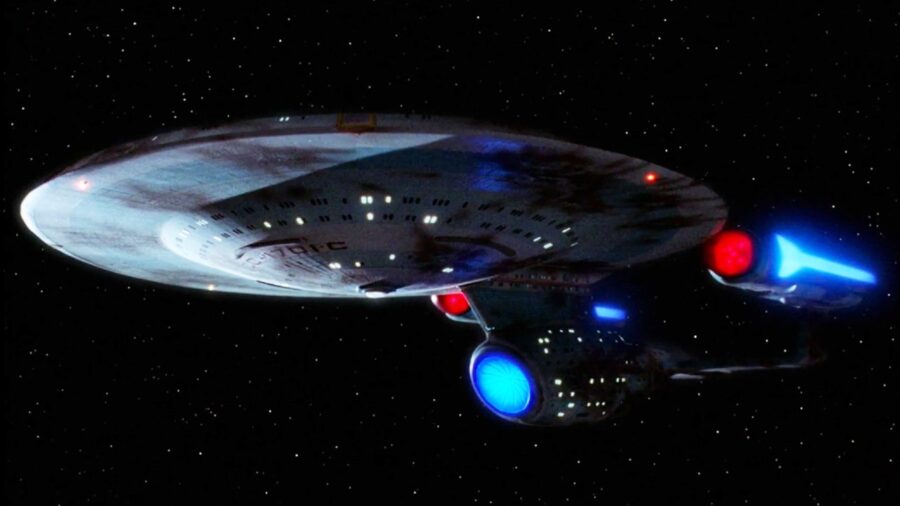
Star Trek TNG Nearly Cut Off Wesley Crusher’s Head In The Best Episode
The Star Trek: The Next Generation episode “Yesterday’s Enterprise” has been a fan-favorite for over three decades. This tale of an alternate-universe Enterprise-D crew allowed the writers to get really nasty with our favorite characters, including showing the gruesome death of Commander Riker. It could have been a lot worse (or, depending on your perspective, a lot better), though: if the producers had more time and money for this episode, we were going to see hated character Wesley Crusher get freakin’ decapitated.
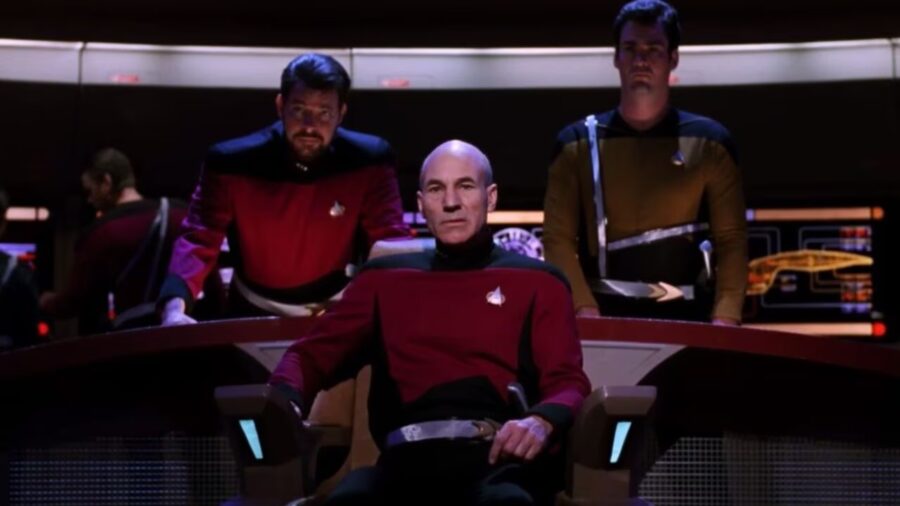
Yesterday’s Enterprise Was Going To Be Crazier
For this crazy story about “Yesterday’s Enterprise” having more death and destruction, we’re going to have to travel back in time and explain the basic plot. This episode kicks into high gear when Captain Picard’s crew detects a vessel coming out of a nearby temporal rift. While it goes unnoticed by the crew, audiences see an immediate change: the Enterprise bridge is now darker, the uniforms are a bit different, and (most shockingly) deceased officer Tasha Yar has replaced the Klingon Worf.
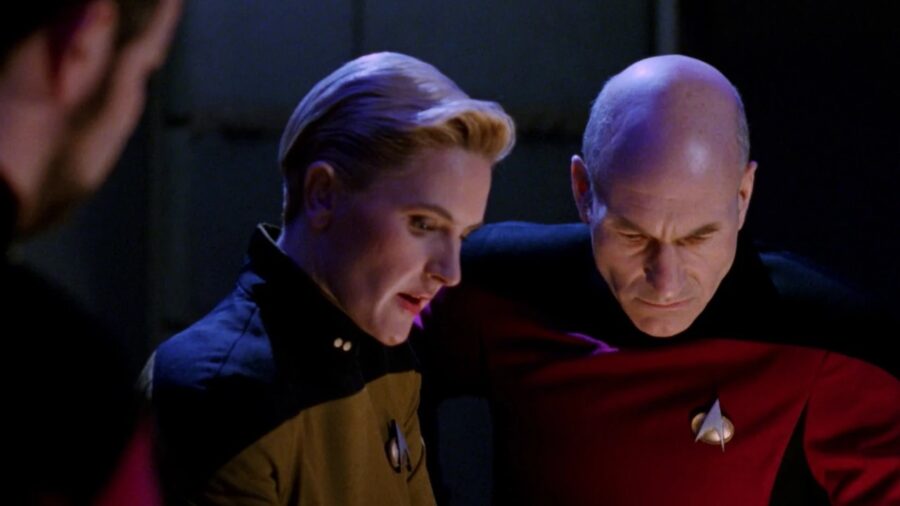
Fateful Choice To Save The Future
We find out that the ship that came through the rift is the Enterprise-C, a vessel that was destroyed by Romulans while trying to respond to a Klingon distress call. Their heroic sacrifice led to peace between the Klingons and the Federation but now, Starfleet is rapidly losing ground in a war with the Klingon Empire. “Yesterday’s Enterprise” largely focuses on whether Captain Picard is willing to save the future by sending the older ship’s crew to certain death in the past; Tasha Yar joins the Enterprise-C on its suicide mission, and the climax of the ep is one of the coolest moments in Star Trek history.
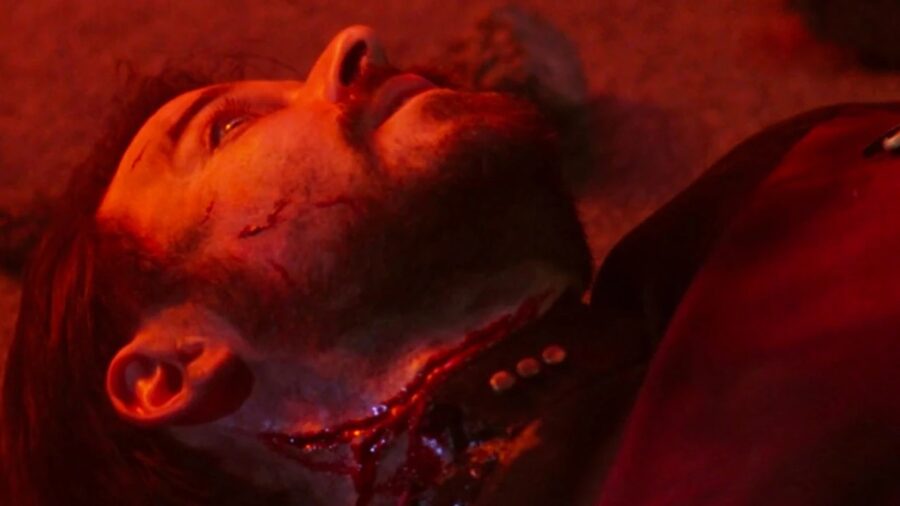
A Shocking Death
The Enterprise-D must defend the older ship as it slowly makes its way through the rift, but this is made more difficult by the arrival of three Klingon battle cruisers hungry for blood. Soon enough, the wounded Starfleet vessel is experiencing an impending warp core breach, and Picard has to take over at tactical after Riker (who had previously replaced Tasha Yar) gets killed. It’s genuinely shocking to see Riker’s dead body with blood pouring from the neck, but it turns out that he was originally meant to be only one of the brutal “Yesterday’s Enterprise” deaths.
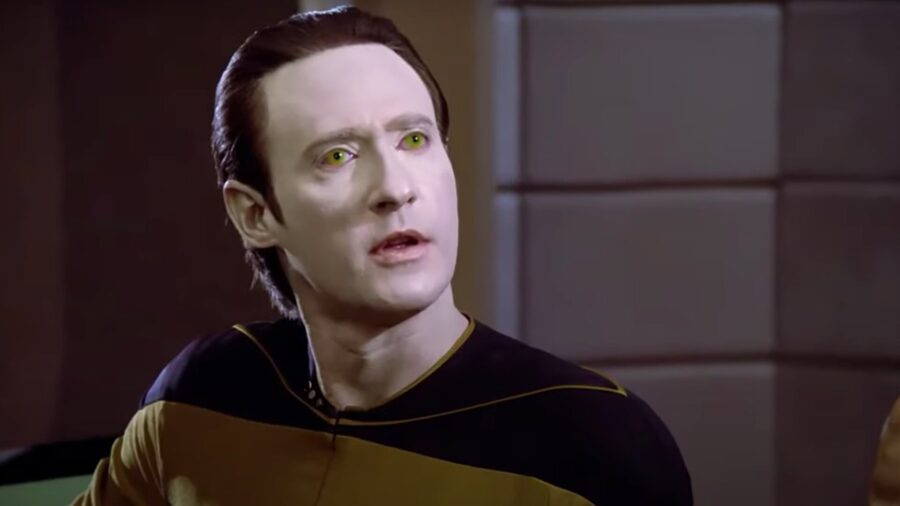
More Deaths Were Cut
Because reality is eventually restored by the end of the episode, producers wanted to originally fill “Yesterday’s Enterprise” with more shocking deaths. One such death was quite literally shocking: if the show had the time and the budget, we were going to see the android Data get fatally electrocuted. Considering how often the crew gets zapped on this show and survives, I can only imagine how over-the-top this electrocution scene would have been.
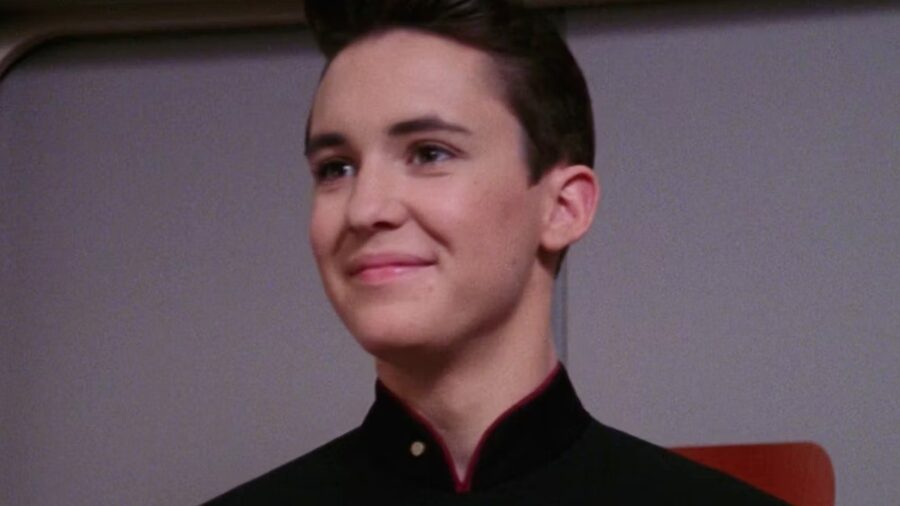
The One Death Fans Wanted To See
However, the intended “Yesterday’s Enterprise” death the fandom would have most wanted to see was that of Wesley Crusher. Created more or less as Gene Roddenberry’s self-insert character, the precocious boy genius character annoyed fans from the very beginning. Originally, this episode was going to show Wesley decapitated by the Klingon attack before he was made whole when the universe restarted.
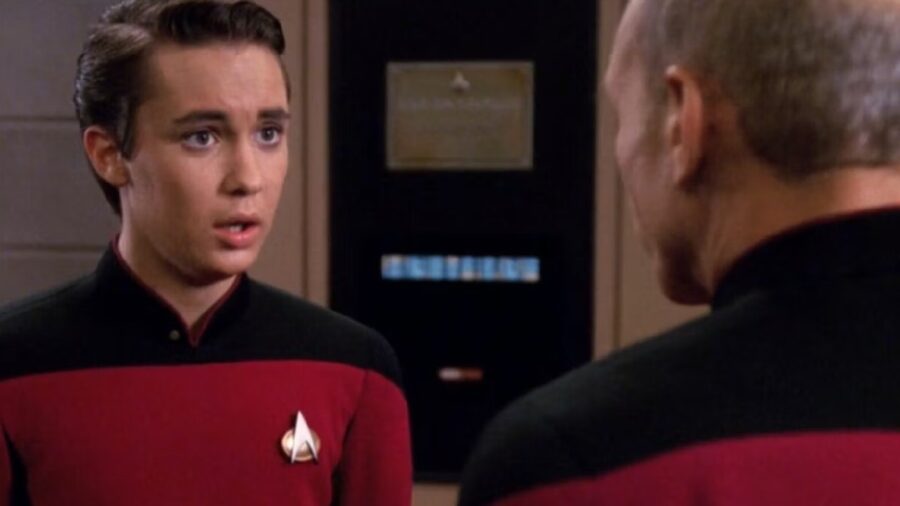
Fans Were Denied
It’s not clear how graphic this “Yesterday’s Enterprise” death scene would have been, but considering how much blood comes out of Riker’s neck, I think it could have rivaled “Conspiracy” for the level of gory violence. Sadly, we were denied seeing this moment onscreen, so you’ll just have to imagine Wesley getting a Highlander-style death. Just think: if a Klingon were to cut off his head, the lopped-off head of boy genius might have had just enough time to blurt out a cool final line like “I’m shutting up now.”
More for You
NATO Ally Issues Stark Warning of New World War With Russia
10 million Netflix viewers fall in love with new release in its first week
Trump blames strong dollar for U.S. economy ‘going to hell’
Do I have to pay off my spouse's debts when they die? Here's what you're responsible for and what you aren't after a loved one's death
Why do I wake up at 3 a.m. every night?
Travis Kelce spotted in Louisville ahead of the Kentucky Derby
40 Photos of the 'Lord of the Rings' Cast, Then and Now
Map reveals best places to live in the US if nuclear war breaks out
20 movies where everyone dies
Here's What It Means If Someone Gives You Yellow Roses
Apple Unveils AI Enhanced iPhone 16 with Advanced Features
Suze Orman: 5 Social Security Facts Every Soon-To-Be Retiree Must Know
10 Mosquito-Repelling Plants You Need in Your Backyard
Cave of Crystals: The deadly cavern in Mexico dubbed 'the Sistine Chapel of crystals'
ESPN host slams LeBron James after Lakers fire head coach: 'Take accountability'
The 25 most surprising movie cameos
The New Math of Driving Your Car Till the Wheels Fall Off
Prime Video’s latest thriller series is a hit — and it’s 100% on Rotten Tomatoes
Here is the true value of having a fully paid-off home in America — especially when you're heading into retirement
These 10 colleges may be as good as the Ivy League, according to Forbes
Den of Geek
Star Wars: The Bad Batch Series Finale Ending Explained
The Star Wars: The Bad Batch series finale leaves some big questions out there for fans to ponder. Here's how it all goes down.

- Share on Facebook (opens in a new tab)
- Share on Twitter (opens in a new tab)
- Share on Linkedin (opens in a new tab)
- Share on email (opens in a new tab)
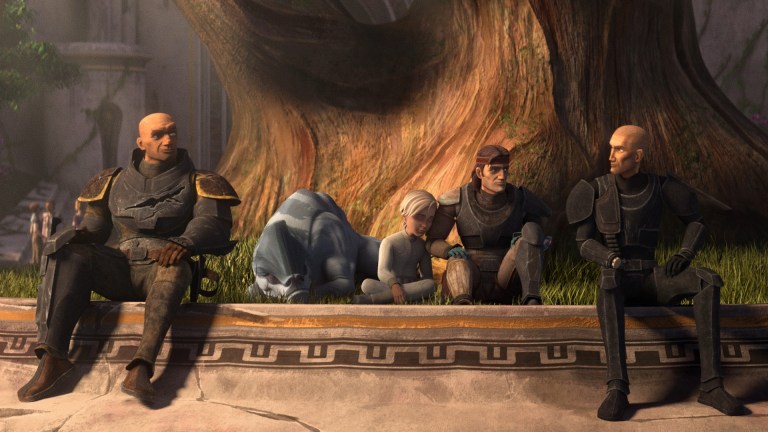
This article contains spoilers for Star Wars: The Bad Batch season 3 episode 15.
After a rollercoaster journey of three seasons and 47 episodes, Star Wars: The Bad Batch has finally come to an end. The beloved Clone Force 99 have hung up their helmets in an epic 50-minute finale that rounds off their stories while also setting up the future of the galaxy far, far away. Things come to a head in the aptly named “The Cavalry Has Arrived,” which serves as an emotional swansong for our titular troupe of outcast clones.
The Zillo Beasts Returns and Tech Doesn’t
All roads lead to Mount Tantiss, and following last week’s cliffhanger ending, Crosshair, Hunter, and Wrecker (all voiced by Dee Bradley Baker) launch a rescue mission alongside former Imperial Vice Admiral Rampart (Noshir Dalal). Meanwhile, Echo (Baker) finds himself inside the base and working with Dr. Emerie Karr (Keisha Castle-Hughes), who’s had a change of heart.
Everything ties back to Project Necromancer, which is the Empire’s plan to clone Emperor Sheev Palpatine ahead of his impending death in Return of the Jedi . At the core of this is Omega (Michelle Ang), who is planning her own daring escape from Tantiss’ vault with the other M-count rich test subjects. It doesn’t set them up for their own spinoff, but we can imagine a more mature Young Jedi Adventures .
Ad – content continues below
Going full Jurassic Park , Omega and her crew of escapees free the giant Zillo Beast, making its welcome return from Star Wars: The Clone Wars and earlier in The Bad Batch . Although the Zillo Beast runs amok on Tantiss Base, we were wrong that villainous Dr. Hemlock (Jimmi Simpson) would meet his maker at its jaws.
Hunter, Wrecker, and Crosshair are detained by Hemlock, who prepares the Bad Batch for reconditioning. While we know this didn’t work on Crosshair, Hemlock activating his CX assassins makes it clear that not all the clones were as lucky. Unfortunately, after weeks of speculation that CX-2 was a brainwashed version of their fallen brother, there was no shocking reveal that the clone assassin is actually Tech. Instead, Hunter easily dispatches CX-2 with a spear to the chest.
Speaking of underwhelming farewells, there’s plenty of fan fury that Delta Squad’s Scorch was gunned down like a common droid. These aren’t the only deaths, and when the seemingly reformed Rampart betrays our heroes to get back in good with the Empire, Nala Se (Gwendoline Yeo) takes him out in a fiery sacrifice.
Dexter Jettster
<p>Real character in the Star Wars universe or fake?</p>
Porro Bibblie
Savage opress, elan sleazebaggano, nana visitor, quintana omega, gafferky lenzwin, kesi daivand, droopy mccool, gronhys typhe, thermoculus krisintvolt scissorpunch, what is project stardust.
With the Empire’s forces dwindling, Hemlock tries to escape with Omega but is stopped by Hunter and Crosshair in a final showdown. Despite Crosshair’s shakes, he takes out Hemlock in a hail of bullets. The Project Necromancer research is destroyed, and so is the Emperor’s knowledge of how important Omega could be to his cause…for now.
Things end with a last-minute cameo from Governor Tarkin (Stephen Stanton), who says that Hemlock has already wasted enough of the Empire’s money. The Necromancer funding is redistributed to Project Stardust, which, following Andor ’s post-credit scene , is the second recent Star Wars series to mention the construction of the Death Star.
Where Does The Bad Batch Leave the Team?
Despite some ominous opening titles, the remaining members of the Bad Batch scrape through with their lives and seemingly get one of those rare happy endings in Star Wars . The team regroups on Pabu and looks toward a brighter future.
Get the best of Den of Geek delivered right to your inbox!
Echo and Emerie are off to Pantora to help Senator Chuchi settle the former clones into their new lives while Omega and the rest of the Tantiss kids make a new home on Pabu. With Crosshair, Hunter, and Wrecker staying here while Echo dashes off on another adventure, it’s sad to see the Bad Batch split once again
Then again, after waving goodbye to Tech in the season 2 finale, Crosshair’s finale musings that Clone Force 99 died with him ring true. There’s an emotional mention of the group being able to choose their own path, leading to a skip into the future around 20 years after the Bad Batch parted ways. It’s here that we catch up with a much older Omega and Hunter by the Marauder 2.0.
The end of The Bad Batch ties neatly into the original trilogy, with Omerga wanting to fight for the Rebel Alliance as a hotshot pilot. As Omega flies off into the distance with Gonky, Tech’s smashed glasses make one last appearance before the final credits roll. It shows just how far the little clone has come and what she’s learned from her brothers.
Will There Be a Bad Batch Season 4 or Another Spinoff?
Despite there being no word on an official Bad Batch continuation or any rumbles of another animated series being in the works, there are more opportunities here than clones themselves. In particular, it feels like Echo’s arc is leading toward a clone uprising series that could bring in Captain Rex and pick up with the fan-favorite Domino Squad.
As for Omega, her lack of appearances beyond this point in the timeline had many worried The Bad Batch finale was going to go full Rogue One and kill them all. Given Omega’s ambitions to join the Rebel Alliance, we’re guessing she’ll appear further down the line in either animated or live-action form, and much like Rebels ’ Ghost appearing in Episode IX , Omega might’ve been with us this entire time.
We know Project Necromancer will eventually pick up steam in the New Republic timeline of The Mandalorian season 3, but with this coming after the destruction of both Death Stars and the deaths of Tarkin and Palpatine, it’s over to the Shadow Council and Commandant Brendol Hux (Brian Gleeson) to revisit it much further down the line.
There are just too many tantalizing plot threads to leave the story here, although what form the Bad Batch continues in remains unclear. We’re still no closer to finding out whether that’s Captain Rex in Return of the Jedi , there’s no last-minute appearance of Asajj Ventress to cue her franchise future, and there’s now a rogue Zillo Beast out there in the stars. Still, The Bad Batch ends on a poignant high that finally lets those ‘defective’ clones enjoy a well-earned break.
Star Wars: The Bad Batch is streaming now on Disney+.

Tom Chapman | @tomtomchap
Tom Chapman is a Manchester-based writer with a hunger for the Iron Throne. When not trying to protect the Sacred Timeline or defending superhumans at GLK&H,…
Screen Rant
Ncis season 21's latest sci-fi actor cameo creates a franchise plot hole 18 years in the making.
NCIS' latest sci-fi cameo from Star Trek: Voyagers actor Tim Russ created a plot hole for the NCIS franchise that has been 18 years in the making.
- Tim Russ made a third cameo appearance in NCIS as Dr. Erik Harper, creating a plot hole in the franchise's continuity.
- Russ's previous roles in NCIS depict different characters, with his most recent character being a heart surgeon who is kidnapped and murdered.
- Despite his character's fate, there is a strong possibility that Tim Russ could return to the NCIS universe in future episodes.
Warning: Spoilers for NCIS season 21, episode 8
A recent sci-fi actor cameo in NCIS season 21 created a plot hole for the franchise that was 18 years in the making. Over its historic 21-season run, the NCIS franchise has seen its fair share of noteworthy guest appearances, like Millie Bobby Brown's appearance in NCIS season 12. Sometimes guests reappear, like Sean Murray's Timothy McGee, who went from guest star to 21-year regular. Other times, guest stars are killed off and never seen again. While their deaths can complicate a guest star's reappearance on the show, that probably won't stop one sci-fi actor from reentering the NCISverse.
NCIS has been on television for over 20 years, passing a two-decade milestone. The current season has seen a shortened episode count, airing 10 episodes instead of its usual 20 plus, due to the 2023 Writer's Guild of America strike. As such, the season has packed major events into season 21, with the NCIS 1000th Episode celebrating 1000 episodes across the franchise's collective shows. The franchise had a lot in store for NCIS season 21, including one sci-fi actor who could appear again (even though the character was killed off in season 21) due to the actor's history with NCIS.
7 NCIS Characters Missing From The 1000th Episode We Still Hope Return One Day
Dr. erik harper is tim russ' third cameo role in the ncis franchise (all as different characters), tim russ has been a part of the franchise since season 3.
NCIS season 21 saw the return of Tim Russ, marking the third appearance of the Star Trek: Voyagers actor in the franchise. Oddly enough, rather than portraying a recurring character, Russ represents a different character each time he steps into the NCISverse. Russ' first appearance in NCIS was on the mothership in season 3, episode 22, "Jeopardy." He had a brief role as a luxury car rental service's head of security at a hotel connected to the Major Case Response Team. With his two appearances, though, Russ wound up creating a plot hole for the franchise.
Russ appeared again in NCIS: New Orleans season 4, episode 13, "Ties That Bind." Russ's role in the New Orleans spinoff was more substantial, as he portrayed Felix Hill, an old friend of Dwayne Pride (Scott Bakula), who owns a jazz club called Delilah's. He was close with the Special Agent in Charge because Pride's mother previously performed at the club. Most recently, the actor made a cameo in NCIS season 21, episode 8, "Heartless," where Russ portrays Naval Commander Erik Harper, a cardiothoracic heart surgeon who is kidnapped to perform surgery and murdered when he fails to perform.
Tim Russ' NCIS Season 21 Cameo Has A Great Connection To His Famous Star Trek Role
It's no coincidence that russ played a doctor.
Tim Russ' NCIS season 21 cameo had appropriate ties to his famous sci-fi role. Russ is best known for portraying Lieutenant Commander Tuvok in Star Trek: Voyager. However, in an interview with trekmovie.com, Russ revealed that he read for the doctor's role in Voyager, and Deep Space Nine, but the stars didn't align. That said, Russ has portrayed at least a dozen doctors in his career, including in shows like General Hospital and Castle. It was disappointing that Russ' skills got his chararacter kidnapped and murdered in NCIS season 21, but there's a path for Tim Russ to return.
Tim Russ Can Return To The NCIS Universe (If The Show Follows The Same Format As Before)
This is likely not the last time russ appears in ncis.
If the NCIS franchise follows the same format as before, Tim Russ can easily reemerge in the NCISverse (even after the best heart surgeon in the world was shot in the back of the head). After all, it's become clear at this point that plot holes are hardly an obstacle when it comes to Russ' place in the franchise. NCIS has been willing to part with canon before to feature Russ as a new character, and it's a trend worth repeating. NCIS has also featured T.J. Thyne as multiple characters in NCIS: Carl, a warehouse manager in NCIS season 1, and Fletcher Voss in NCIS season 21. NCIS history suggests Russ will, in time, have a chance to redeem Harper's untimely death.
NCIS season 21 airs Mondays, 9 pm ET, on CBS.
*Availability in US
Not available
Source: trekmovie.com

IMAGES
VIDEO
COMMENTS
Spock's Brain: Directed by Marc Daniels. With William Shatner, Leonard Nimoy, DeForest Kelley, Marj Dusay. The crew of the Enterprise pursues a mysterious woman who has abducted Spock's brain.
"Spock's Brain" is the third season premiere episode of the American science fiction television series Star Trek. Written by Gene L. Coon (under the pseudonym Lee Cronin) and directed by Marc Daniels, it was first broadcast on September 20, 1968.. During the episode, an alien female played by Marj Dusay beams aboard the Enterprise and, after incapacitating the rest of the crew, surgically ...
Dagger of the Mind: Directed by Vincent McEveety. With William Shatner, Leonard Nimoy, James Gregory, DeForest Kelley. Kirk and psychiatrist Helen Noel are trapped on a maximum security penal colony that experiments with mind control and Spock must use the Vulcan mind-meld to find a way to save them.
An alien lady invades the Enterprise and steals Spock's brain. Kirk, McCoy and a landing party beam down to a planet in a desperate race to retrieve it. (Season Premiere) The crew of the USS Enterprise follows an ion drive vessel. Scotty finds the ion engine particularly interesting. A lady from that ship transports herself onto the bridge and presses her bracelet to render everyone on the ...
Spock is now "alive" in two places. His body is ordered around with a handheld device - something like a remote control Frankenstein's Monster. His perception, however, is floating in a void, powering and ultimately accessing the central Controller computers. (And on a Communicator frequency, lucky for Kirk and company.)
Star Trek: The Next Generation. ) " Frame of Mind " is the 147th episode of the American science fiction television series Star Trek: The Next Generation, and the 21st episode of the sixth season. Written by Brannon Braga and directed by James L. Conway, it first aired on May 3, 1993 and focuses on First Officer Riker as he grapples with ...
"Star Trek" Spock's Brain (TV Episode 1968) cast and crew credits, including actors, actresses, directors, writers and more. Menu. Movies. ... head grip Costume and Wardrobe Department . Norman A. Burza ... costume supervisor Music Department . Alexander Courage ... composer: theme music ...
The Eymorg leader, Kara, doesn't understand what a brain is when Kirk demands Spock's back. They learn that Kara and the Eymorg are using Spock's brain as the "controller," a complicated computer ...
Widely regarded as the worst episode of the series, it was the first to air after NBC moved the show from 8:30 p.m. to 10 p.m. on Friday nights. "Spock's Brain" is the third season premiere episode of the American science fiction television series Star Trek. Written by Gene L. Coon and directed by Marc Daniels, it was first broadcast on ...
The Talosians were an aged, sentient, telepathic humanoid species native to Talos IV in the Talos star group of the Alpha Quadrant. (TOS: "The Cage") Talosians were once a warp-capable, technologically advanced culture but a nuclear holocaust left their planet virtually uninhabitable and killed most of the species. The survivors of the nuclear war congregated in underground dwellings, where ...
Kirk and his landing party overpower their guards and follow Spock's instruction to his brain, which is being kept alive in a black box that is tied to a con...
The head was the uppermost part of a humanoid, featuring the face and the forehead as well as the brain, skull, eyes, ears, nose, and mouth. In 2257, when L'Rell was in danger of being removed from chancellorship, Section 31 synthesized heads resembling Tyler and his infant son; thereby making it appear that L'Rell killed them so that she wouldn't look weak to the other Great Houses that made ...
A Betazoid woman's sex drive quadruples (at the least) when she reaches a certain age (TNG episode "Manhunt"). Bolian. Bolarus IX. "Conspiracy" (TNG) "Emissary" (DS9) "Caretaker" (VOY) Bolians are humanoids with blue skin and a small ridge running from the back of their heads to their noses.
Spock's Brain would be the last episode of Star Trek directed by Daniel, who had helmed fourteen episodes across the show's first two seasons. Spock's Brain looks and feels very much like a rush job. "We should do the megahappy ending.". Spock's Brain is not the worst episode of Star Trek ever produced.
Review Text. A woman steals Spock's brain for use as a utilities regulator on her home planet, leading Kirk and crew to go on a mission to retrieve it. Yes. How or why she came about choosing Spock's brain is as unknown as why this episode was ever produced in the first place. Possibly the dumbest episode in the entire Trek canon, "Spock's ...
Brain and Brain, What is Brain? - Holosuite Media. 5. Brain and Brain, What is Brain? Posted on October 6, 2020. In this episode, Aly, Kris, and Mike hang out and watch the opening episode of Star Trek season 3, "Spock's Brain," while providing commentary. The Voyages - A Star Trek: Original, Animated, and Kelvin Films Podcast.
Once the Star Trek crew beam down and overpowers the female leader of this 'civilization' called the Eymorgs, they operate to restore Spock brain to his body. Soon, you have Spock's brain coming alive and actually instructing Dr. McCoy on the means to attach his brain to his head mid-way through the operation.
With Tenor, maker of GIF Keyboard, add popular Star Trek Head animated GIFs to your conversations. Share the best GIFs now >>>
So do we. The slug and the newspaper. Early in Star Trek II: The Wrath Of Khan's production, the Ceti eels weren't really eels at all.As originally written, the creature would control its ...
The Breen are referenced several more times throughout that series and "Star Trek: Voyager," with each mention adding equal parts intrigue and insight to fans' knowledge of the mysterious race ...
Captain Burnham presents Kovich's list of the scientists' identities and homeworlds to Tilly and Stamets in Engineering. Three names are crossed off — Vellek of Romulus, Jinaal Bix of Trill, and the Terran defector Carmen Cho — leaving Marina Derex of Betazed and Hitoroshi Kreel of Denobula. Burnham bets that the vial is related to Dr. Kreel, whose specialty was designing weather ...
Unlike his most famous character, Star Trek's Captain James T. Kirk, 93-year-old actor William Shatner knows he can't trick his way out of death. Indeed, he faces his mortality head-on in the ...
The crew helps Data investigate when his dream program suddenly begins generating nightmares which make him act strangely. Meanwhile, Captain Picard attempts to avoid attending a boring Starfleet banquet. Data is walking through the corridors of the USS Enterprise-D, when he encounters Geordi La Forge standing against a bulkhead. La Forge tells him they have a plasma conduit to install as they ...
Star Trek: Discovery writer Carlos Cisco delivers a deep dive into the series' season 5 reinvention of the Breen. Cisco co-wrote Star Trek: Discovery season 5, episode 5, "Mirrors", with Johanna Lee, which revealed that L'ak (Elias Toufexis) is a Breen who has rebelled from the Breen Imperium.The Breen have placed an Erigah, or blood bounty, on L'ak and his lover, Moll's (Eve Harlow), heads.
The Menagerie: Part II: Directed by Robert Butler, Marc Daniels. With William Shatner, Leonard Nimoy, Jeffrey Hunter, Susan Oliver. At Spock's court martial, he explains himself with mysterious footage about when Capt. Pike was kidnapped by powerful illusion casting aliens.
The weather control interface was in the Denobulan language, first seen on Star Trek: Enterprise. If Kovich's 21st century legal pad is made of acid-free paper, then it could indeed survive for ...
The Star Trek: The Next Generation episode "Yesterday's Enterprise" has been a fan-favorite for over three decades. This tale of an alternate-universe Enterprise-D crew allowed the writers ...
Thoughtful science fiction concepts grounded in emotional experiences drive Dark Matter's narrative.; Dark Matter's story structure acts as a genius tool, maintaining suspense and intrigue with dual plotlines.; The outstanding acting, particularly by Joel Edgerton, brings depth and complexity to character identities.
This article contains spoilers for Star Wars: The Bad Batch season 3 episode 15. After a rollercoaster journey of three seasons and 47 episodes, Star Wars: The Bad Batch has finally come to an end ...
NCIS season 21 saw the return of Tim Russ, marking the third appearance of the Star Trek: Voyagers actor in the franchise. Oddly enough, rather than portraying a recurring character, Russ represents a different character each time he steps into the NCISverse. Russ' first appearance in NCIS was on the mothership in season 3, episode 22, "Jeopardy." He had a brief role as a luxury car rental ...